The perfect Rome itinerary, does it exist? And can you squeeze the perfect Rome itinerary into just three days? It is no secret that Rome is full of amazing things to do. You could easily spend a month in Rome’s city center and still be surprised by new Rome attractions each day. Rome has the nickname the ‘eternal city’. We’ll let you decide whether that stands for eternal entertainment or centuries of history.
Either way, the good news is that there is an ultimate three-day itinerary that we’ve tried and tested. This guide will cover the best itinerary if you have three days to visit Rome. But, if you only have one day you can see how to get the most out of Rome with our Ultimate One Day in Rome Itinerary: How To Maximize Your Visit.
Table of Contents
The Ultimate 3 Days in Rome Itinerary
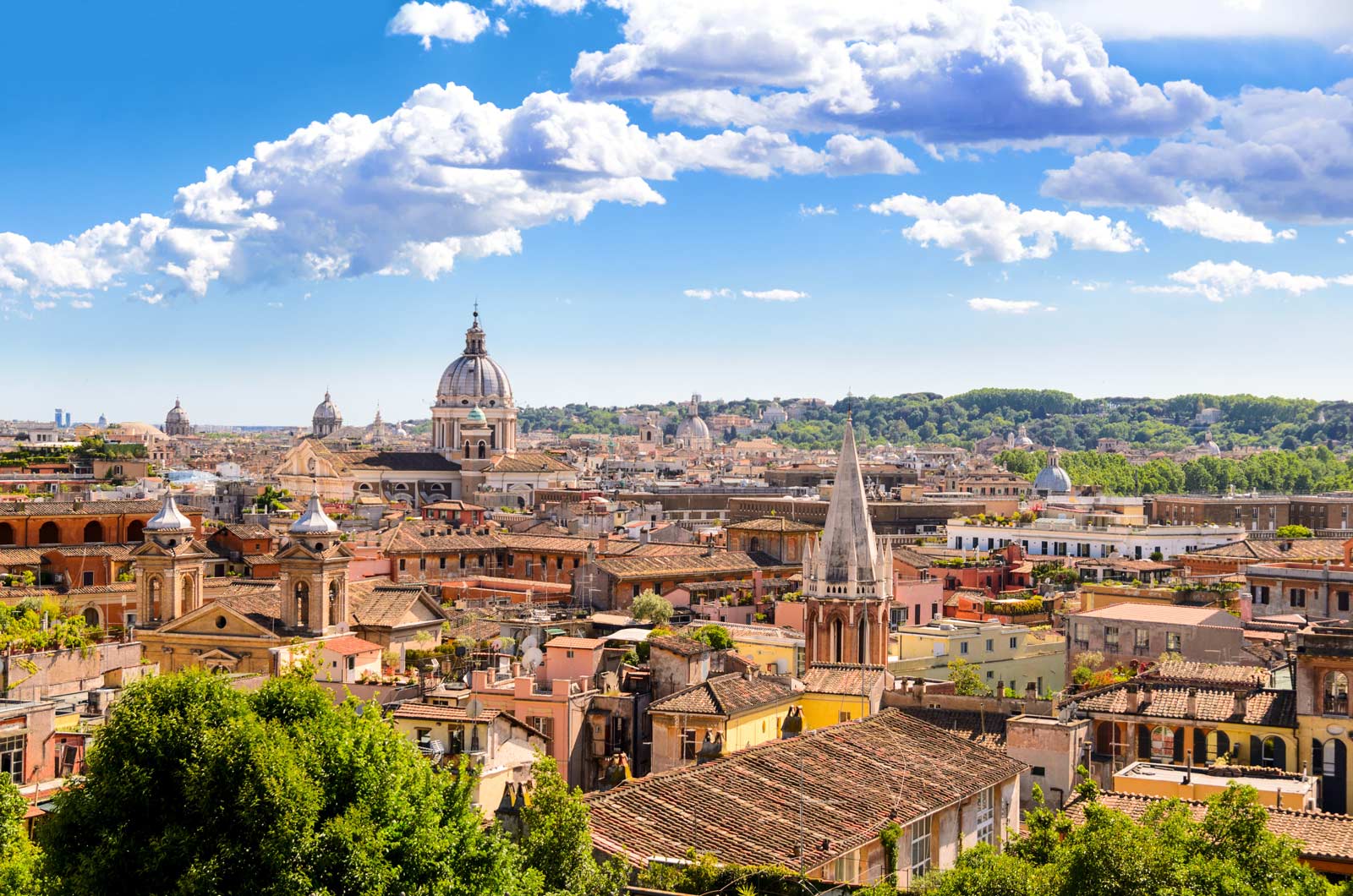
Three days in Rome is just enough time to appreciate the best attractions in the city. We’ll divide this itinerary into one theme per day: Ancient Rome, Modern Rome, and Vatican City. There is a lot to cover, so let’s dive straight in.
Save hassles at the airport by booking an airport transfer. This highly-rated airport transfer starts at $ 80 USD for up to 3 people. A driver will be waiting upon arrival with your name and will take you from Fiumicino Airport or Ciampino Airport to your hotel in the city center in style. Book your transfer or search for other options here.
Day 1 in Rome – Ancient Rome
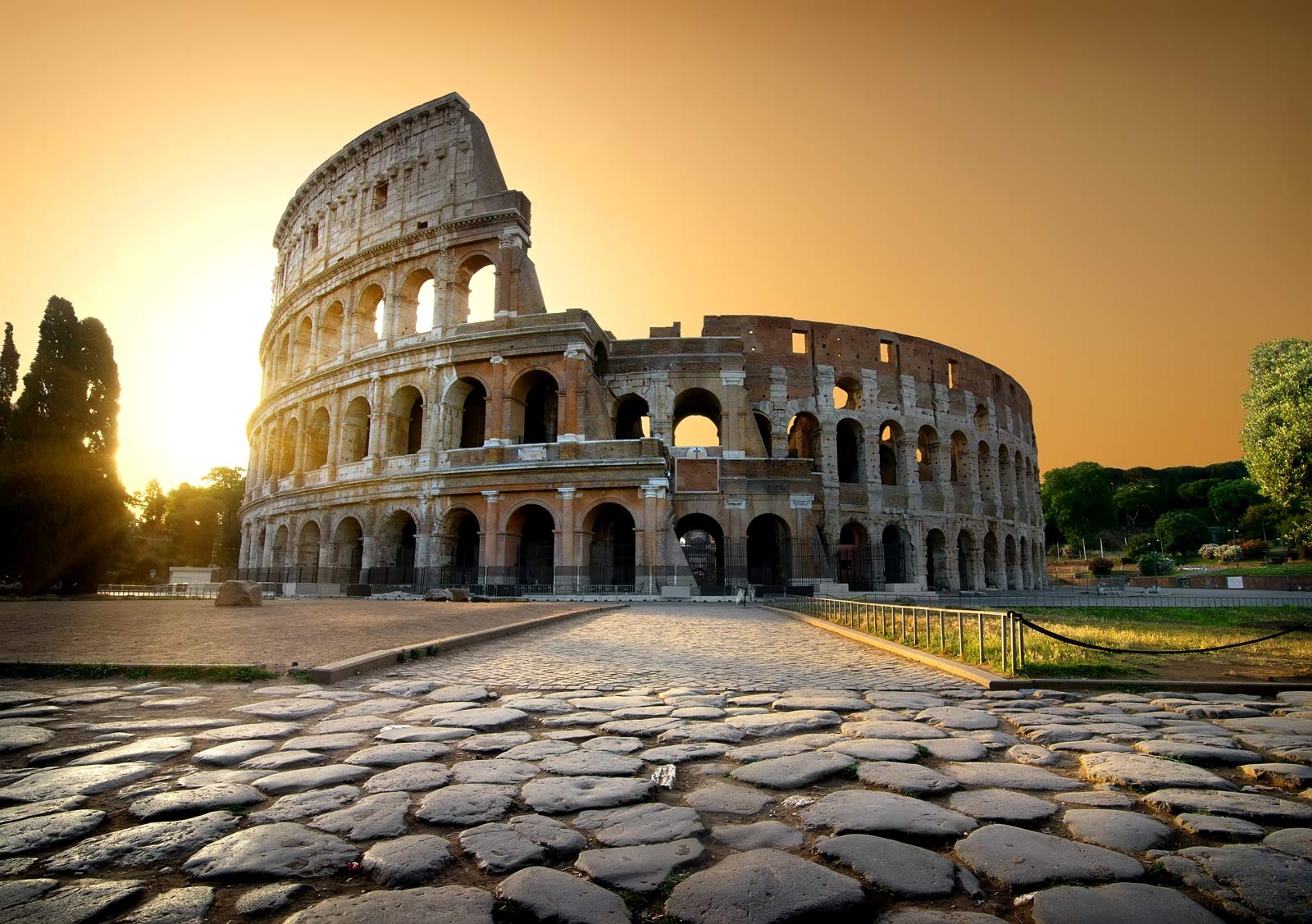
Rome’s historic center is home to plenty of traces of the ancient Romans. Learning about Roman history while exploring Rome is one of the city’s highlights. With this ‘3 days in Rome’ itinerary, your first day will be dedicated to ancient history. This day will be packed with exciting information, from ancient ruins to fascinating stories about the Romans.
Rome’s ancient Roman attractions include a selection of public attractions that offer free entry. In our guide here, you can check out more free (or very cheap) things to do in Rome. There are also major attractions like the Colosseum that are a little more expensive.
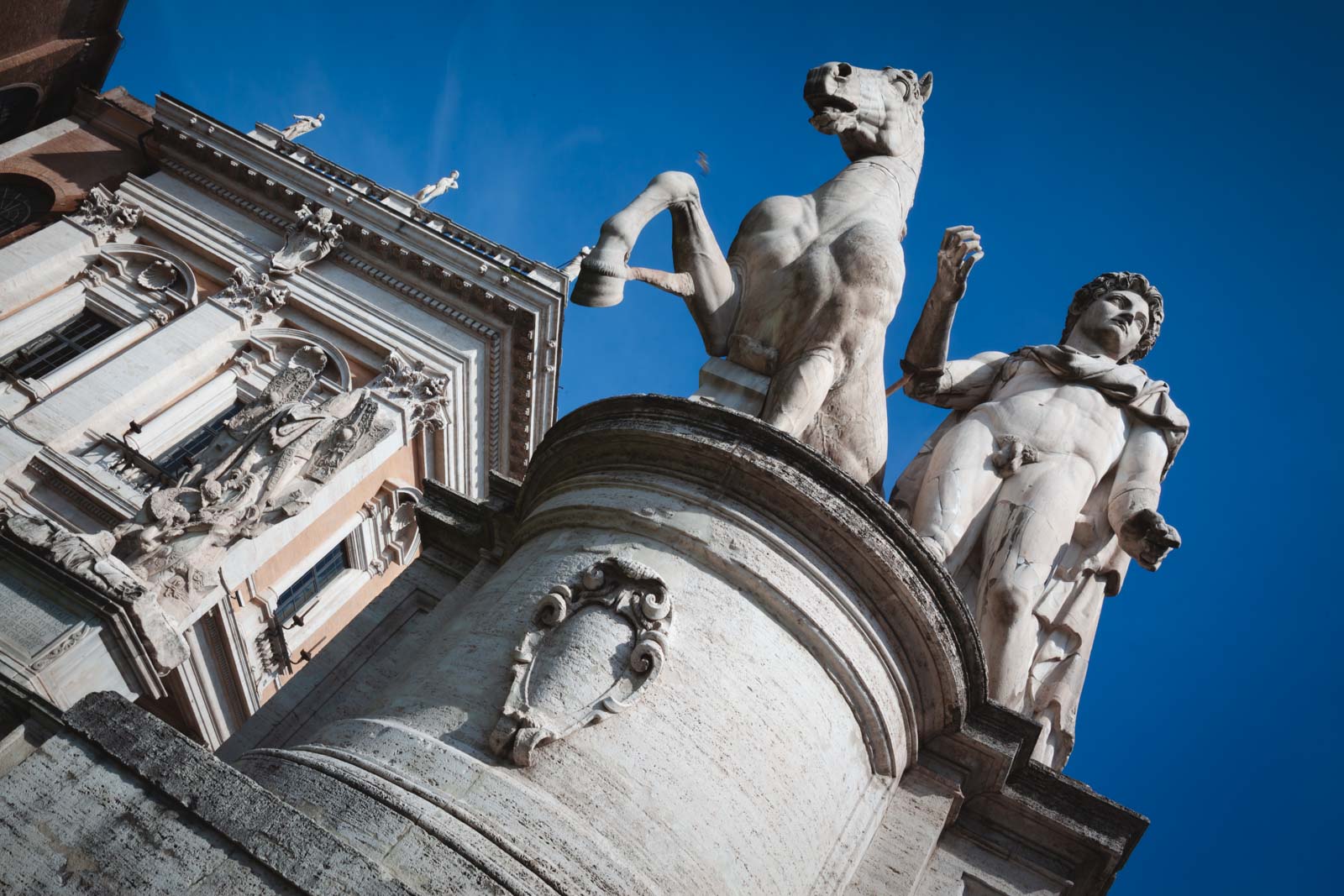
You should budget accordingly for today. It is worth noting that while the attractions might be ancient, it pays to be tech-savvy and book tickets online in advance. You can choose to wait in lines, but it wastes hours – not something you should do when you only have three hours.
A good way to see Rome’s top attractions with ease is to bundle your attractions. The Best of Rome pass is valid for 3 days in Rome and gives access to Rome’s top attractions. Gain access to the Vatican Museums, Colosseum, Roman Forum, and Palatine HillAdmire St. Peter’s Church. It included unlimited public transit on the metro, tram, and bus. Reserved entries at Roman Forum, Palatine Hill, and the Colosseum. Plus an audio guide for St. Peter’s Basilica and reserved entry to the Vatican and Sistine Chapel.
Rome Itinerary Day 1
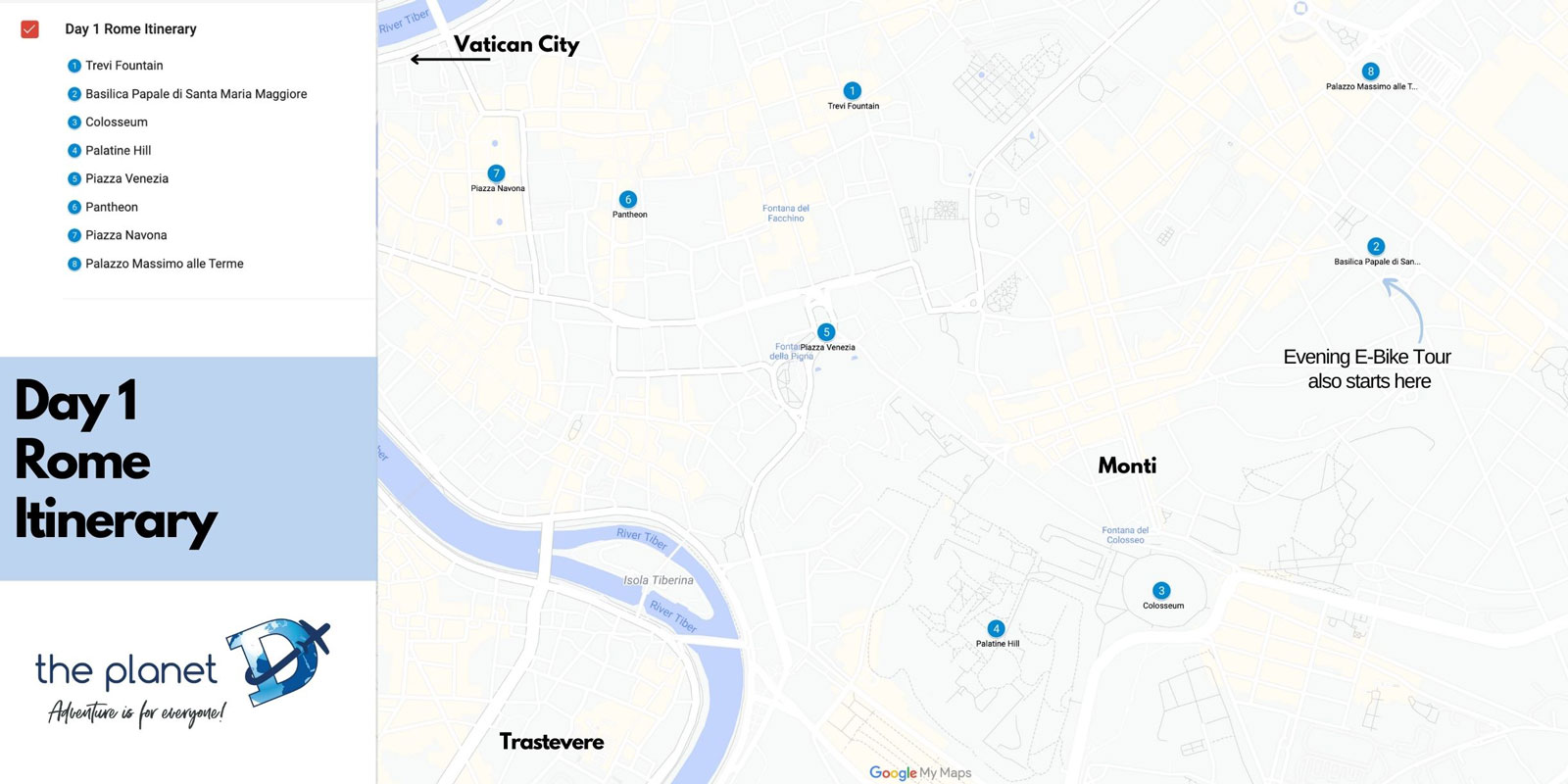
Unless you’d like some photographic inspiration about ‘visiting’ ancient Rome, let’s hit the ground running. Enjoy your first day in Rome.
Morning: Trevi Fountain
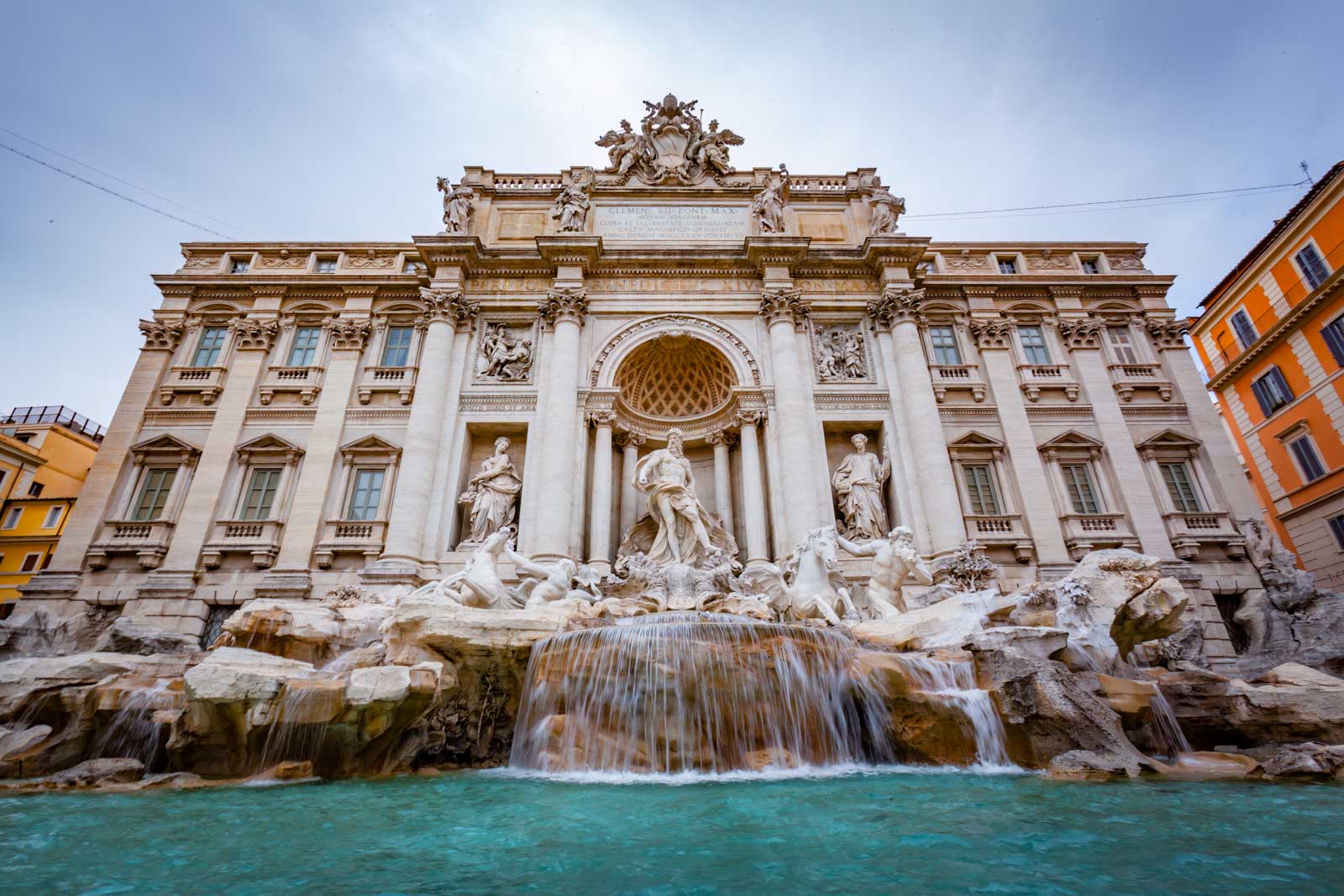
- Opening Times: 24 hours a day
- Cost: Free
- Suggested Tour: Fountain and Underground Tour where you’ll visit the Trevi Fountain and go 9 meters (30 feet) underground to see the ruins of the ancient aqueduct.
The Trevi Fountain is set in the Piazza di Trevi and is easily the most famed fountain in Rome. While built in the 18th century, the Baroque feature is built on the terminal of the Acqua Vergine – an aqueduct initially developed in 19 BC by Marcus Vipsanius Agrippa. The fountain also depicts ancient Roman gods, with the god of water, Oceanus, and Abundance and Salubrity.
It is a beautiful piece of architecture and has some real historical significance. You will have seen pictures of the fountain before, and its white statues and milk-blue waters adorn the front of many postcards.
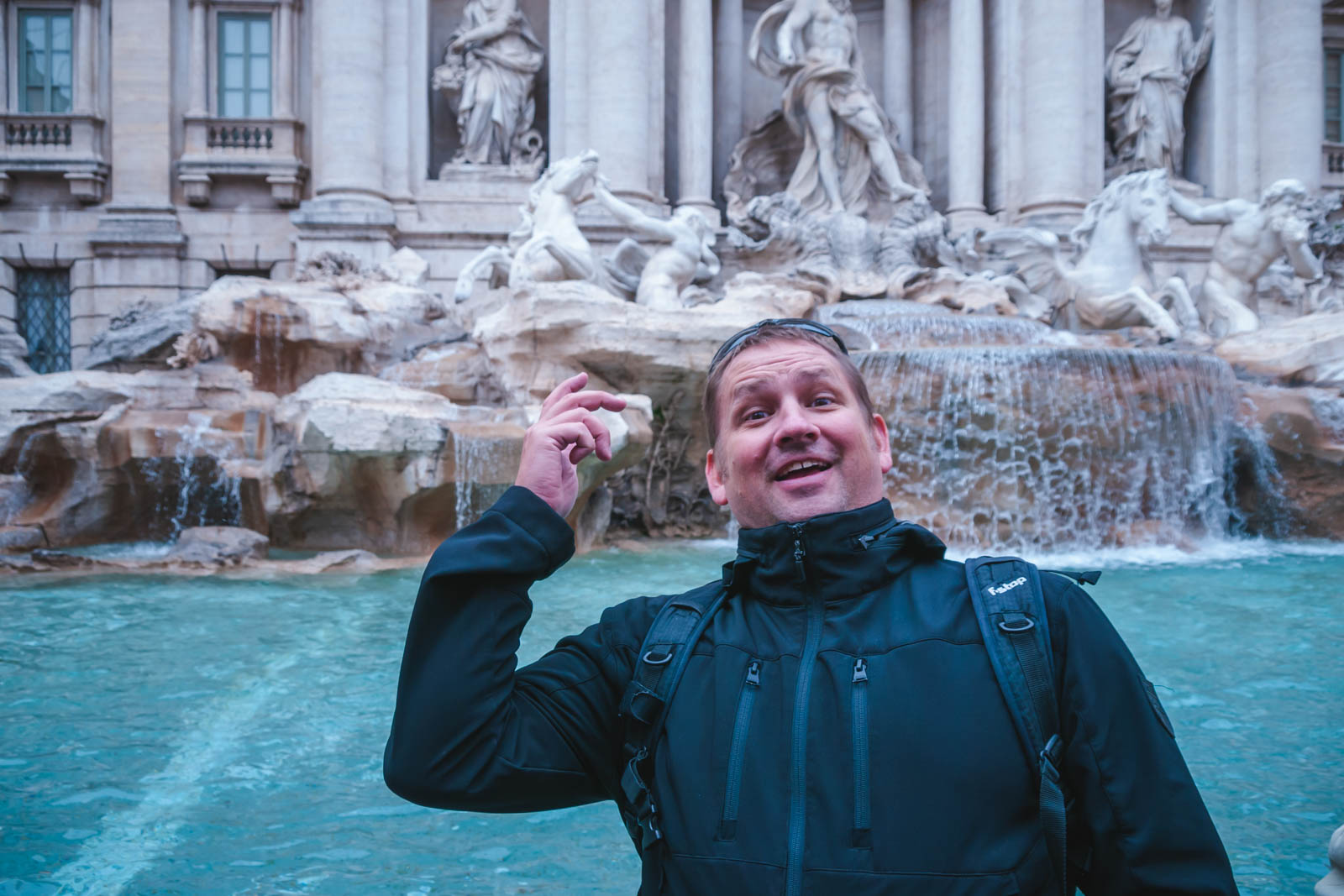
The Trevi Fountain is easily a must-visit for your Rome itinerary. But why visit first thing in the morning? In a word, crowds. The Trevi Fountain is so crowded by midday that you’ll be lucky to even get close enough to throw in a lucky coin. The earlier you can get here, the better. Aim to get here before 8 am, and perhaps treat yourself to a takeout coffee on your way here.
Basilica de Santa Maria Maggiora
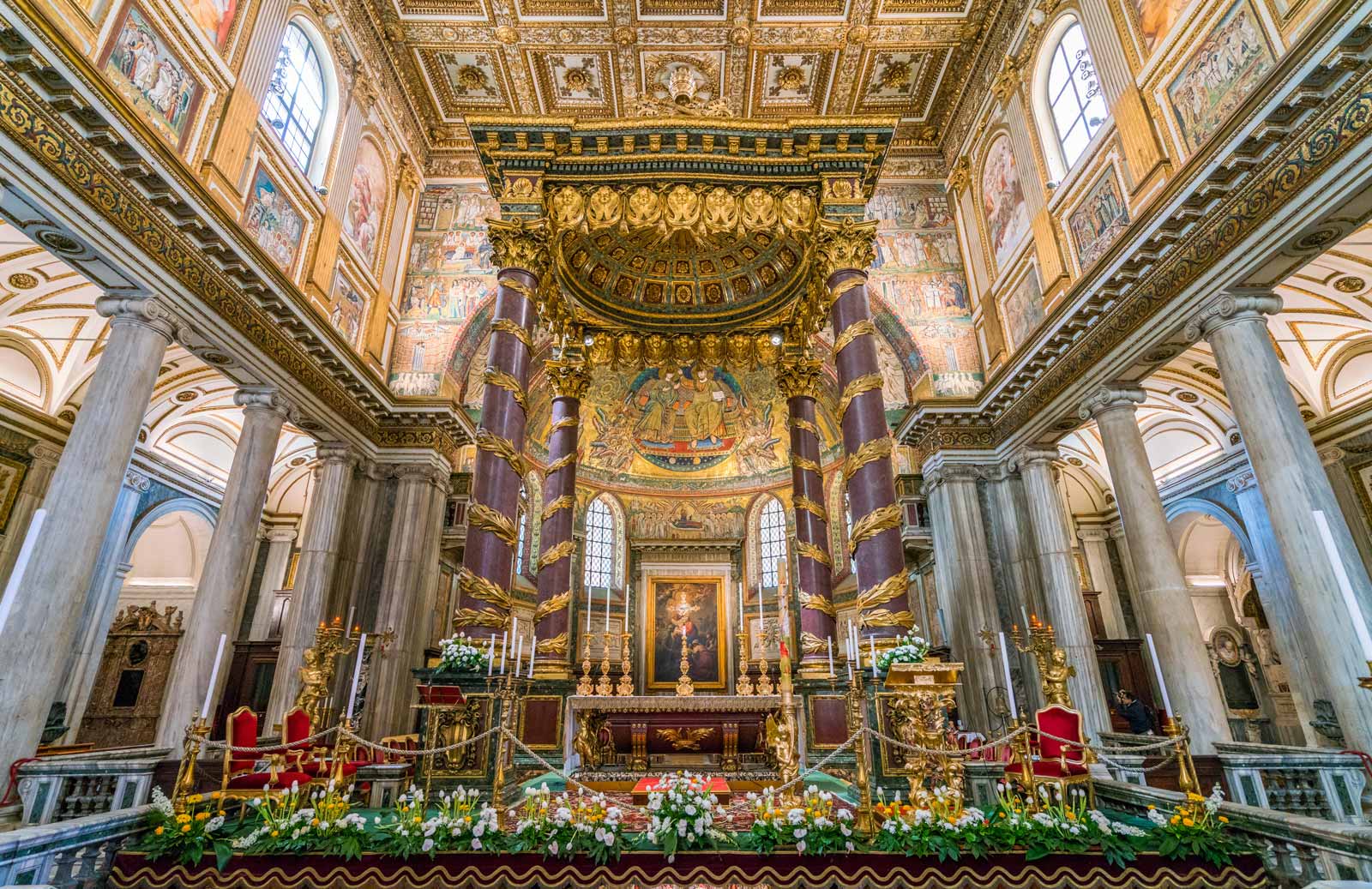
- 21-minute walk from Trevi Fountain
- Opening Times: 7 am – 6:45 pm
- Cost: Free
- Suggested Tour: This 1-hour Guided tour takes you through one of Rome’s four patriarchal basilicas with an expert guide.
Basilica de Santa Maria Maggiora is one of Rome’s prettiest Catholic churches. It is the city’s first church dedicated to the Virgin Mary. It is widely agreed to come second only to St Peter’s Basilica (more on that later). The exterior is a picture of extravagance.
Inside, you’ll find mosaics and marble features with gold decorations built from the first gold that Columbus ever shipped back from America. If you are interested in architecture, religious history, or Catholicism specifically, the Basilica de Santa Maria Maggiora is a fascinating spot. It also has an adjoining museum.
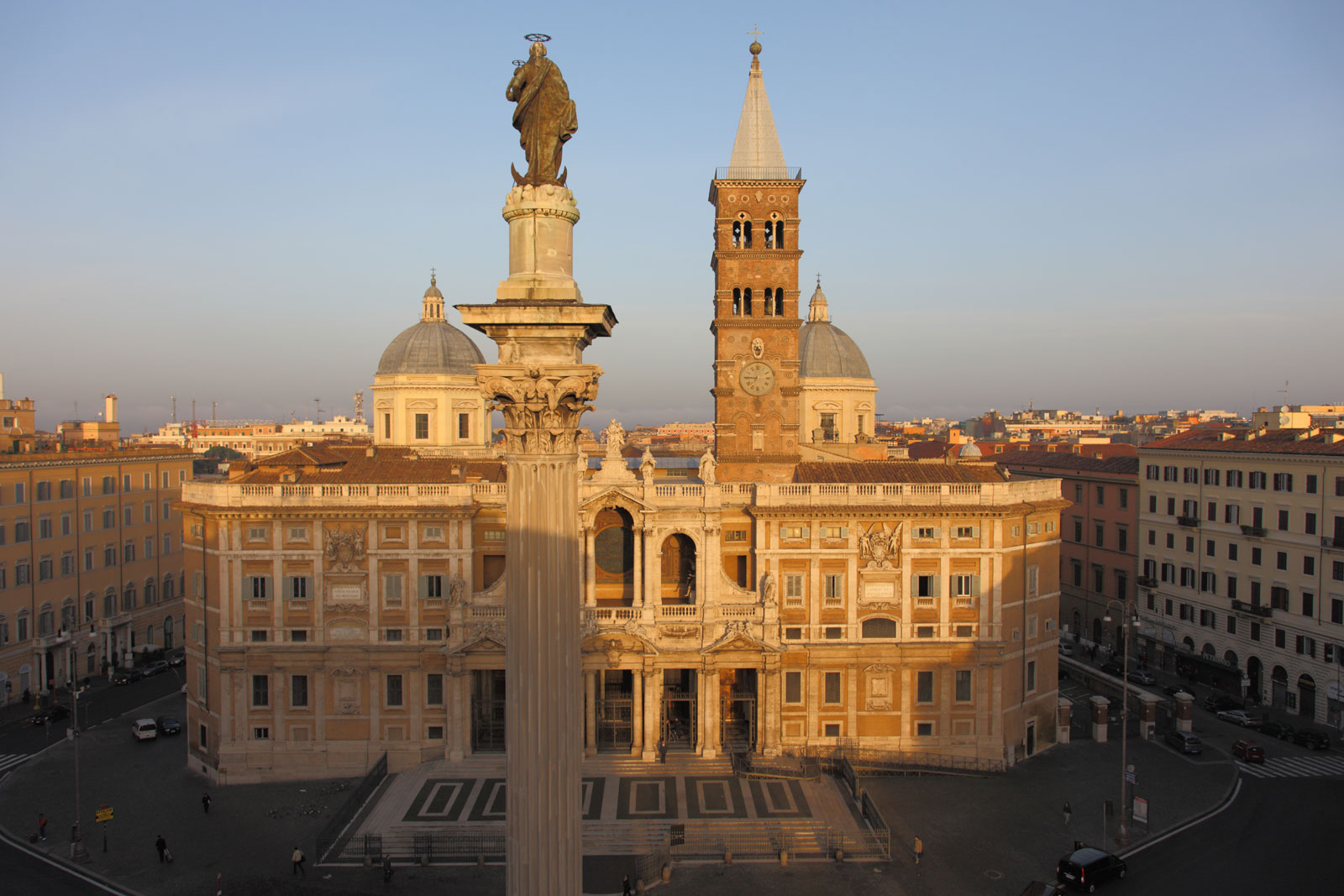
The Basilica de Santa Maria Maggiora is free to enter and is a great budget-friendly addition to your ‘three days in Rome itinerary’. It should be nice and quiet first thing in the morning, although be mindful of service times and ensure that you are covered up and respect protocols. It is still a functioning church. For an extra special experience, you can attend a service if you wish.
Colosseum and Roman Forum
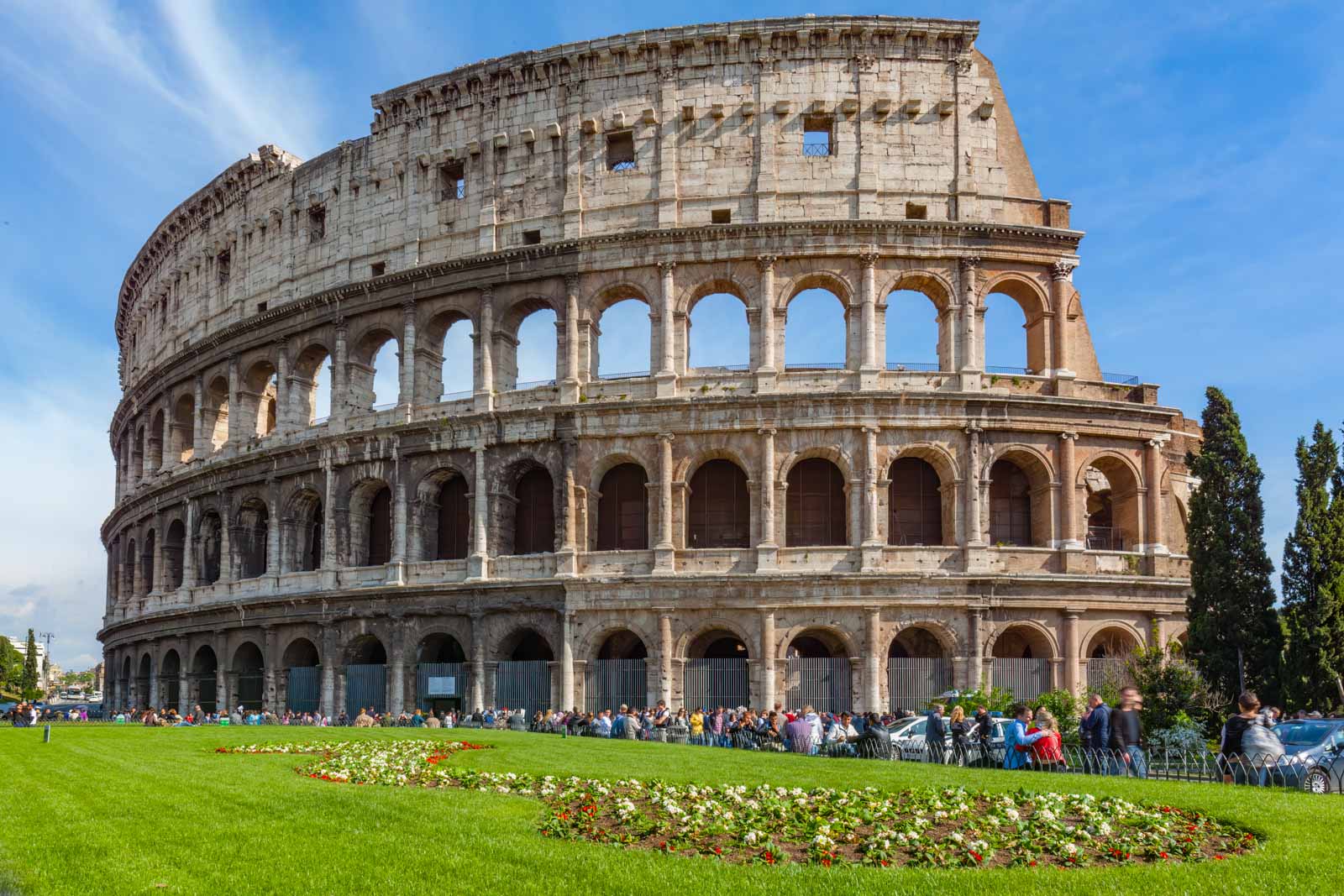
- A 17-minute walk from Basilica de Santa Maria Maggiora
- Opening Times: 9 am – 4:30 pm
- Cost: $15+
- Suggested Tour: Colosseum, Forum and Palatine Hill tour – Skip the line and follow your expert guide to the first and second levels of the Colosseum and see the Arch of Titus at the Roman Forum where Julius Caesar was buried. You’ll also see the triumphal Arch of Constantine and learn about the history of Romes most famous monuments.
Where better to explore the remnants of ancient Rome than at the most famed landmark of the Roman Empire – the Colosseum? The Colosseum is a massive oval amphitheater once used as a venue for brutal gladiator fighting and blood sports.
It is in excellent condition, considering it is nearly 2,000 years old and has lived through earthquakes and other damaging events. The Colosseum is the world’s largest amphitheater. You can easily spend a couple of hours wandering around the different levels. The Colosseum will be the longest time you spend at an attraction today.
The best Colosseum tickets give you fast-track entry to avoid the long lines. Skip these lines because you’ll be stood there for hours – not fun in the midday heat and when you have a short, three-day Rome itinerary. Book tickets to enter the Colosseum in advance and make sure they let you skip the line.
Palatine Hill
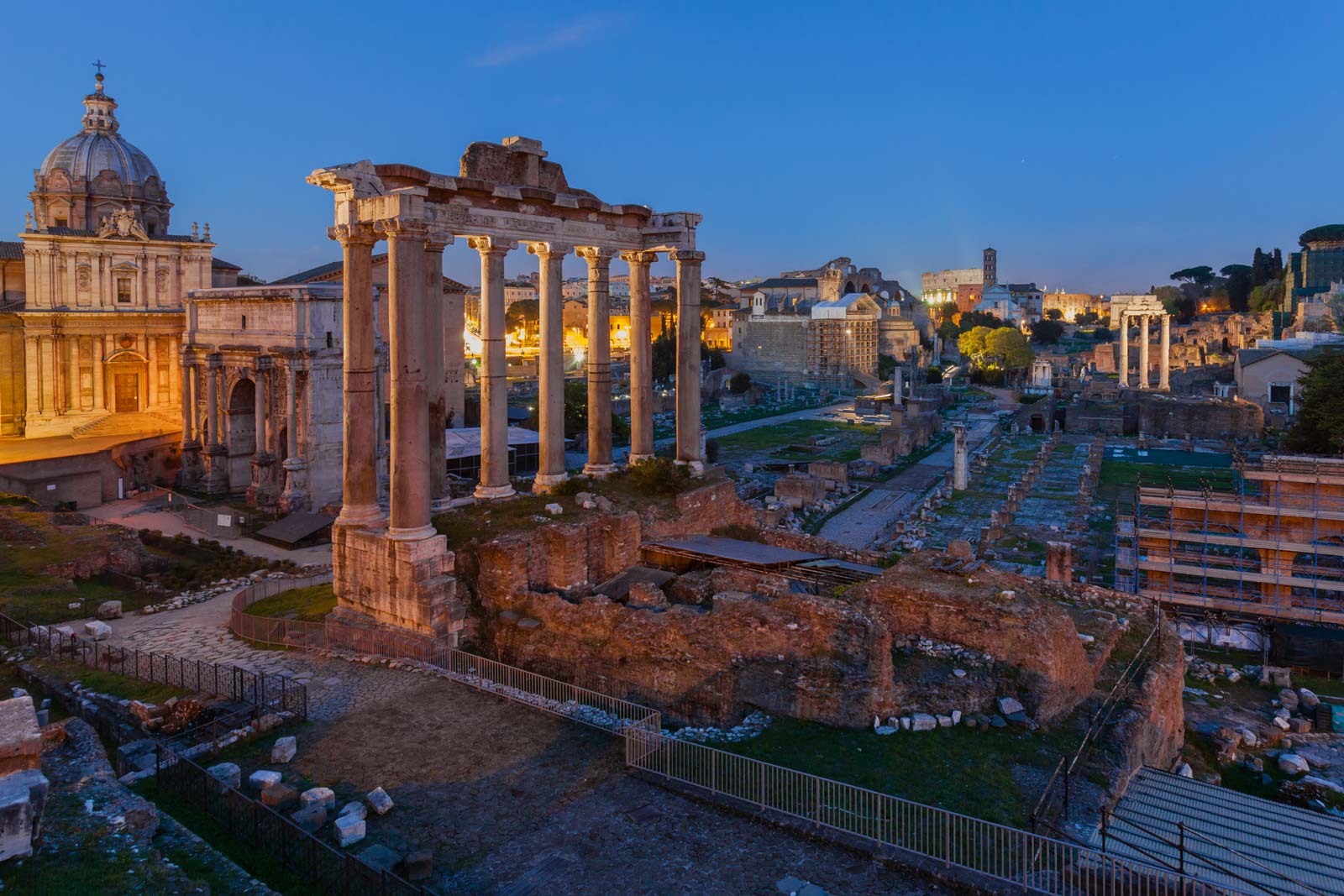
Once you’ve explored the Colosseum, head just a minute away to Palatine Hill, where you’ll find the Roman Forum ruins. Once home to crucial government buildings, the rectangular Roman Forum is now known for its photogenic ruins.
Take your time to wander the columns and remains of ancient structures at ease. The forum was one of the most important places in Rome, and apart from government buildings, it was where public speeches and criminal trials were carried out.
Allow around an hour to enjoy the Roman Forum and book online to avoid queuing for a ridiculous amount of time. Some tours, like the one we’ve linked, sell Colosseum and Roman Forum tickets together, which is convenient.
Recommended Tour: This Express Tour offers skip-the-line access to the Colosseum with a guide. You will then have access to the Roman Forum and Palatine Hill to explore at your own pace. Optional upgrade to include an arena tour.
Piazza Venezia
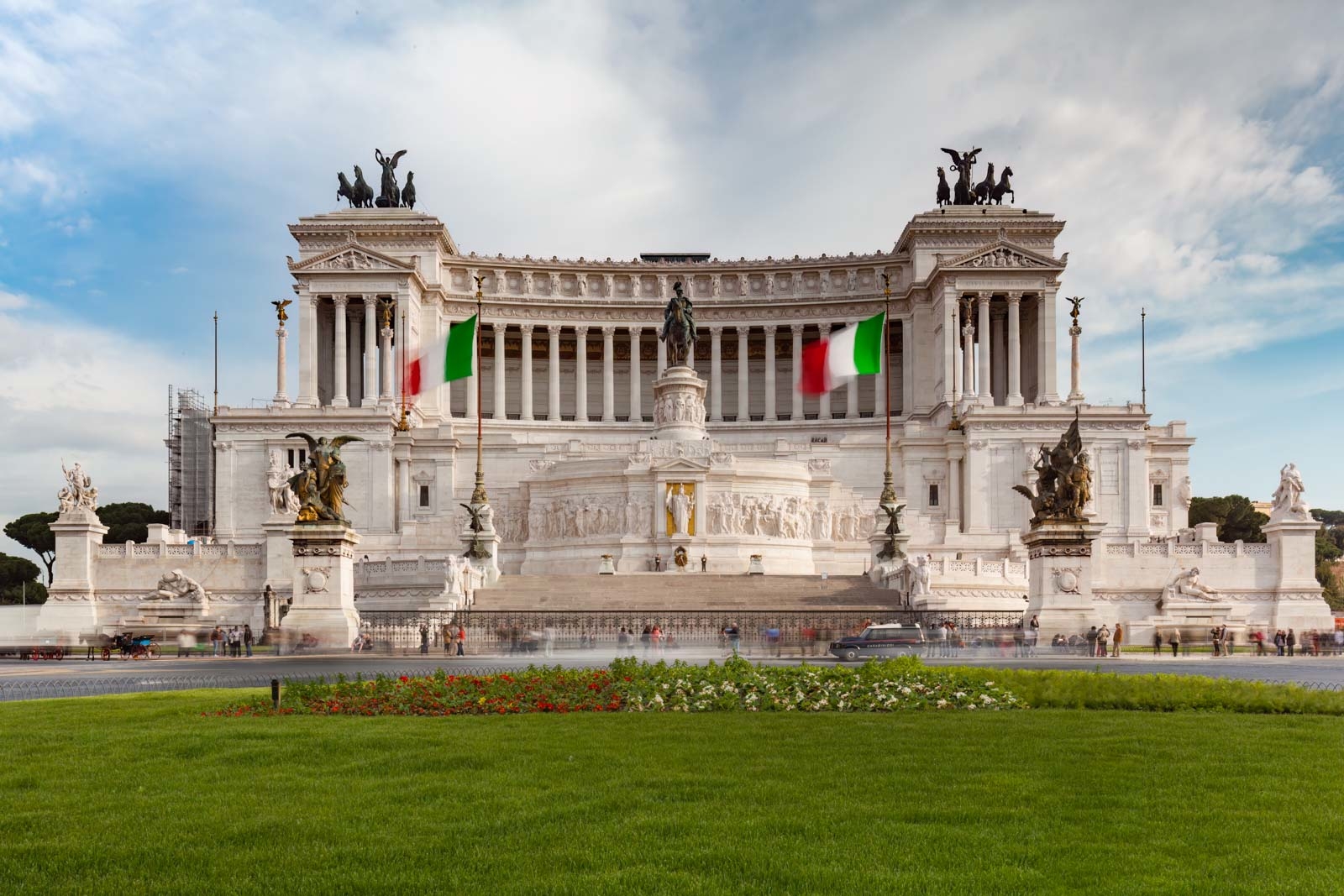
- A 12-minute walk from Basilica de Santa Maria Maggiora
- Opening Times: 24 hours a day
- Cost: Free and Can be Visited Independently.
- Suggested Tour: Vespa Tour – We loved our Vespa Tour that gave us all the highlights of the Eternal City. Feel like a local on a Vespa with the safety of a local guide and driver as you relax in a sidecar. It takes you to all the top attractions and important sights. Plus, you’ll enjoy a taste of fresh coffee and gelato.
The Piazza Venezia might not be an attraction related to ancient Rome. Still, it is so en route that you should definitely check it out. With just 3 days in Rome, what have you got to lose? The piazza is a grand town square with plenty of wow factor and features Italy’s ‘Tomb of the Unknown Soldier’ and a monument to the country’s first king. It is a whistle-stop attraction and perfect for squeezing in along your way to your next significant sightseeing opportunity.
Piazza Venezia is also an excellent spot to detour from for lunch; by now, we bet you’ve worked up an appetite. You can stop by one of the little restaurants dotted around the piazza (around a five-minute walk in most cases). Alternatively, pick one of the attractions surrounding the piazza as an extra stop-off – for example, Palazzo Bonaparte, which was once home to Napoleon’s mother.
Afternoon: Pantheon
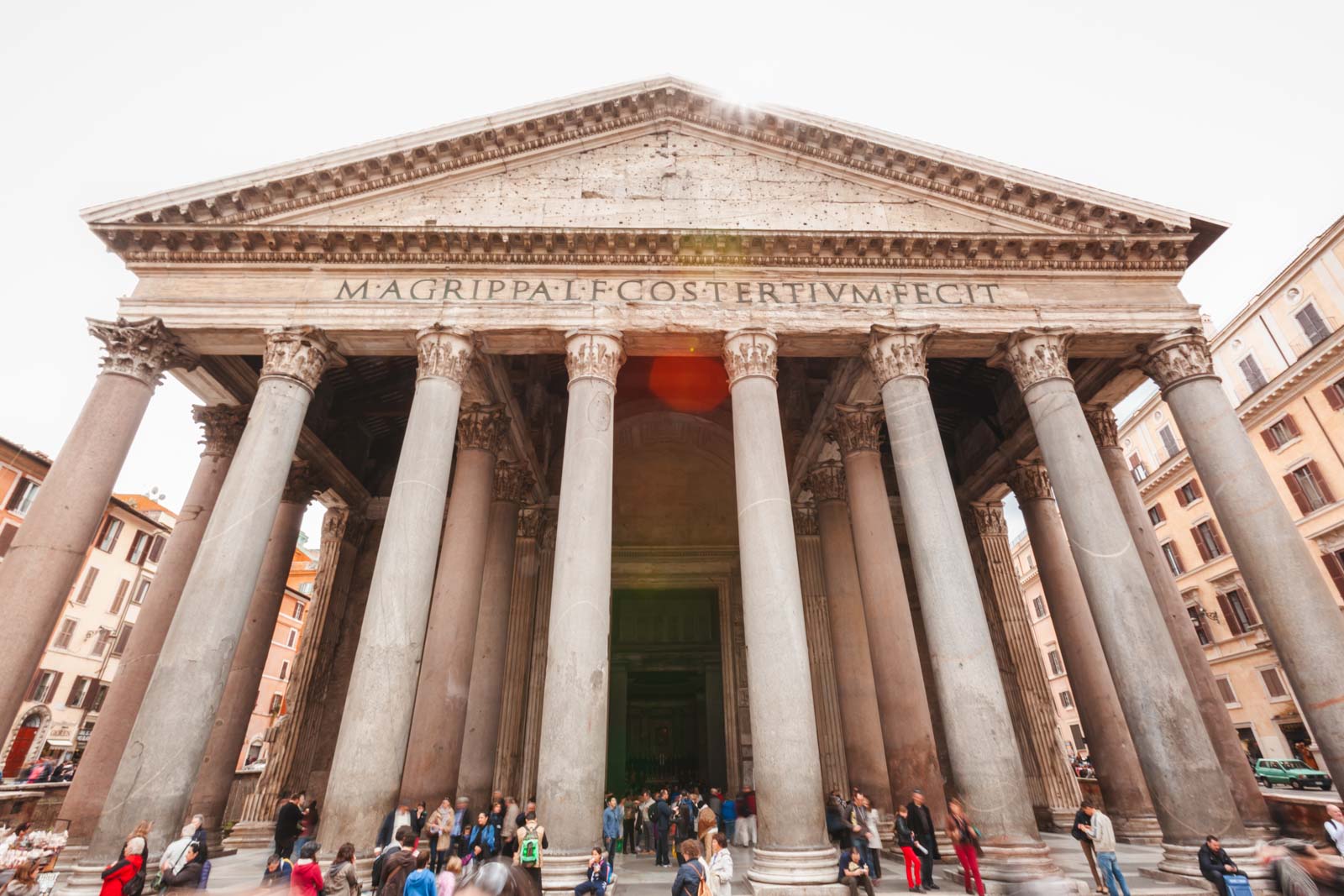
- 11-minute walk from Piazza Venezia
- Opening Times: 9 am to 6:45 pm
- Cost: Free
- Suggested Tour: Pantheon Audio Guide Tour lets you enjoy the Pantheon at your own pace following your audio guide that you collect from the desk to learn about 15 points of interest inside the basilica.
The Pantheon is another world-famous addition to Rome’s historic center built between 25 and 27 B.C. Once a Roman temple, the Pantheon was formally changed into a Catholic church in 609 AD and then a mausoleum. The Pantheon is one of the best-preserved monuments from Ancient Rome.
The classic pillared structure is an iconic building. Since it is free to enter and usually without long lines – why not pay it a visit? Reservations are only required on weekends and special dates. When you go inside, you’ll get a better look at the dome (nicknamed the Basilica of Santa Maria), which acts as a giant sundial.
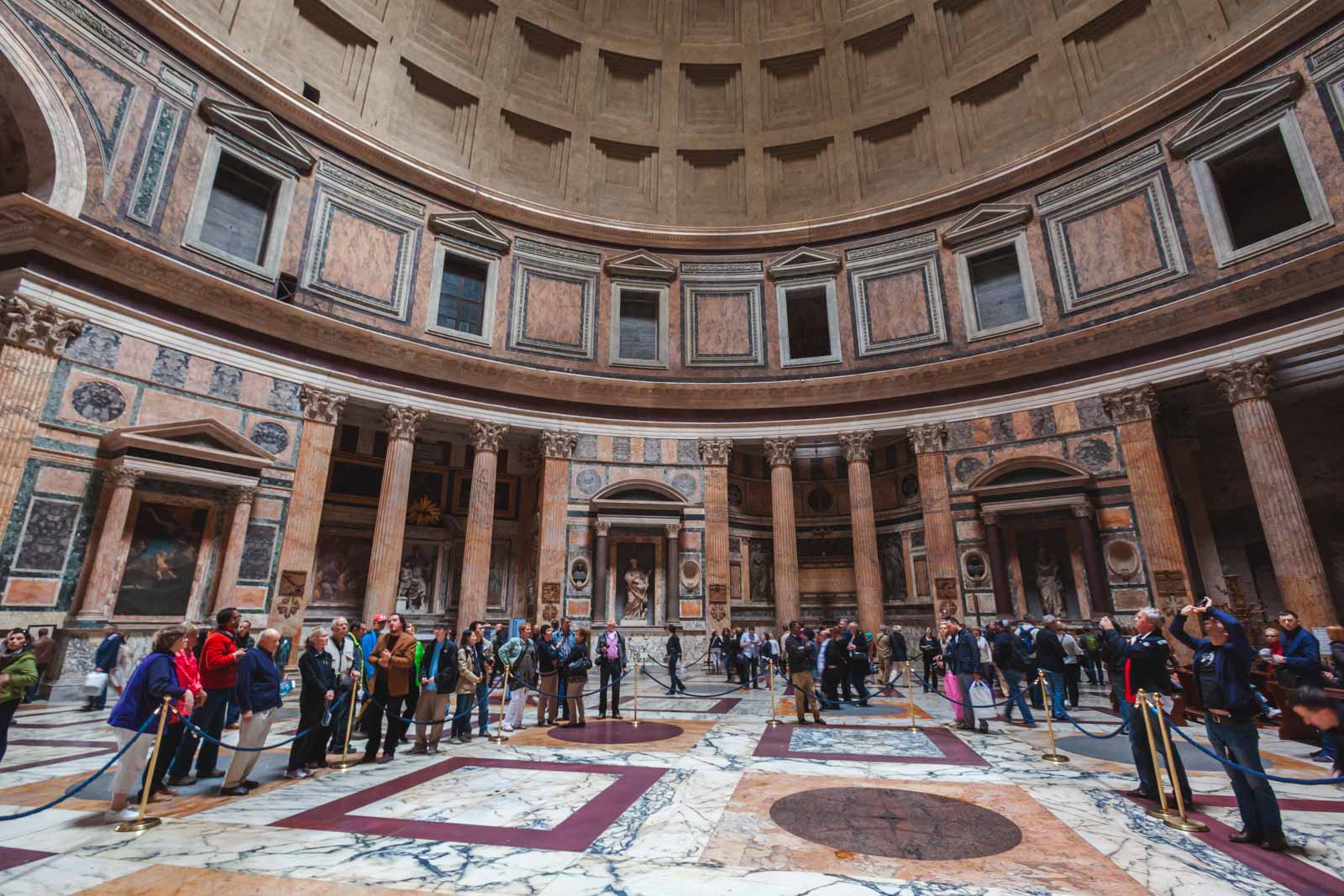
It is within easy walking distance of Piazza Venezia. While it is free to enter, those wanting a little extra insight can book an audio-guided tour. The Pantheon is one of those buildings you just have to tick off. Plus, you only need half an hour or so to enjoy it. It is a great addition as you are getting tired at the end of a long day, and it is en route if you want to take a quick peek at the outside and then move on.
Optional detour: Largo di Torre Argentina
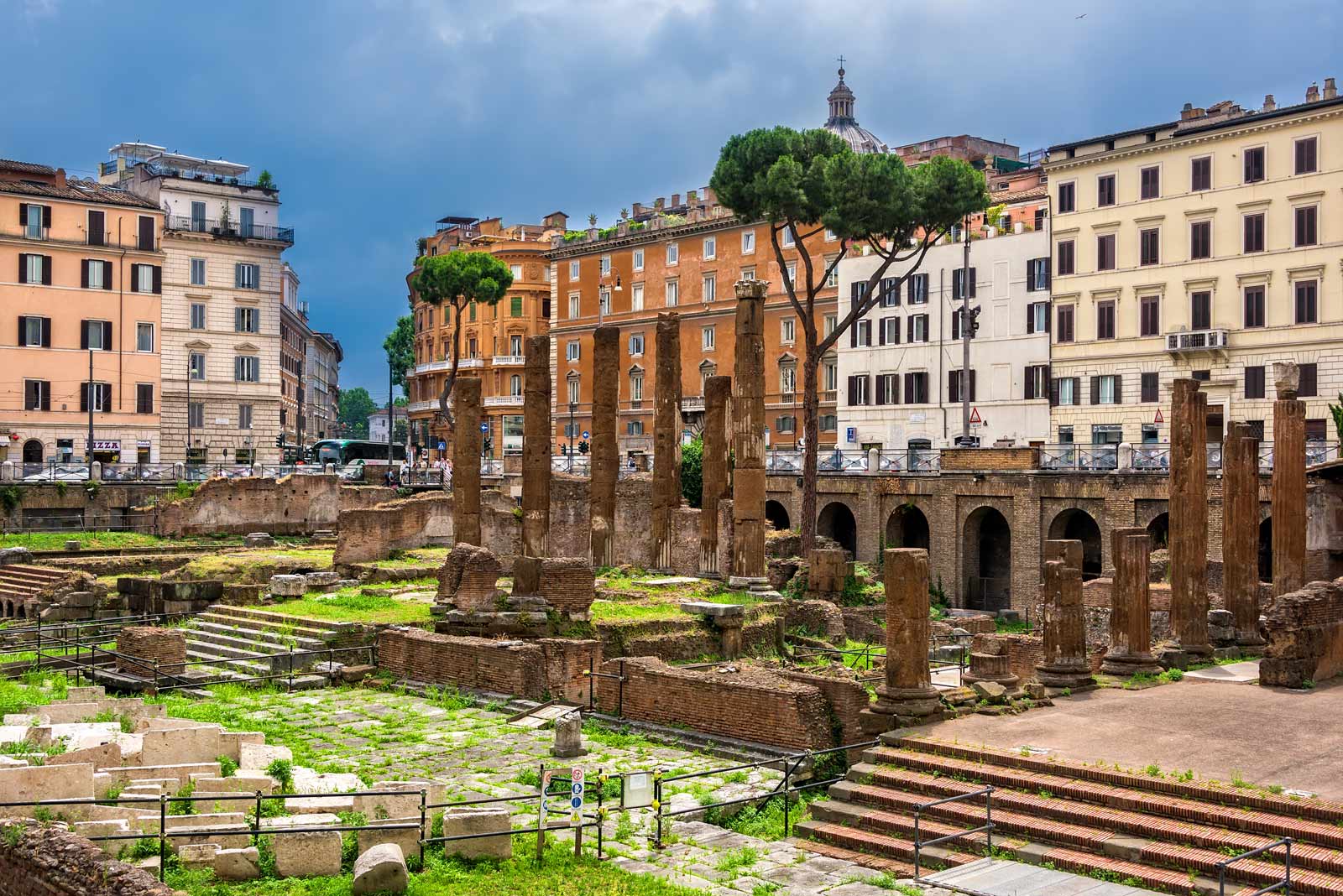
- 6 minutes walk from the Pantheon
- Opening Times: 24 hours a day
- Cost: Free
- Suggested Tour: Visit independently
Largo di Torre Argentina is the harrowed spot where Julius Caesar was murdered by senators and traitors. You can visit the archaeological ruins and pet the bizarre amount of cats that have moved into the area. Totally free, it is a perfect budget-friendly addition to your itinerary and only requires 20 minutes or so.
Piazza Navona
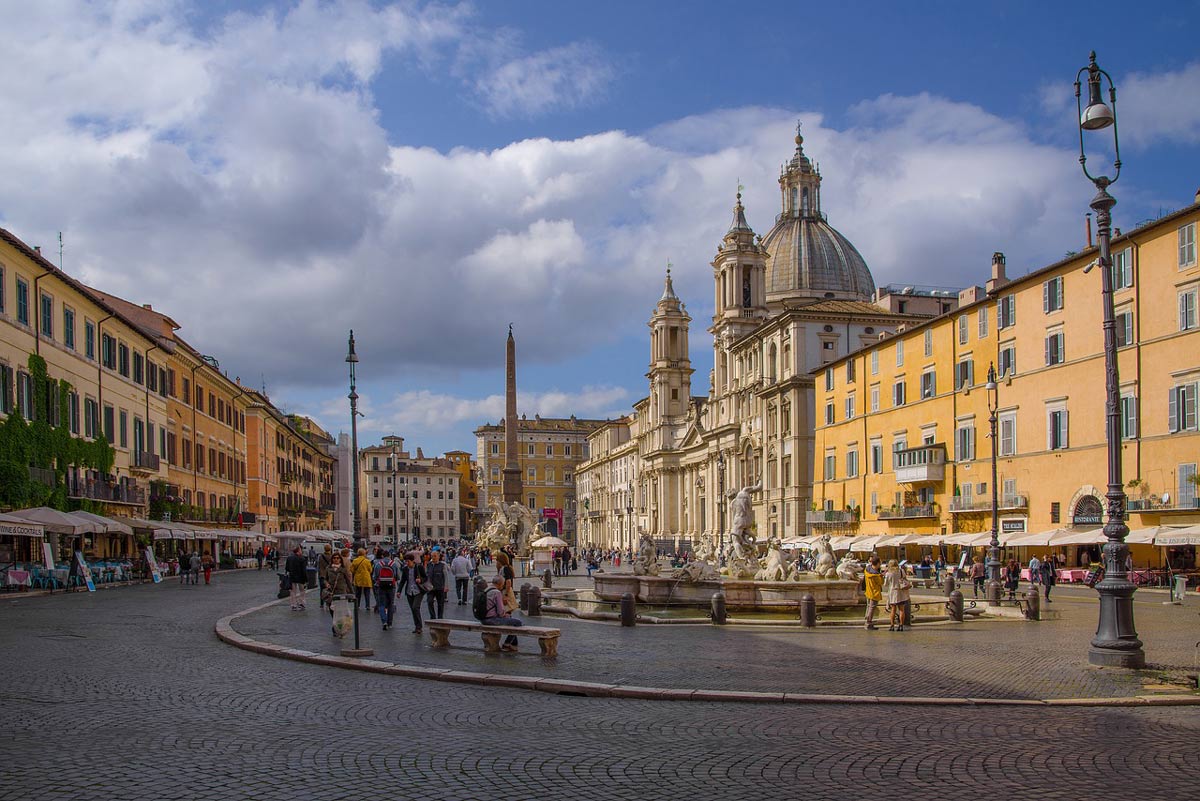
- 4 minute’s walk from the Pantheon
- Opening Times: 24 hours a day
- Cost: Free
- Suggested Tour: Piazza Navona Underground Tour is an audio guide tour that takes you 5 meters (15 feet) underground to explore the ruins of the Stadium of Domitian and learn about Roman sports where you’ll see artifacts from the ancient Roman Empire.
Speaking of easy additions, Piazza Navona is one of the most famed squares in Rome and is built on the former site of the Stadium of Domitian. The stadium dates back to 1 AD and held athletics competitions for ancient Roman spectators.
While technically, the square belongs to the Baroque period, the ancient history links to both the former site and the fountains. It is a really atmospheric place to experience Rome and will be jam-packed at this time.
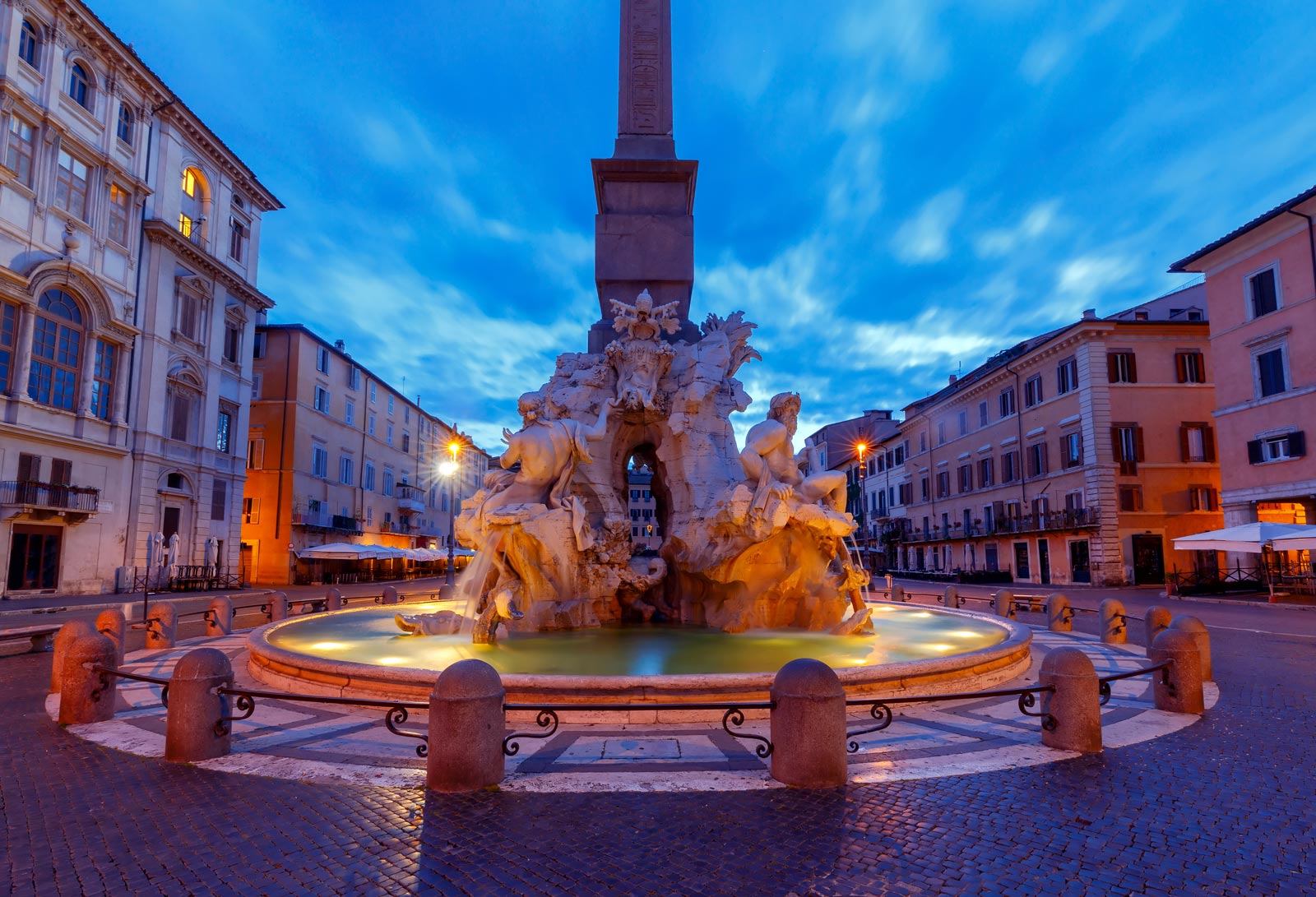
The piazza is free to visit and only takes a minute or two to appreciate if you have done enough sightseeing today. It is on the route to your final destination and is an excellent spot to sit and catch your breath. Or, if you want to splash out and spend a little longer at Piazza Navona, book the underground tour linked above.
Museo Nationale Romano, Palazzo Altemps
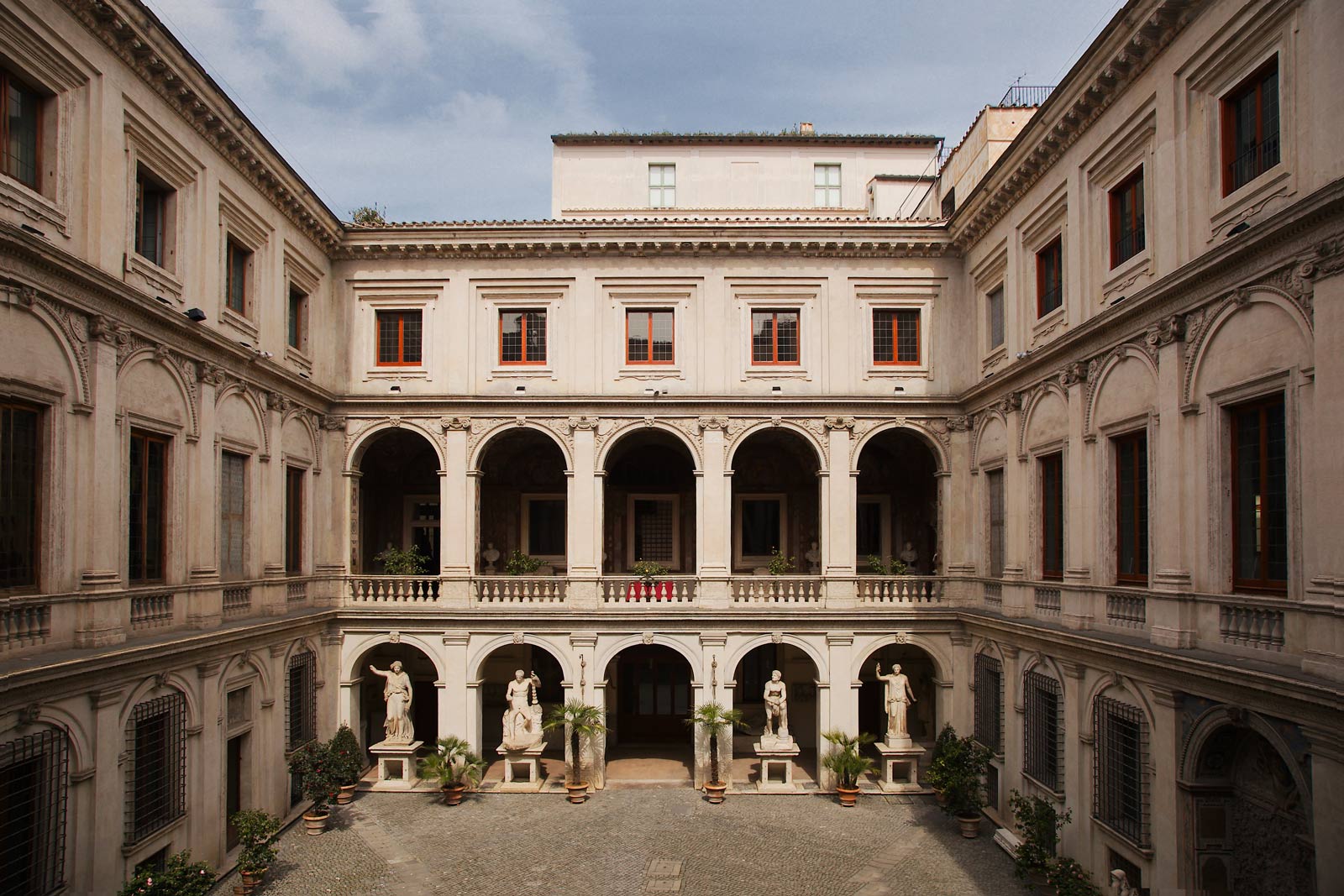
- 2 minute walk from Piazza Navona
- Opening Times: 11 am – 6 pm
- Cost: $10+
- Suggested Tour: Visit independently
Your final destination is just a short walk from Piazza Navona. Museo Nationale Romano, Palazzo Altemps is home to historical artifacts galore – from Renaissance artwork to ancient Greek and Roman sculptures.
The museum has stunning architecture and plenty of shaded marbled walkways that are perfect for browsing sculptures and cooling off after your walks in the sun. The building is a 15th-century palace worth a visit in its own right. However, the collection of artifacts really is astounding, and since it is classed as more of a ‘hidden gem’ in Rome, you shouldn’t find it too crowded.
Entrance tickets can be booked online or on arrival. You visit independently and explore the museum grounds on a self-guided basis. It is the perfect place for art enthusiasts or even those just wanting a more creative (or cooler place with AC) spot to finish their first day.
Evening E-Bike Tour with Food and Wine
If you want to see highlights of Rome while dining, book an ebiking tour with food and wine tastings. This is a great way to see the sights like the Trevi Fountain and Pantheon while enjoying cheese and wine. The adventure begins at the Basilica of Santa Maria Maggiore where you’ll follow your guide through the city including the streets of Monti and admire the Fori Imperiali. You’ll see the famous squares of Rome and climb up the Campidoglio. More details here.
Day 2 in Rome: Modern Rome
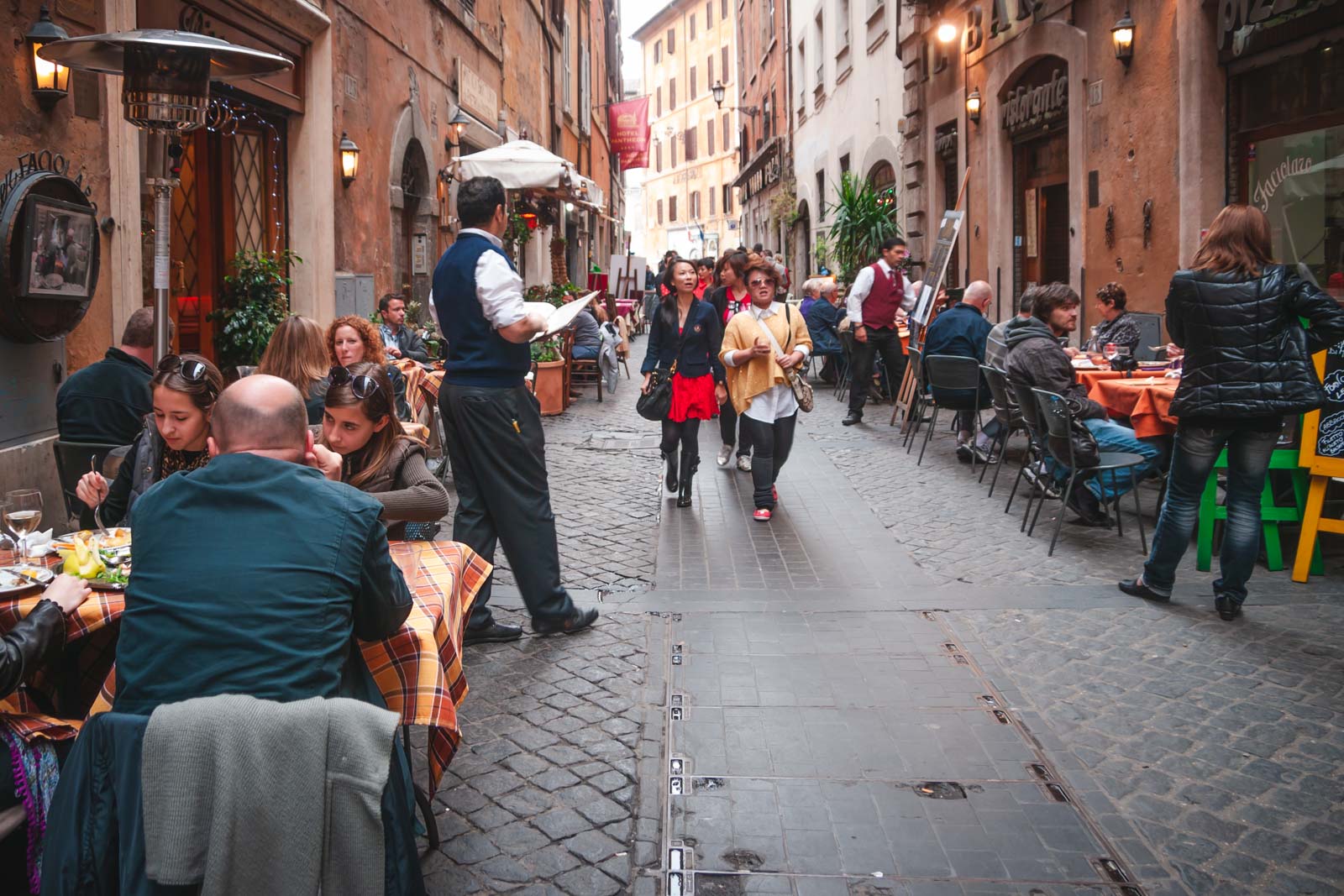
Day 2 of our 3 days in Rome itinerary is dedicated to a more modern side of Rome. This is a day to indulge in all things food and shopping – taking advantage of that Italian indulgence and class. Whether you window shop at designer Italian shops or take a food tour, you’ll get a taste of modern living in Rome and a strong sense of Italian pride and identity. Besides, you can’t visit Rome and not dedicate a decent portion of your time to tasting its delicious dishes.
If you are visiting Rome on a budget, just stick to window shopping rather than buying. We’ll direct you to a classic shopping district that is just as exciting for general visitors as it is for shoppers. Similarly, a food tour is more budget-friendly than a cooking class. If you want to splash out, you could swap the food tour for a more expensive cooking experience. Both of these options sell out fast, so book well in advance.
Rome Itinerary Day 2
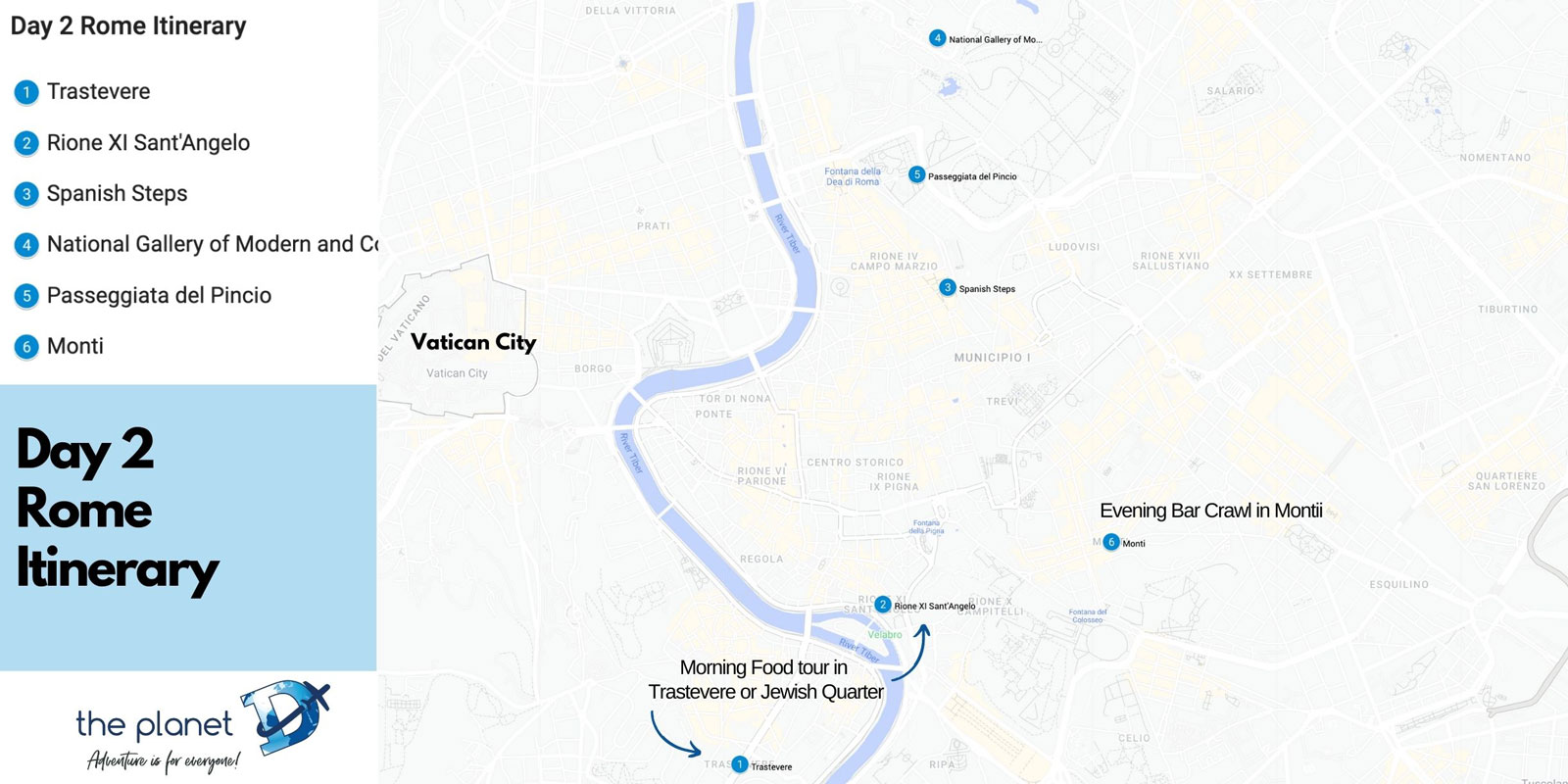
Feeling prepared to tackle modern Rome? Good, because Rome waits for nobody. From street food to the Spanish Steps, day two, here we go.
Morning Food Tour
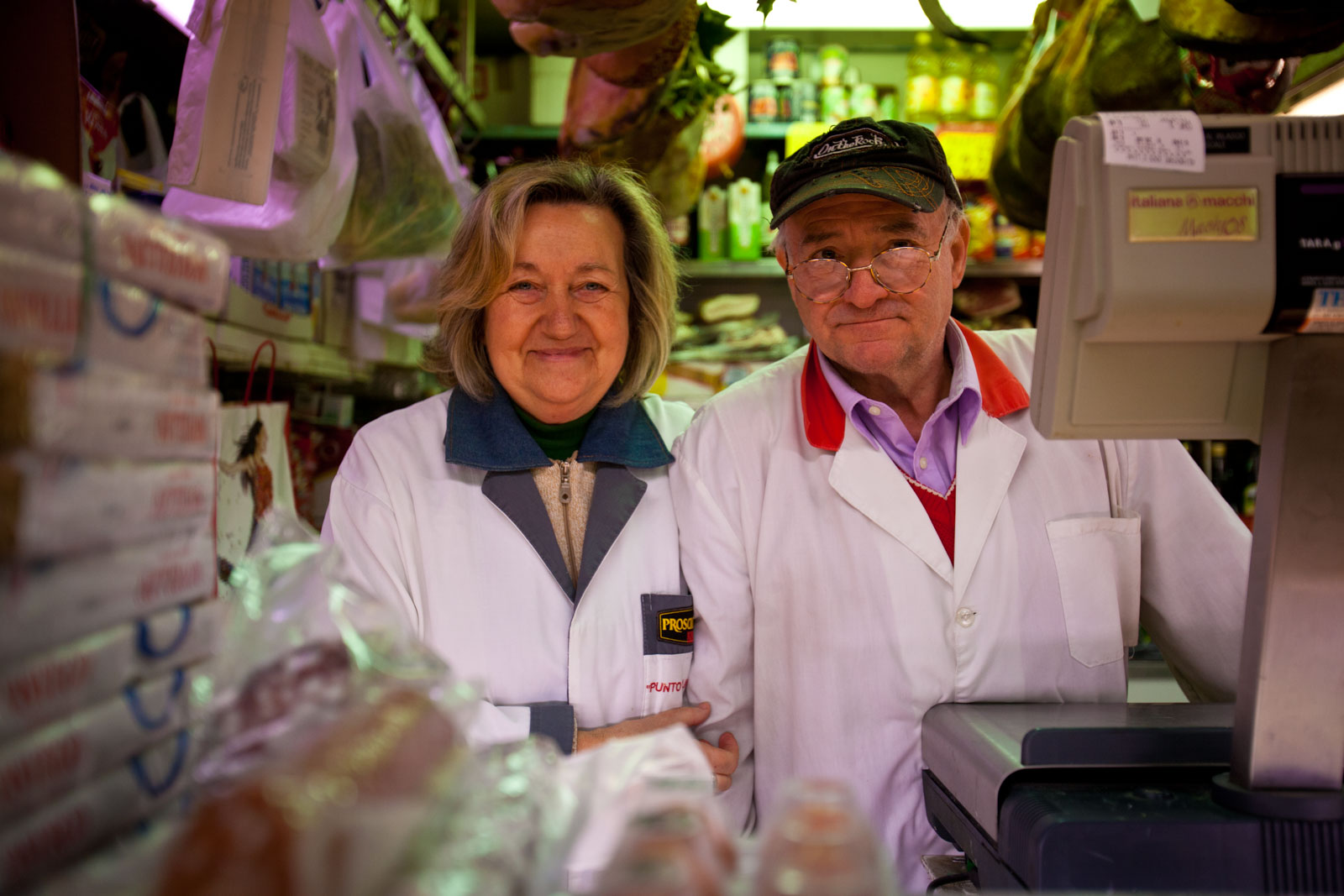
- Opening Times: N/A
- Cost: $45
- Suggested Tour: Street Food Tour with a Local Guide lets you choose from a guided walking tour of the Jewish Quarter or Trastevere with five tastings. You’ll try everything from local delicacies and seasonal dishes. Taste the best-loved street food, pizza, and pasta. Choose your tour and get more details here.
You’ve ticked off a lot on your first day, so day two is when you can kick back and indulge a bit. Start your day with a street food walking tour. You’ll head around a small area of Rome on a guided tour with a local expert, stopping by the best stalls to sample delicious Italian cuisine.
Food tours are a great way to get adventurous when trying new cuisine. It’s also a good option for those who need encouragement or would appreciate extra information or guidance when trying new dishes. And besides, atmosphere and good company are staples that accompany the best Italian cuisine; food tours are a fantastic way forward.
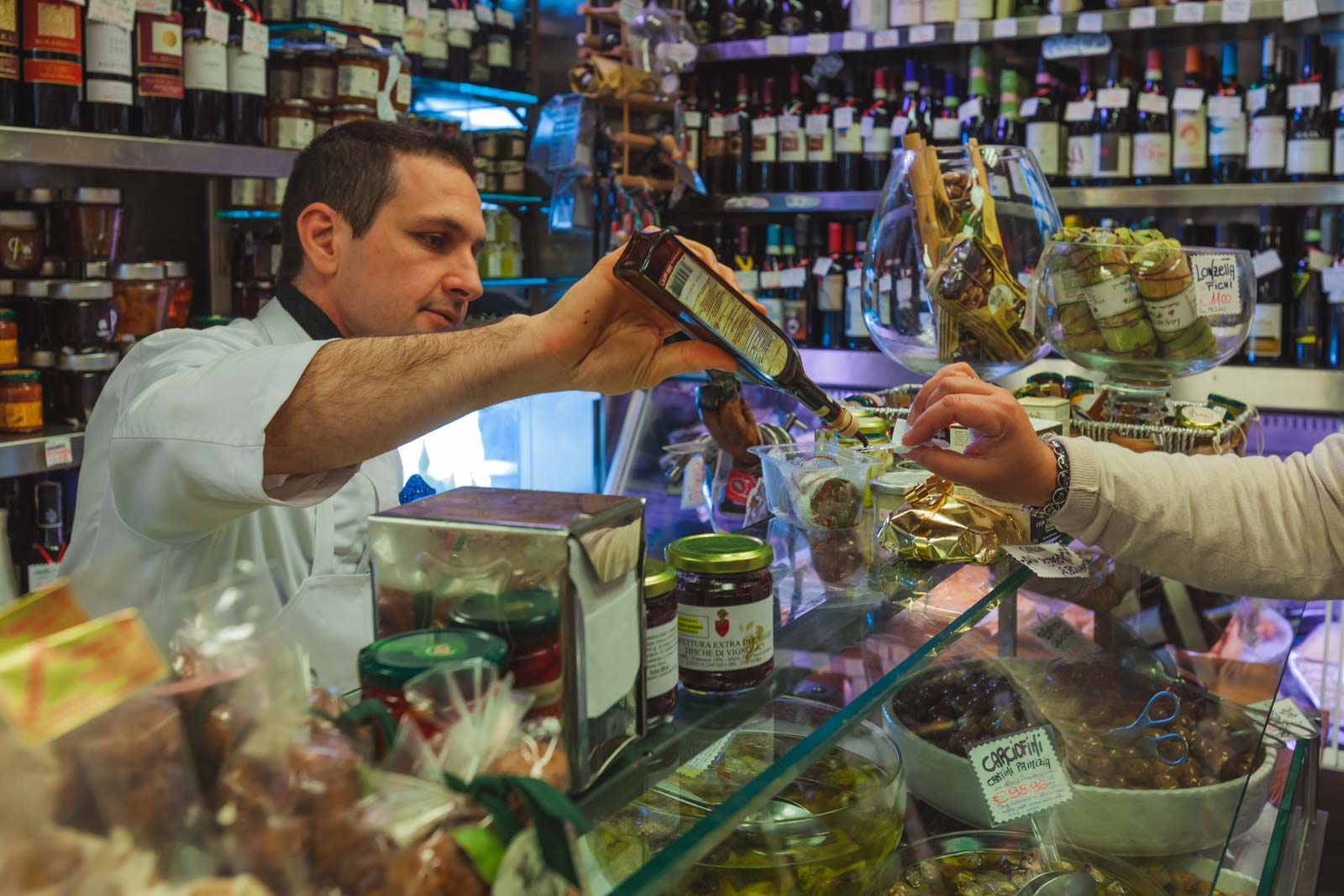
As an example, the food tour linked above includes five street food tastings, one glass of beer, and one glass of wine. You can also incorporate a walking tour of the Jewish Quarter or Trastevere. This tour finishes like all good experiences – with ice cream. In total, it lasts for 2.5 hours, coming to a close at a popular local gelato stall.

Of course, 2.5 hours might sound like too much after yesterday. Let your own energy levels and interests guide you. And alternatively, if your legs are too tired from all the walking yesterday, book a cooking class.
A cooking class is more expensive, but it includes all your ingredients and an element of tuition. If standing still or sitting down while being introduced to Italian cuisine sounds more appealing, a cooking experience might be more up your street. There are loads of choices, like this pasta and tiramisu workshop or a family-friendly pizza workshop.
This highly-rated pasta & Tiramisu class teaches you how to make pasta and tiramisu from scratch. Or you can choose this Pizza Class that is fun for the whole family in an authentic Pizzeria with a real stone oven.
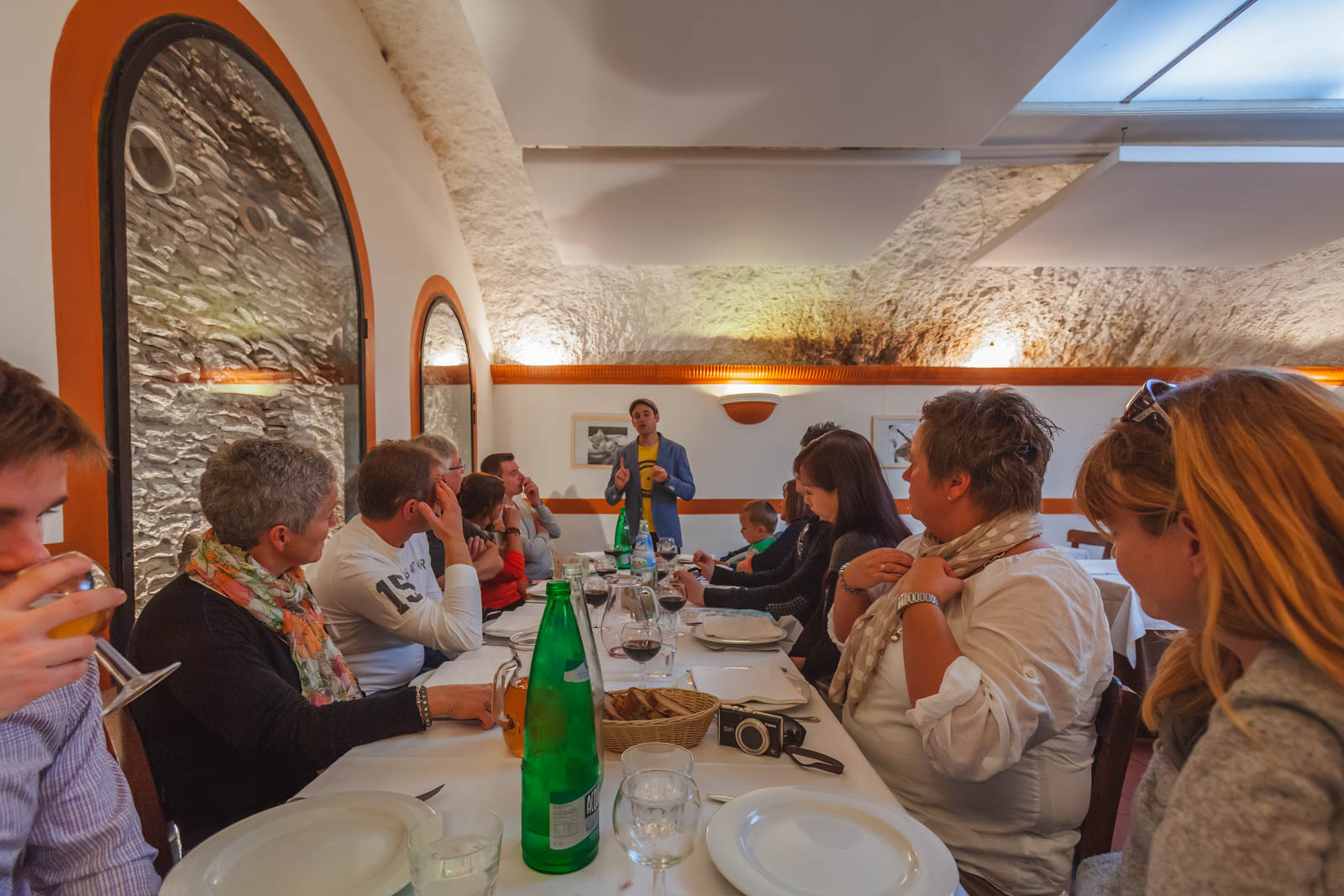
Cooking class or street food tour, you’ll start your day on the right foot – with a full stomach and mind full of new culinary inspiration. And wherever you finish should be close to our next stop, Piazza di Spagna.
Piazza di Spagna and the Spanish Steps
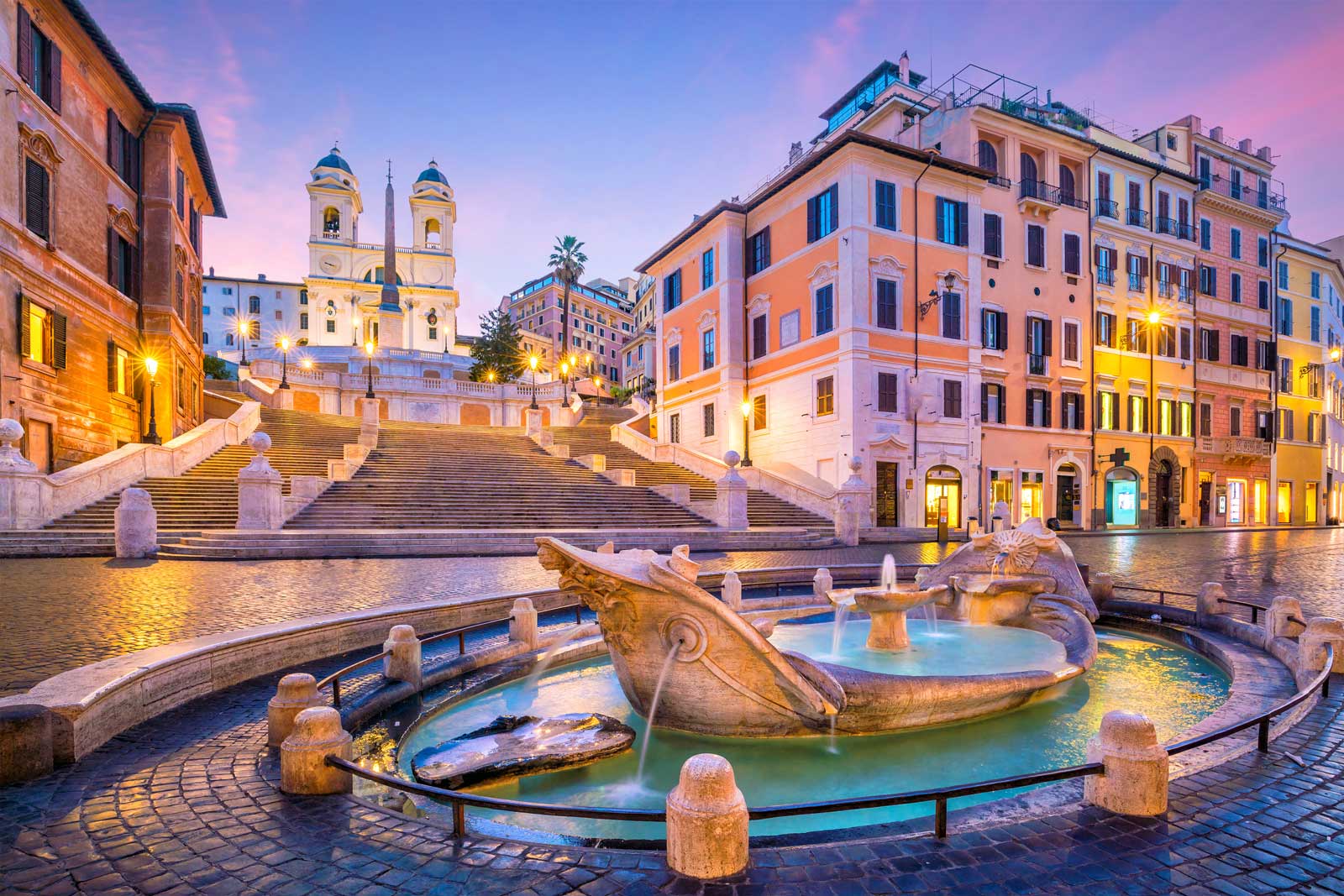
- Opening Times: 24 hours a day
- Cost: Free
- Suggested Tour: Visit independently
Piazza di Spagna and the Spanish Steps are one of the highlights of modern Rome. The 18th-century square is a hub of activity, both during the day and at night, when it glows up beautifully. Visitors can drink straight from the fountain in the square’s center, enjoy the general atmosphere, or climb the Spanish Steps. The Spanish Steps have a distinctive design, arranged in an irregular butterfly shape. The steps are rumored to be Europe’s widest set of steps – although the jury is still out on that one.
You’ll spend a maximum of around half an hour sightseeing Piazza di Spagna and the Spanish Steps. The most modern part of the experience is the shopping around the square. What is more Italian than Italian clothing brands? You can reach Gucci and Balenciaga in seconds from Piazza di Spagna.
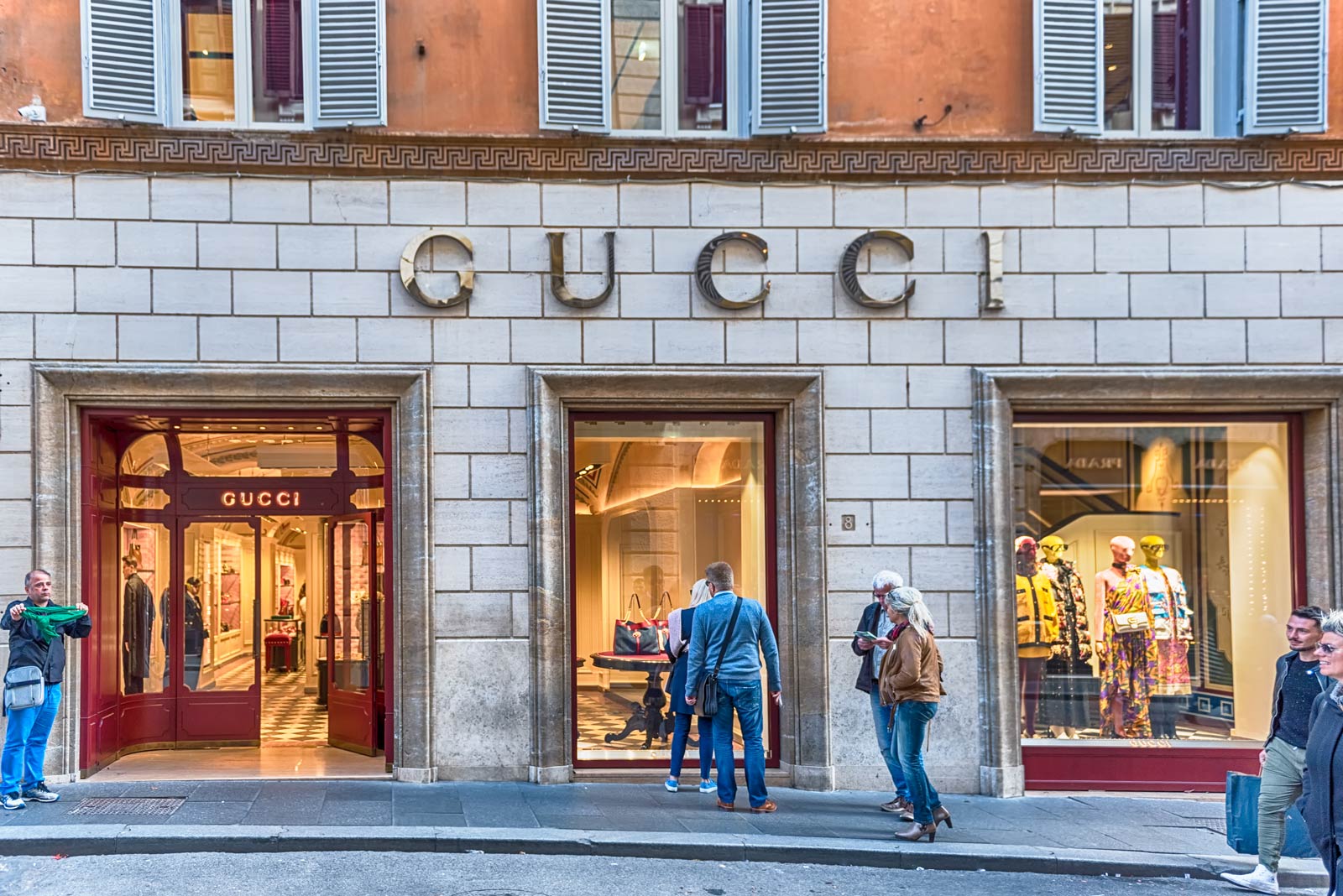
Not everyone will want to make expensive purchases, but it is undoubtedly an experience just browsing. You can admire the collections of sky-high-priced tiny handbags and luxe clothing lines. If you wander a minute or so further, you’ll also find Jimmy Choo, Louis Vuitton, Chanel, Dior, and Prada. Italy really is the home of fashion, and experiencing such a high density of catwalk brands in one spot feels a little surreal.
Take your time exploring the square, walking the Spanish Steps, and window shopping. You have a few hours free, so you can take it really easy and stop to treat yourself to lunch or a cold drink. Especially now that you have brushed up on your knowledge of Italian cuisine.
Afternoon: National Gallery of Modern and Contemporary Art
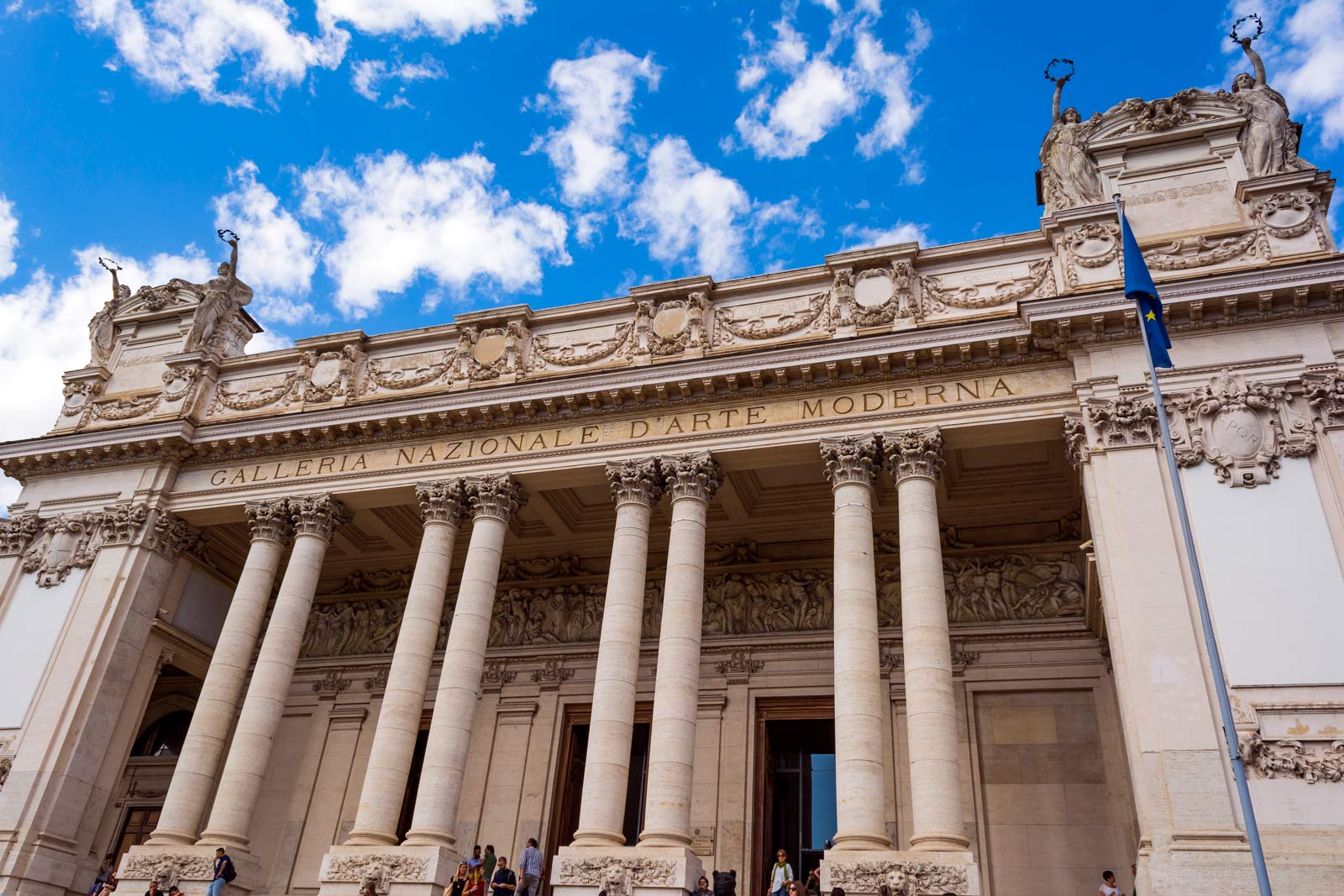
- A 22-minute walk from the Spanish Steps
- Opening Times: 9 am to 7 pm
- Cost: $10+
- Suggested Tour: Rome Pass – Choose from 48 or 72 hours to gain skip-the-line access to Rome’s top attractions. This includes free transportation around the city.
After appreciating the Italian fashion scene, you are in for a modern and contemporary art treat. Around mid-afternoon, head on a 20-minute scenic walk to the National Gallery of Modern and Contemporary Art Museum. You cut through the Villa Borghese park, which is a lovely, refreshing change of scene after a morning in Rome’s busy streets. You’ll be surrounded by fresh plants, greenery, and trees.
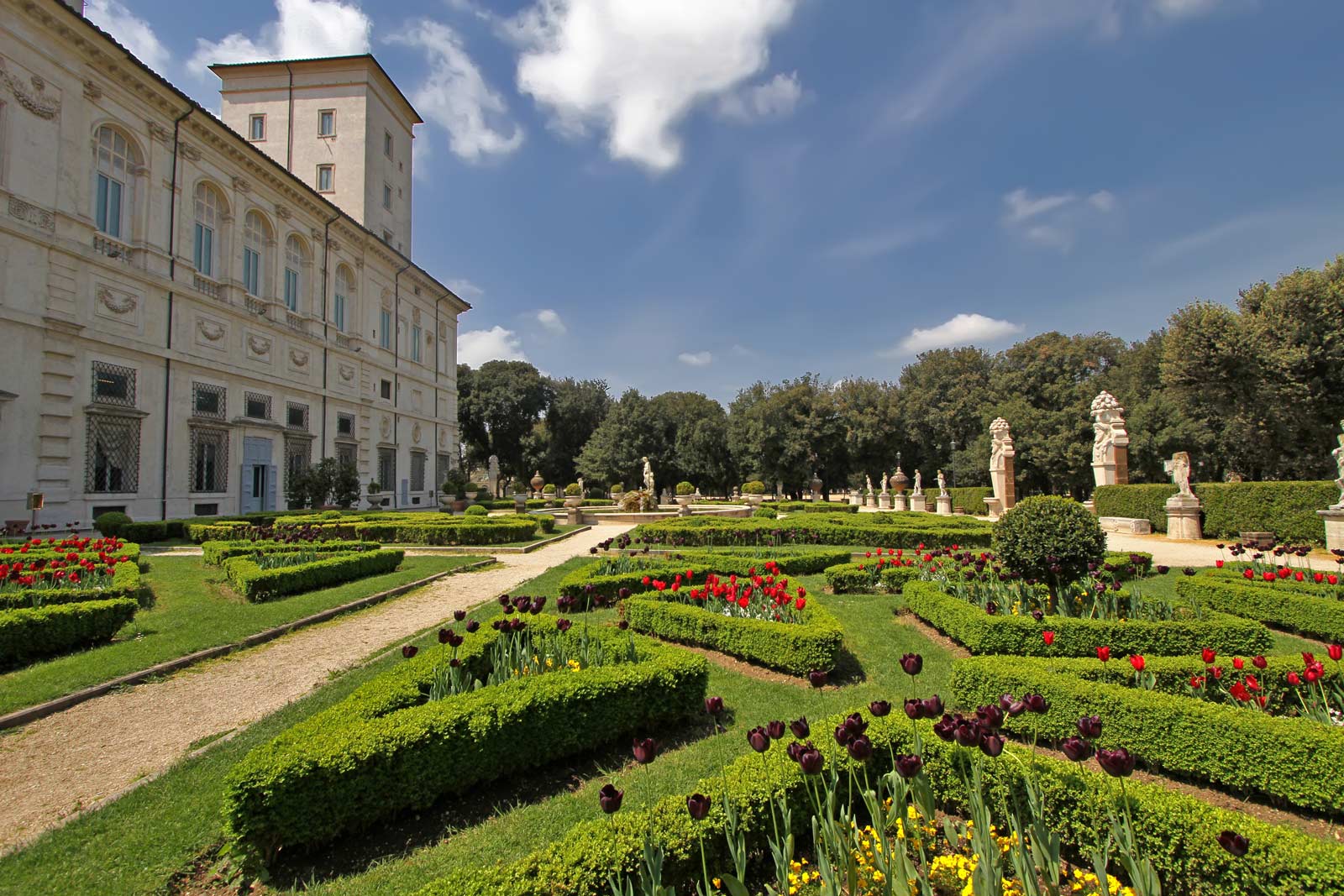
If you find yourself with extra time, you can always stop at Borghese Gallery and Museum if it seems something you fancy. The Borghese Gallery is situated in a villa that houses 15th to 18th-century artworks and includes artwork by Bernini and Caravaggio.
Book online in advance if you want to visit Borghese Gallery and Museum before visiting the National Gallery. Alternatively, just head straight to the National Gallery for an experience of modern Italian art rather than older pieces.
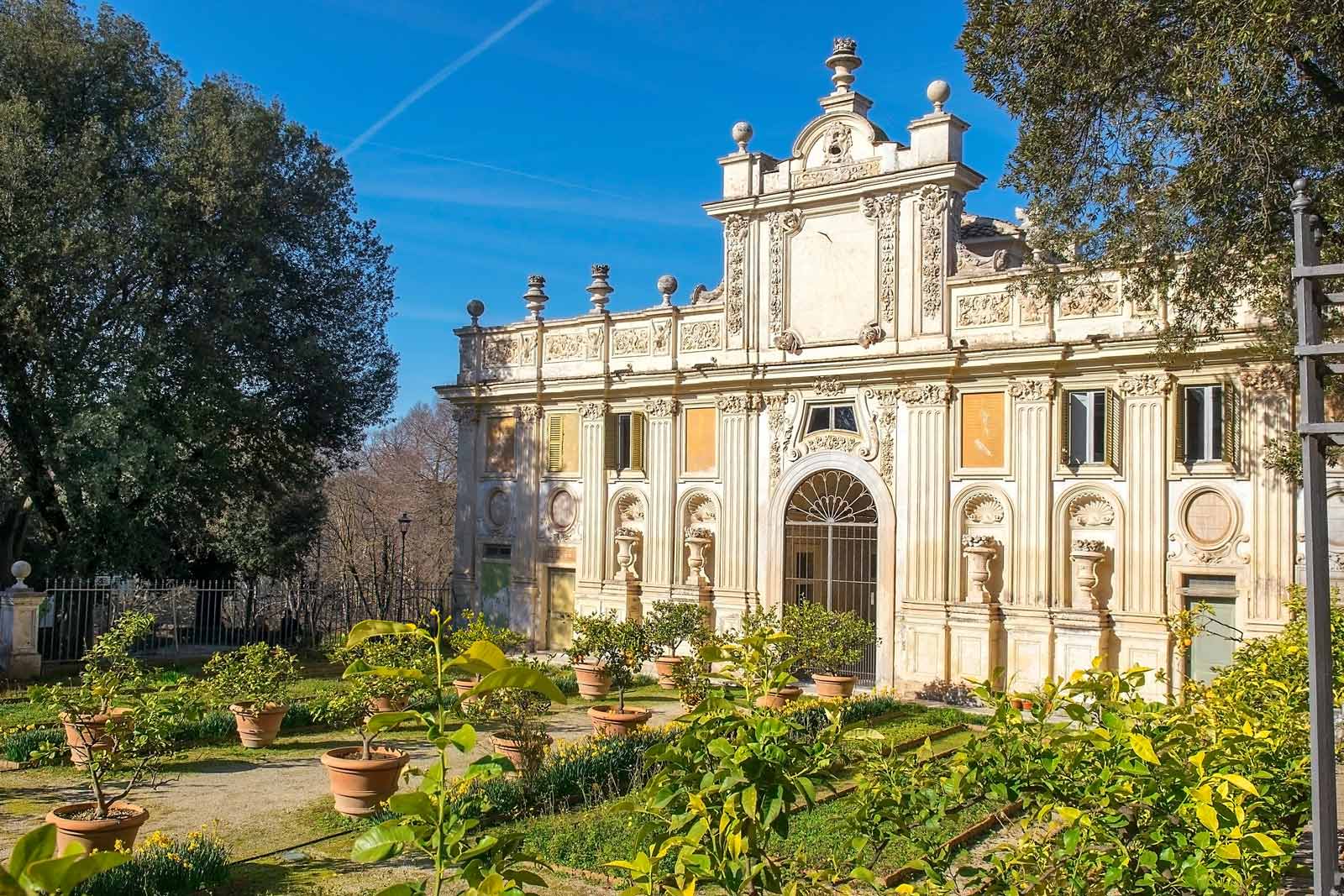
The National Gallery of Modern and Contemporary Art houses masterpieces by renowned artists like Canova and Van Gogh. Ranging mainly from the 19th to 20th centuries, this museum is one that art enthusiasts and more general visitors will love. You don’t need a keen interest in art and extensive background knowledge to get the most out of this gallery.
You can book skip-the-line access or just turn up on the day to purchase tickets on arrival. The National Gallery of Modern and Contemporary Art is surprisingly a very laidback attraction in Rome. The cool building is the perfect place to escape that outdoor heat.
Evening Activity: Visit Passeggiata del Pincio
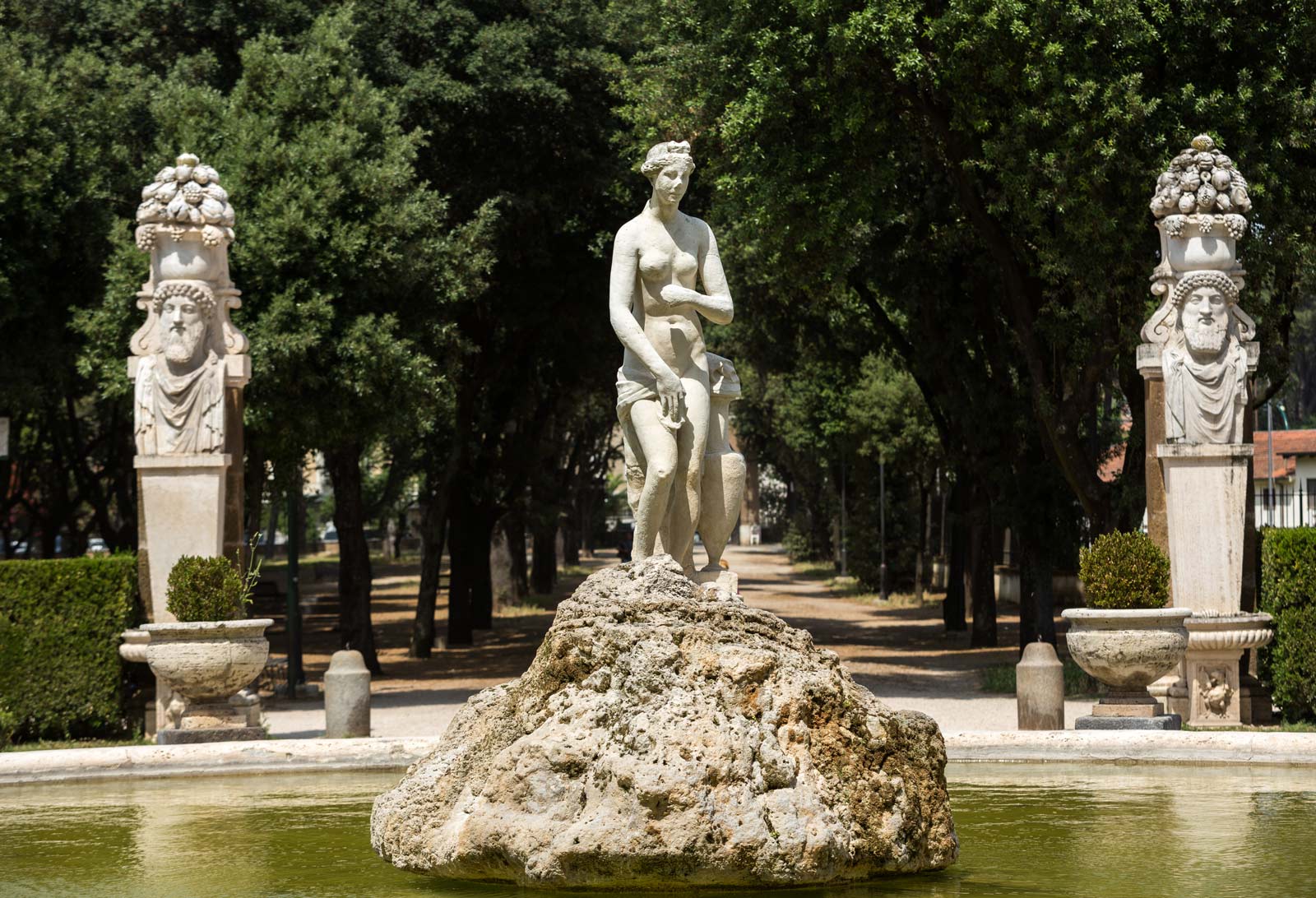
- A 12-minute walk from the National Gallery of Modern and Contemporary Art
- Opening Times: 24 hours a day
- Cost: Free
- Suggested Tour: Visit independently
End your day just as peacefully as you started, catching the sunset at Passeggiata del Pincio. The Passeggiata is a promenade with over 200 busts of important historical figures in Roman history. Located in the southwest section of the Villa Borghese gardens, you’ll head back through the greenery to finish your day here. Hopefully, you can coincide it with sunset, especially in winter when the nights get darker quicker. However, even in the late afternoon, the views are stunning.
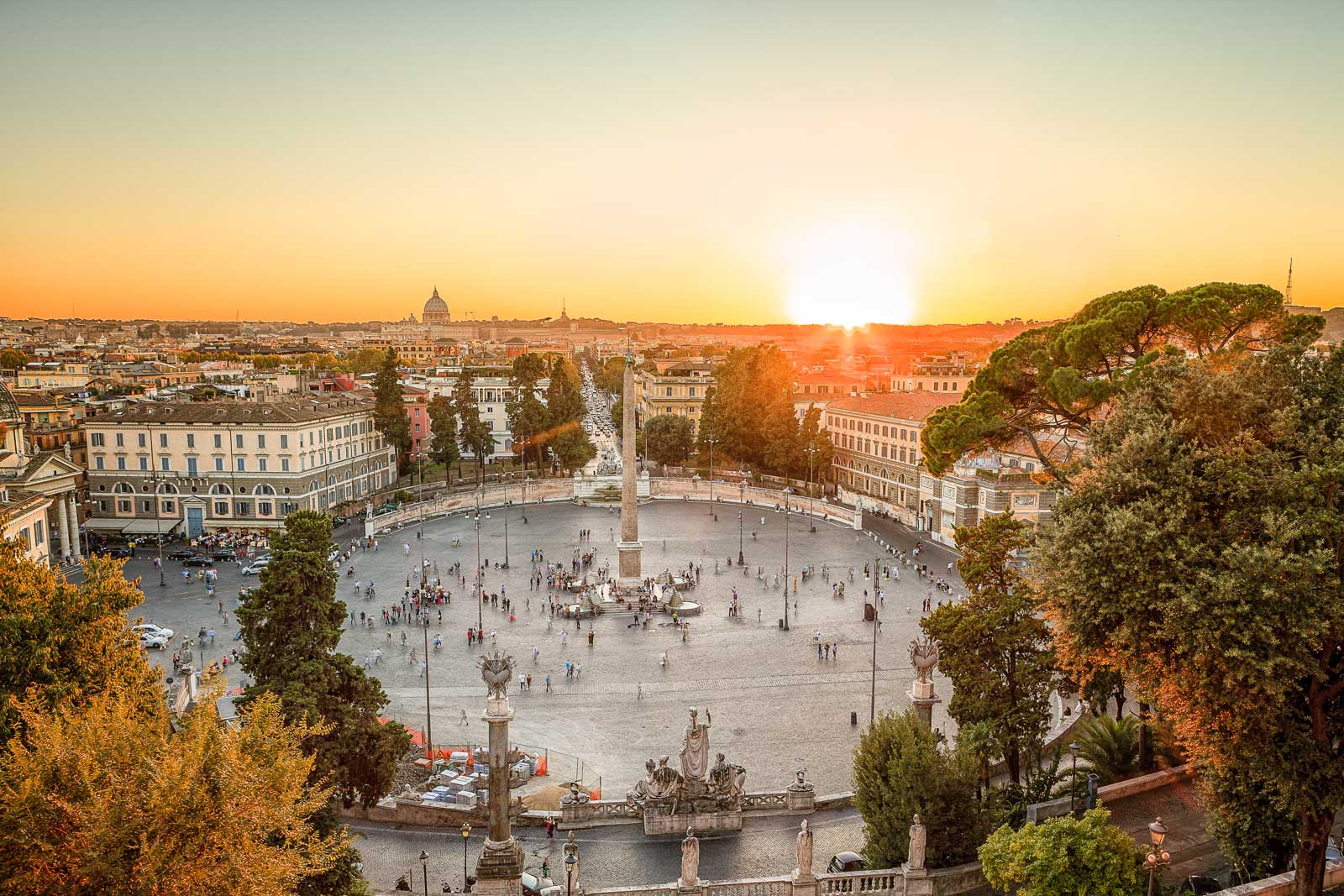
From Passeggiata del Pincio, you get beautiful sights of Piazza del Popolo and the Basilica Santa Maria del Popolo Catholic Church. You can stand against the stone railings and get a much more peaceful perspective on one of Rome’s busiest, most famous squares.
The area is open 24 hours a day and, better yet, is entirely free to enter and enjoy. Expect some crowds, but the romantic atmosphere makes them entirely worthwhile. From your scenic vantage point, take a deep breath and appreciate the close of a day focused entirely on modern luxuries.
Rome Bar Crawl
No visit to Rome would be complete without getting out on the town at night. One of the best introductions to a city’s nightlife is on a bar crawl tour. This highly rated tour shows a different side of Rome that combines sightseeing with cocktails, beer, and wine. Since it takes place at night, you’ll delve into some of Rome’s darker history while enjoying the sights between popping into different bars.
As the night goes on you’ll visit the Monti neighborhood that was once the red light district. Signature drinks you’ll enjoy are Cafe Corretto (Bailey’s and Coffee) and Limoncello as you explore Rome’s most popular bars.
Day 3 in Rome: Vatican City
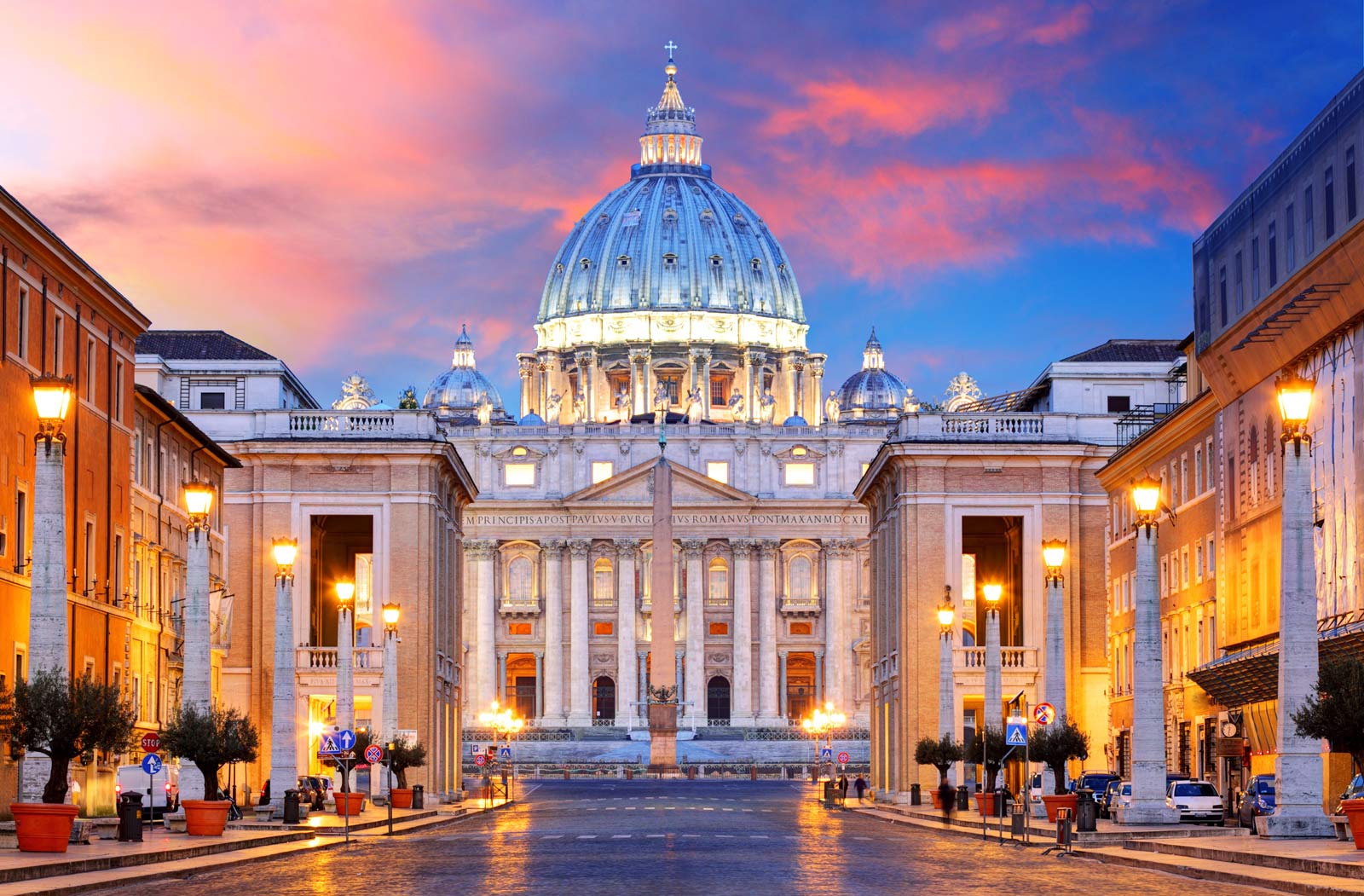
Visiting Rome is only complete if you visit Vatican City. On our final day of this 3 days in Rome itinerary, you’ll be crossing the Tiber River and entering the smallest country in the world. Yes, you read that right – Vatican City is an independent city-state despite being just an 8th of the size of New York’s Central Park. The Vatican is the head of the Catholic Church and is home to the pope. It has its own army and football team and functions as a very small country within Rome.
Rome Itinerary Day 3
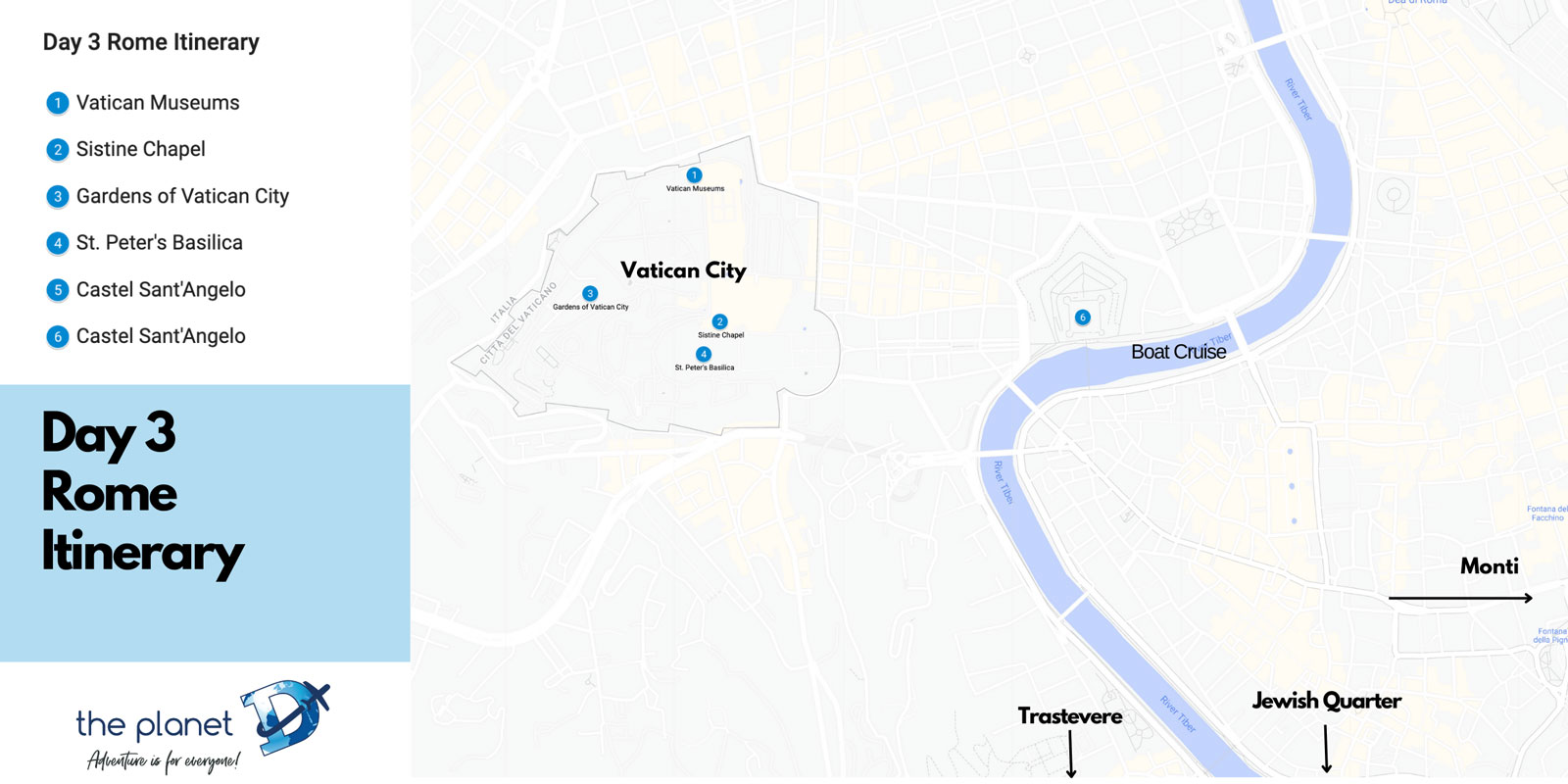
If this sounds like it could be a complicated trip from Rome, rest assured it isn’t. Crossing into the Vatican is a breeze. Vatican City is just a 20-minute train ride from the center of Rome. Depending on where in Rome you are staying, it could even be within walking distance, and since there is no hard border, you can just waltz straight in.
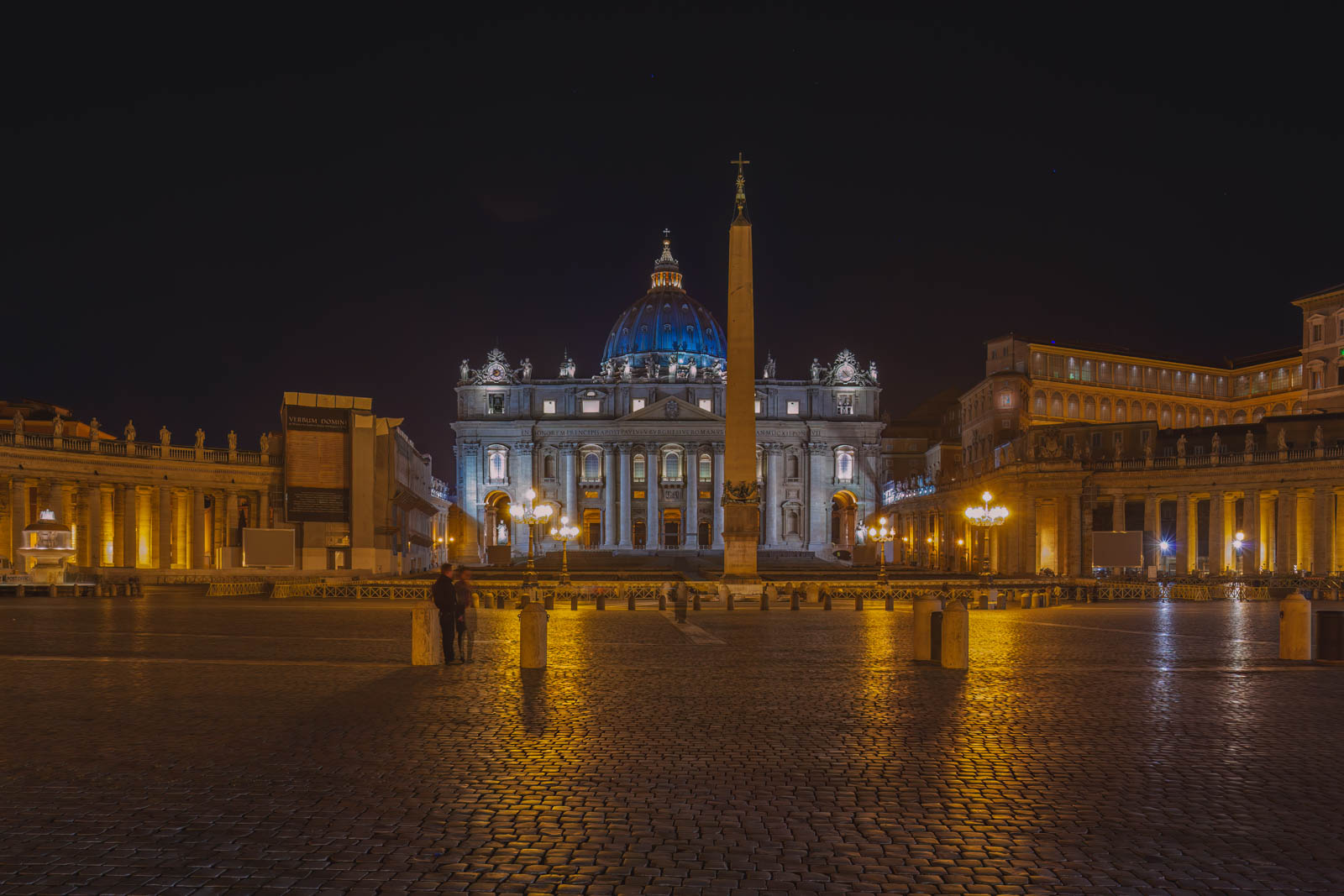
The Vatican City is a highlight of any trip to Rome and has much to do. It definitely demands a whole day. After a break from hardcore sightseeing yesterday, you’ll be ready to tackle the best of the Vatican Museums – including Michelangelo’s legendary Sistine Chapel. Take it steady and pack lots of water. Today will be a day to remember.
Morning: The Vatican Museums and Sistine Chapel
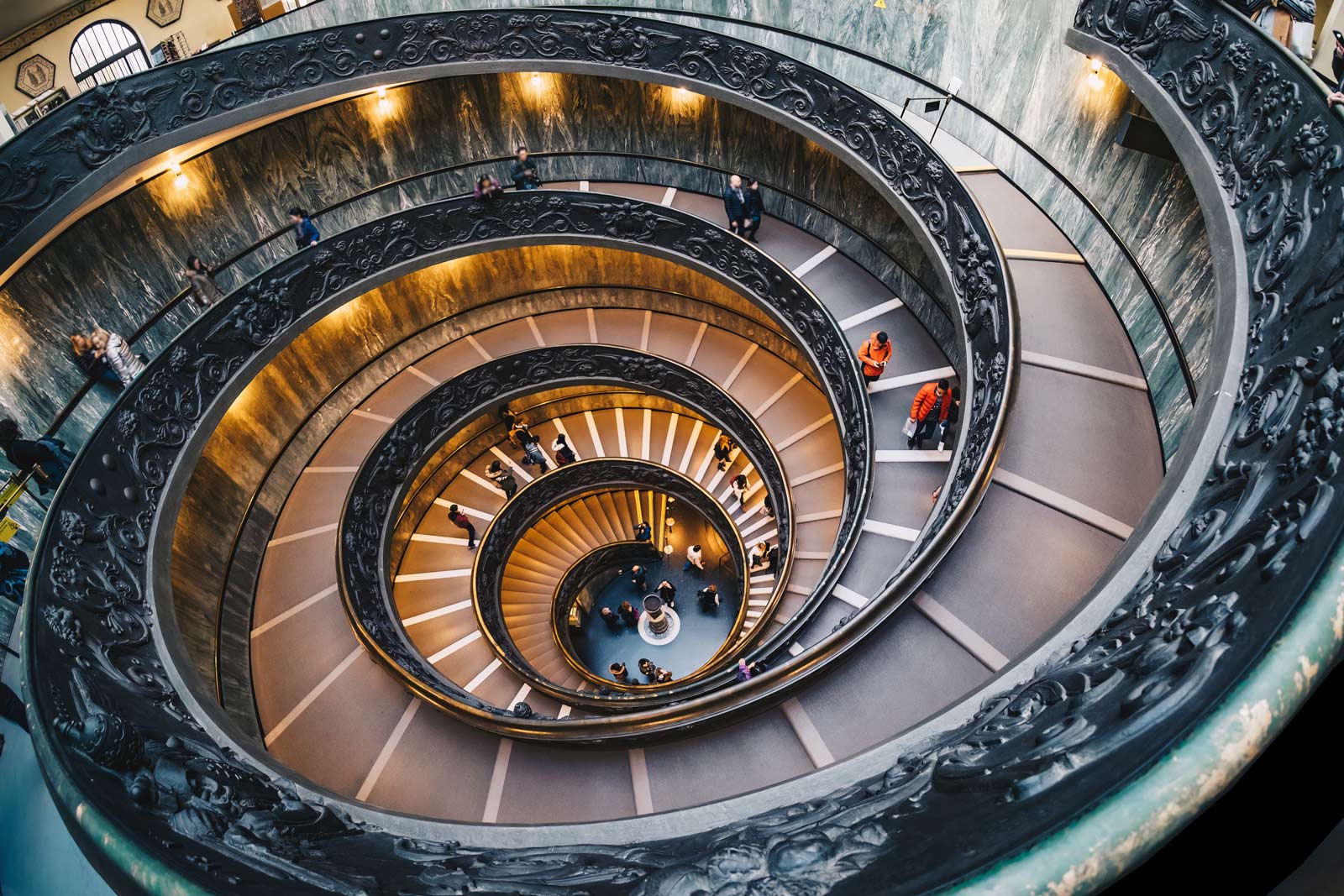
- Opening Times: 9 am to 4 pm
- Cost: $20
- Suggested Tour: Vatican Museums and Sistine Chapel Skip the Queue Ticket – This is one of the world’s busiest museums, so it is worth booking a skip-the-line ticket. You’ll enter through GetYourGuide’s dedicated entrance at your preferred time where you’ll pick up your audio guide and have access to the Sistine Chapel to see Michelangelo’s The Creation of Adam.
The Vatican Museums are the highlights of a trip to Vatican City, and the museums are some of the most detailed collections of artifacts in Rome. The museums include the stunning Michelangelo frescoes on the roof of the Sistine Chapel. You’ll be familiar with the image – two people reaching out to each other only a finger apart. When visiting Rome for 3 days, how could we leave this famous scene out?
While there is no formal guided tour, you can purchase skip-the-line tickets for the Vatican Museums, which we thoroughly (thoroughly, thoroughly, and really thoroughly) recommend. The queues are known for being massive, and that’s before you even buy your tickets. Get there early with skip-the-line access.
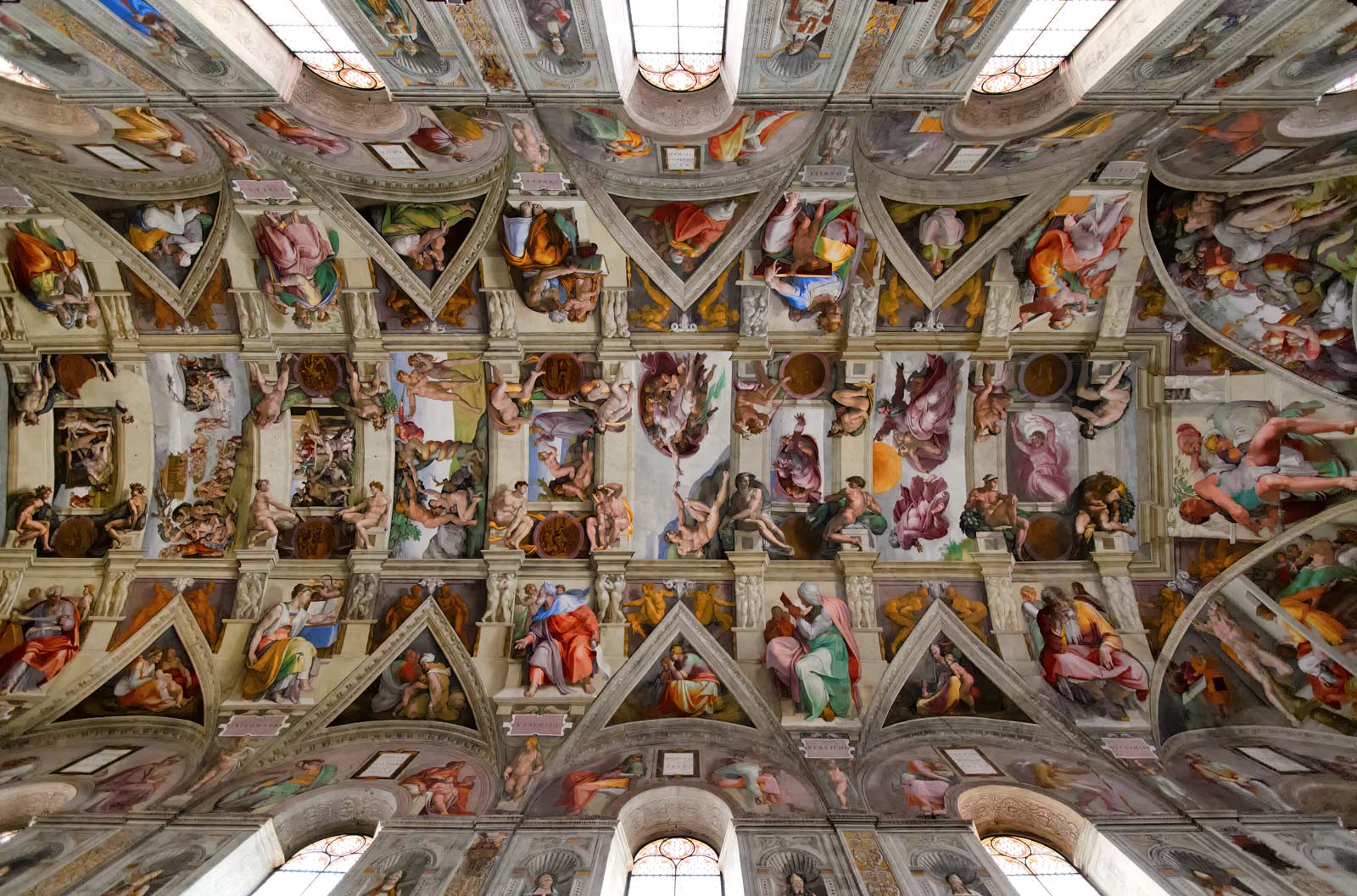
The Sistine Chapel and the rest of the Vatican Museums are one of the most significant attractions in Italy, never mind just in Rome. A skip-the-line ticket will mean avoiding standing around in the heat for hours. It allows you to maximize your time enjoying the rest of Vatican City.
The Vatican Museums are known for their Roman, Baroque, and Renaissance architecture. They contain one of Italy’s finest collections of art, archeology, and ethnology. For museum lovers and even just bucket list tickers, the Vatican Museums are a must-visit in Vatican City. Just make sure to double-check the clothing restrictions before arriving. Shoulders and lower legs need to be covered out of respect before entering.
Afternoon: Gardens of the Vatican City
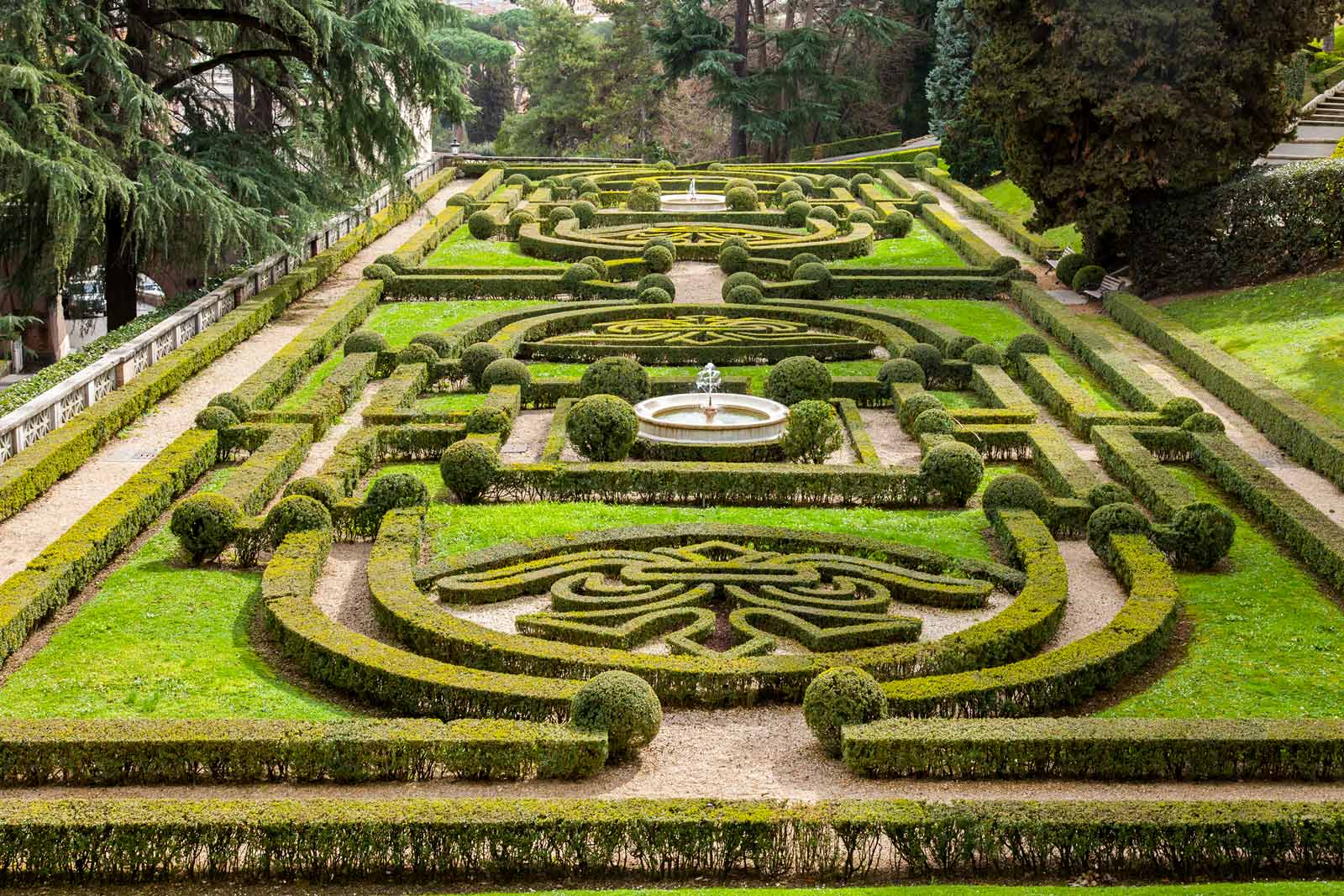
- 20-minute walk from the Sistine Chapel/Vatican Museums
- Opening Times: 9 am to 6 pm
- Cost: Free
- Suggested Tour: Vatican Museums and bus tour around the Gardens of the Vatican City This unique tour lets you see the gardens of the world’s smallest state. The gardens occupy one-third of Vatican City by open-air minibus. Then you will have access to the Vatican Museums and Sistine Chapel.
After wandering indoors, relaxing amongst shaded greenery is heaven on Earth. The Gardens of the Vatican City are fantastic to visit and are full of art, manicured gardens, and water features – including a pool with terrapins. Head straight from the Vatican Museums to the gardens for some cool-off time. You could bring a book and a blanket.
To visit the gardens is free, but if you want a more informative experience, you can book a guided tour. The tour we’ve linked includes entry to the Vatican Museums and a bus tour around the gardens after. This is a good package bundle for those happy to combine the two, and the bus is a unique way to experience a new corner of Rome. It will also save your legs from extra walking, which is always lovely.
St Peter’s Basilica and St Peter’s Square
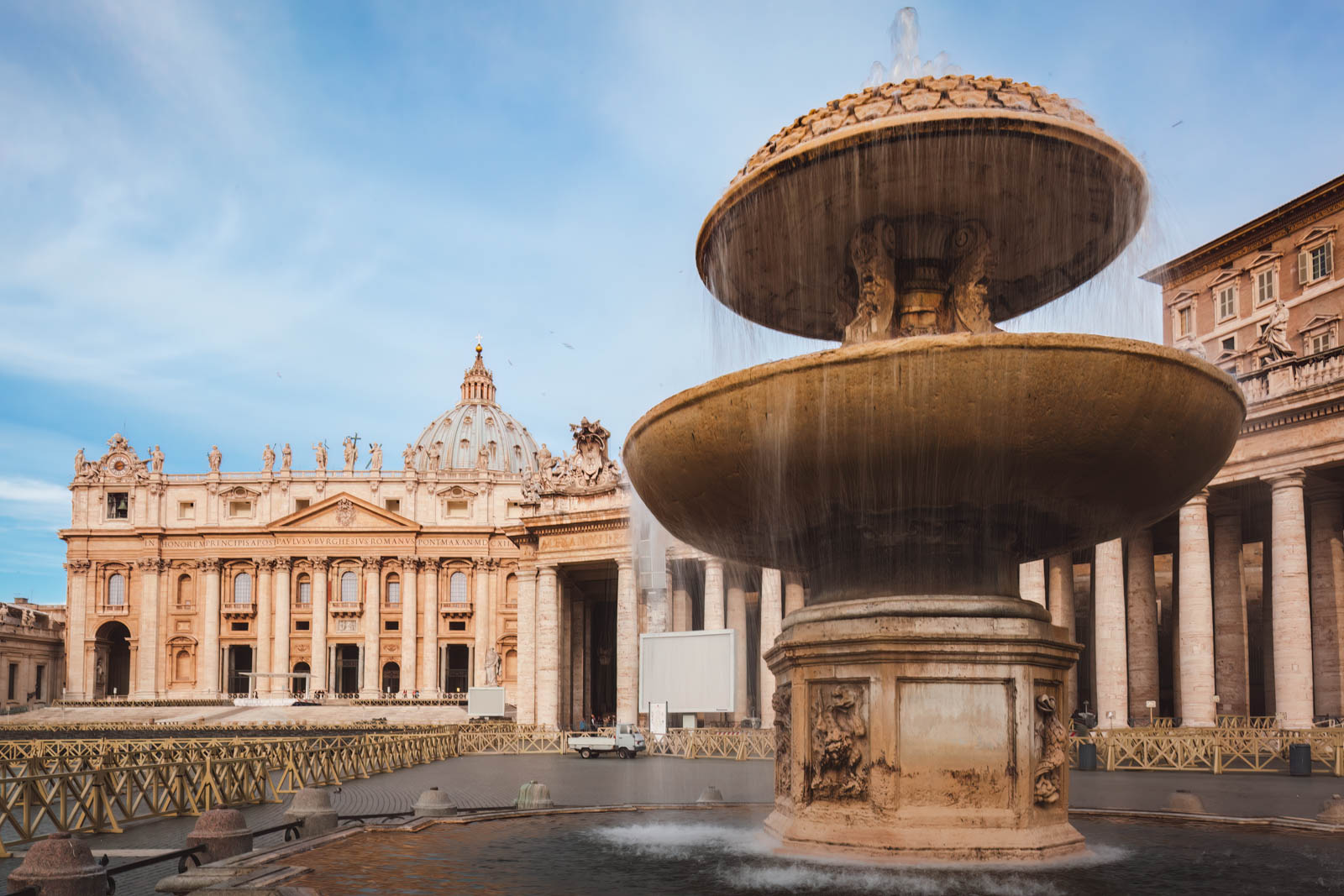
- 15 minute walk from the Gardens of the Vatican City
- Opening Times: 7 AM to 6 PM
- Cost: Free
- Suggested Tour: Guided Tour with Dome Climb has you joining a guided tour of St. Peter’s Basilica that includes climbing to the top of the dome where you’ll look out over St. Peter’s Square and the Vatican Gardens. This dome also has beautiful views of Rome where you can see the Colosseum and the Pantheon.
If you are looking to save money, don’t fear. St Peter’s Basilica and Square have a free entry policy. But they are also some of the biggest names in Italy, let alone Vatican City, the smallest country in the world. St Peter’s Basilica is considered the most beautiful basilica in Rome and is a picture of elegance.
St. Peter’s Basilica was built in Renaissance style and opened in 1626, and it is a massive marker of Catholicism. It is considered a central piece of architecture and identity within Vatican City. It is a place of holy meetings and adoration and is also rumored to be Saint Peter’s final resting place.
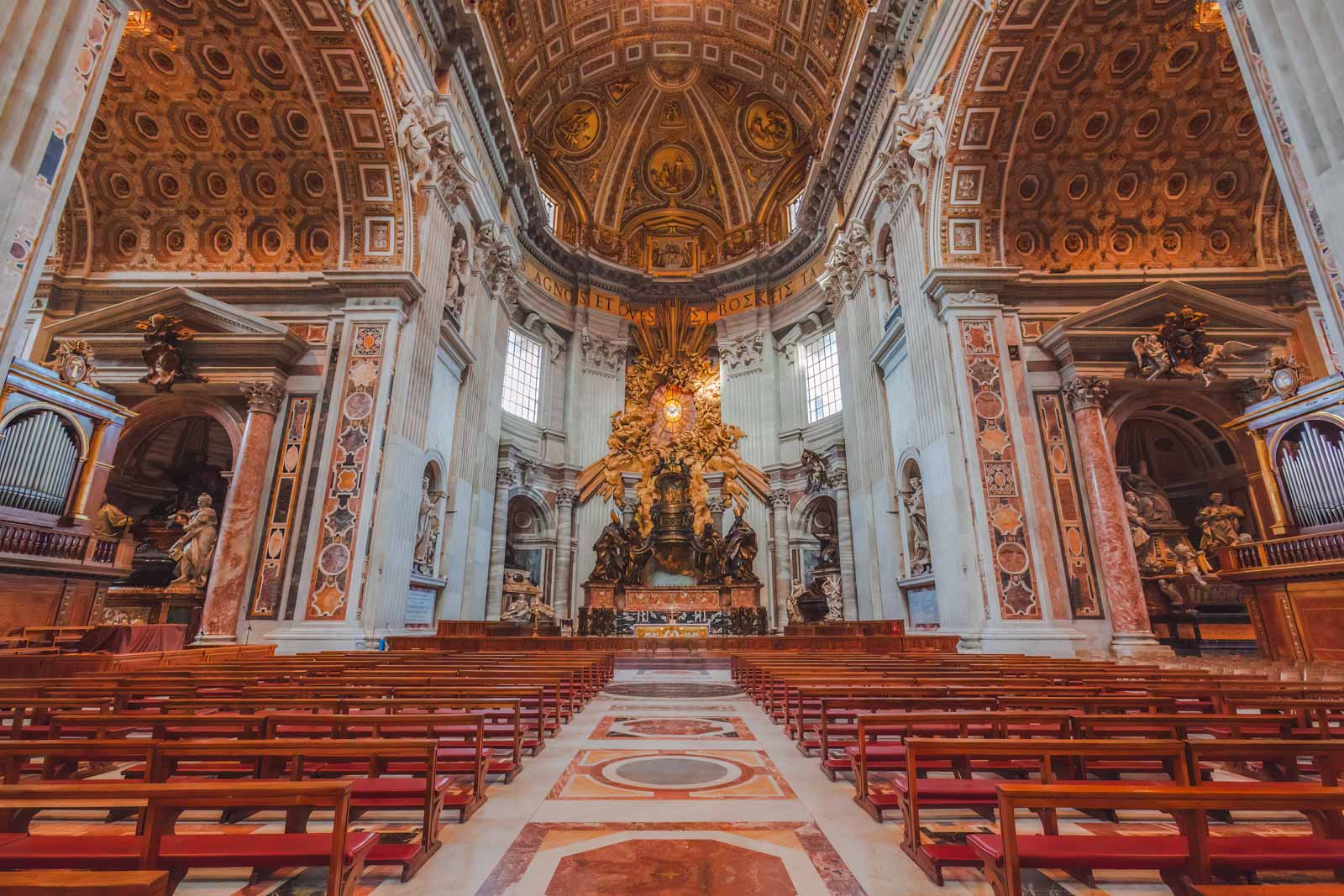
In fact, Saint Peter’s tomb is said to lay underneath the high altar of the basilica. If that’s the case, Saint Peter doesn’t lie at St. Peter’s Basilica alone, as all the popes since 1626 have been buried there. Inside, you’ll find a carving that marks all of the popes that the church now houses.
Allow around an hour to fully appreciate St Peter’s Basilica. Opt for modest but lightweight clothing as a compromise between dress code and comfort, and if you don’t book a tour, be prepared to queue.
Extra Activity: Visit the Castel Sant’ Angelo
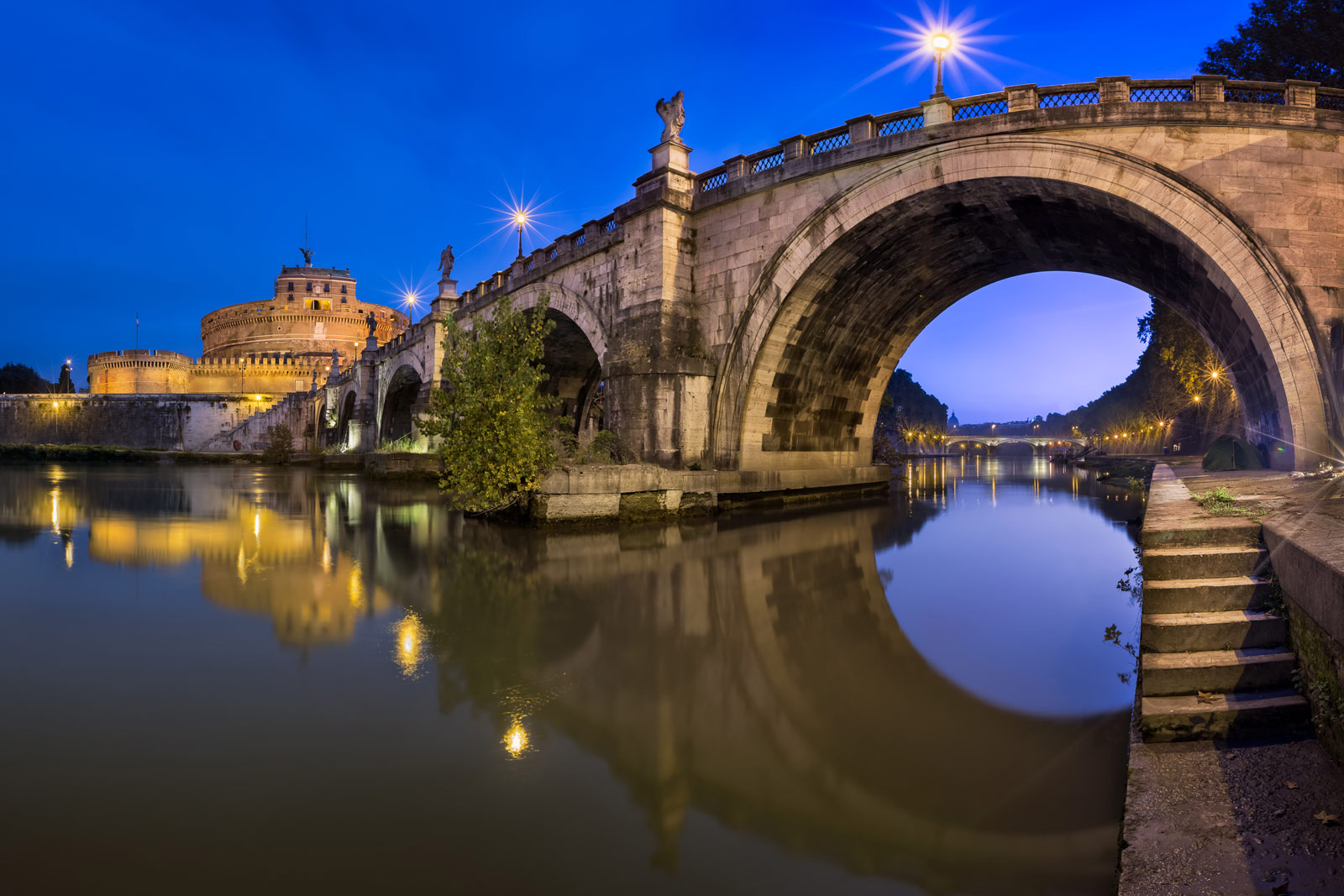
- 10 minute walk from St Peter’s Basilica
- Opening Times: 9 am – 7:30 pm
- Cost: $15-30
- Suggested Tour: Skip the Queue and Audio Guide Tickets – Like most attractions in Rome, it’s good to have a skip-the-line ticket. This one gives you admission to explore the Mausoleum of Hadrian at Castel Sant’ Angelo at your own pace on your smartphone.
Castel Sant’ Angelo is situated between Vatican City and Rome’s city center, overlooking the Tiber River. There is also a statue of the Roman Emperor Hadrian on its grounds. In winter, it makes a beautiful sunset spot over the Tiber River.
Evening Cruise on the Tiber River
On your final night in Rome, an evening cruise on the Tiber River is a beautiful way to say goodbye to the Eternal City. This highly-rated tour includes appetizers and wine as you take in views of Rome from the river. Depart from Castel Sant’Angelo pier and indulge in a selection of pizzas, pachina, lasagna, and a glass of wine as you enjoy the sunset over Rome’s top landmarks. See more details here.
FAQs: 3 Days in Rome
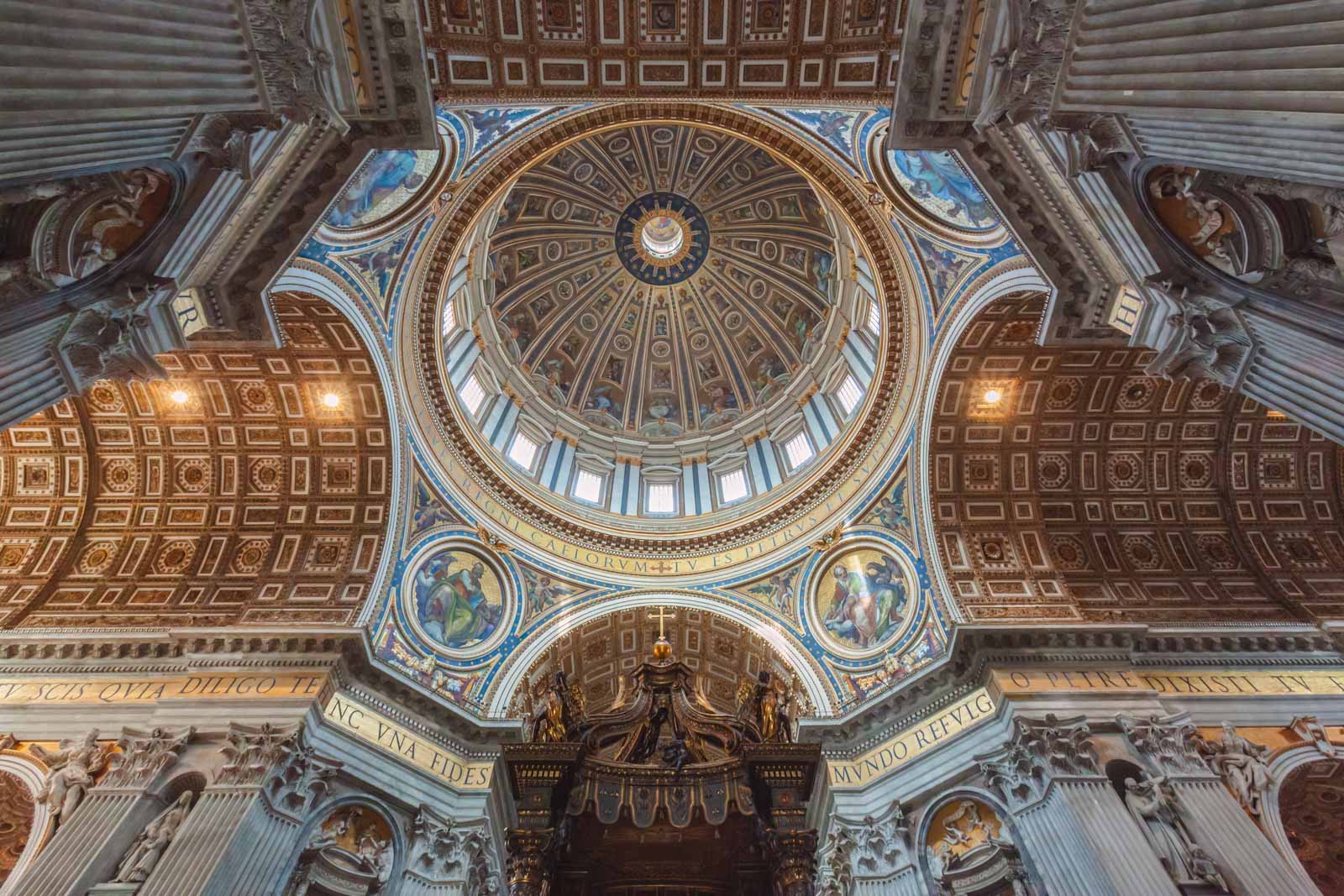
So you’ve got the ultimate 3 days in Rome itinerary, but you are bound to have some burning questions in mind. Let’s take a look at some common FAQs.
Is 3 days in Rome long enough?
3 days is long enough to see what Rome has to offer. You can visit Vatican City and major attractions like the Colosseum, and Roman Forum and have time to appreciate Italian hospitality culture. You will just have a busy holiday.
How do I plan for 3 days in Rome?
Arrive in Rome with a firm itinerary and a good pair of walking shoes. Make sure you have access to Google Maps, either with a prepaid SIM that gives you local data or offline maps downloaded in the app.
How many days is ideal in Rome?
4 days is ideal for visiting Rome. As the saying goes, ‘Rome wasn’t built in a day’, and the same patience and duration of time are required to fully appreciate the city in its 21st-century glory. 4 days in Rome gives you time to cover all the significant landmarks and a little time left to relax. You could use this time to experience more off-the-beaten-track attractions or take a day trip somewhere like the beach.
Is 3 days enough to visit Italy?
3 days is enough to have an action-packed city break in Italy. You’d need months and months to get a taste of the entire country. However, if you narrow down where you want to visit, then 3 days is enough to get a brief experience of Italy. Somewhere like Rome, Milan, Venice, or Naples would be ideal.
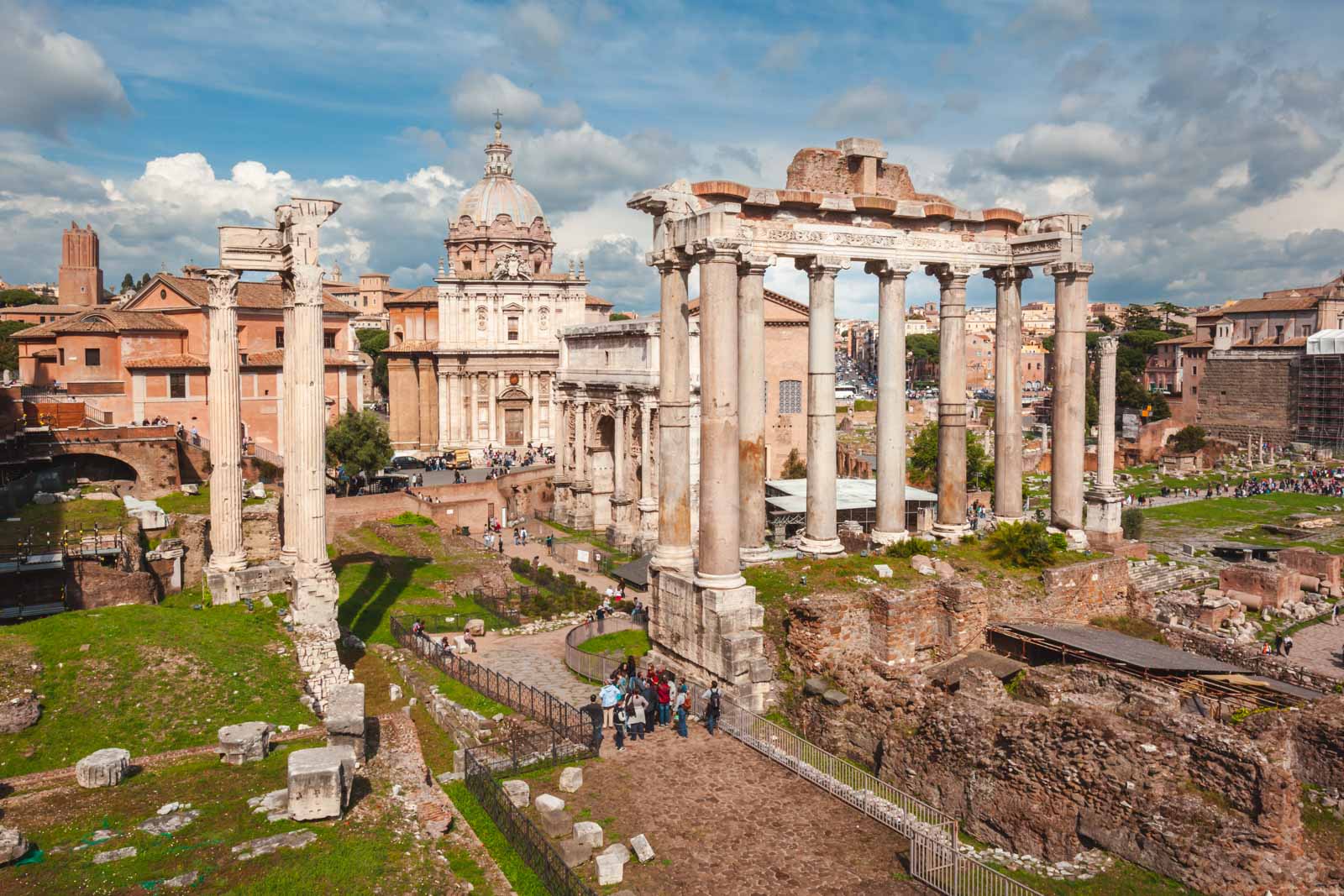
How many days in Rome are needed?
3 days is the absolute minimum amount of time you need to experience Rome. Anything less than 3 days and you’ll have to sacrifice bucket list attractions and will spend too much time rushing around to actually slow down and appreciate Italian culture.
Is 4 days in Rome enough?
4 days is perfect for visiting Rome. It is easy to fit into a long weekend and is short enough that it gets expensive with hotel fees. However, 4 days also allow you to see all the major attractions and have a bit of downtime.
Can Rome be done in 3 days?
Yes, Rome can be done in 3 days. You will have time to see all the main tourist attractions, including the chance to cross the Tiber River and venture into Vatican City. You will need good time management skills, though. It will involve quick walking and ‘ticking off’ experiences rather than leisurely experiencing certain attractions. In short, Rome can be done in 3 days, but whether you want to do that depends on you as an individual.
How to spend 7 days in Rome?
If you spend 7 days in Rome, you have won the itinerary jackpot. In 7 days, you can leisurely explore Rome’s museums. Places like the Borghese Gallery, which we skipped over in our 3 days in Rome itinerary, can be enjoyed in more detail. You can even add a day trip or overnight trip to your itinerary. Destinations like Pompeii make great detours from Rome, and Pompeii is just under two hours away on the train.
Quick Tips
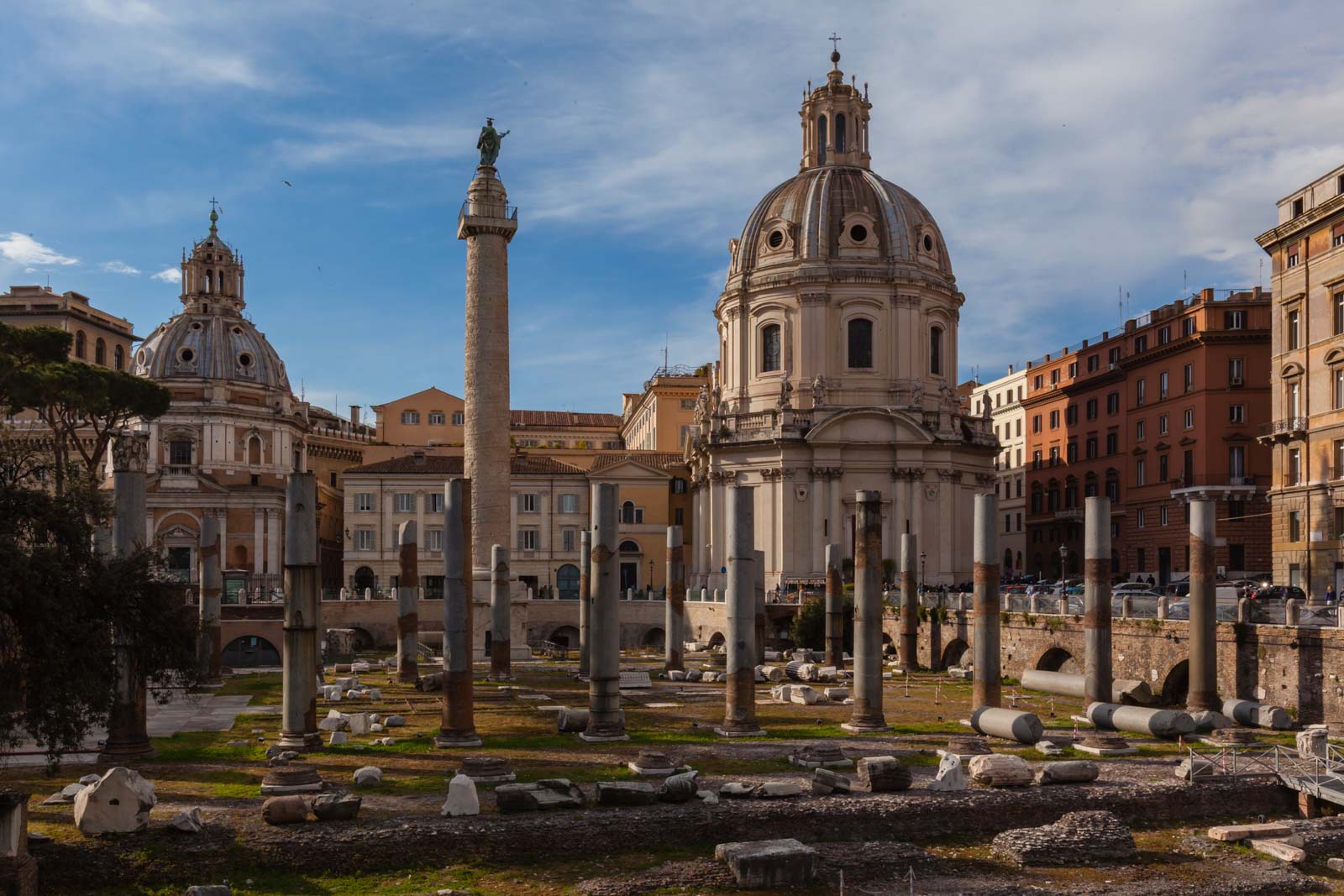
One way to make the most of your Rome itinerary is with a series of quick insider tips. These are some essential things to remember:
Learn a few of the dining etiquette rules
Italy has a lot of food crimes. While you are unlikely to actually get a slap on the wrist for anything (within reason), researching a few etiquette rules beforehand is an excellent way to embrace Italian food culture. For instance, a cappuccino is only drunk before noon since milk is best paired with breakfast. After noon, a caffe macchiato is a socially acceptable alternative.
Rome has free attractions on the first Sunday of every month
Any attraction owned by the state rather than private companies offers free entrance on the first Sunday of every month. If you are visiting Rome on this date, it is worth bagging free entrance to one of the more expensive museums or galleries. It does get busy, though, as good ideas only stay secret for a short time. Get there early to avoid getting stuck at the back of a huge queue.
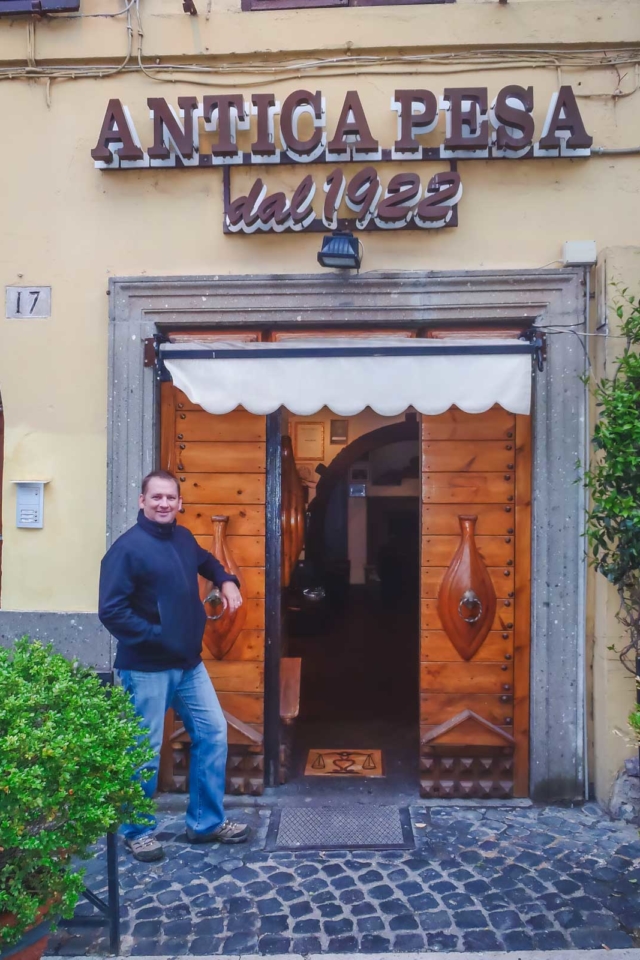
Mind your pockets and bags
Rome is very safe on the whole. However, like most big cities, it is not immune from pickpocketing and street theft. Don’t tempt would-be thieves by leaving valuables hanging out of open pockets and if possible, store luggage securely to avoid carrying bags around that you be snatched. We’ll cover luggage storage in more detail later.
Be aware of laminated menus
Dining in Rome is exciting, but it can feel like you are constantly dodging tourist traps. One sign that a restaurant is more targeted toward tourists than authentic Italian cuisine is that the menu is laminated. Similar signs include being a short walk from a major attraction, showing pictures of the food on the menu, and leaving salt and pepper ready on the table.
When to visit Rome
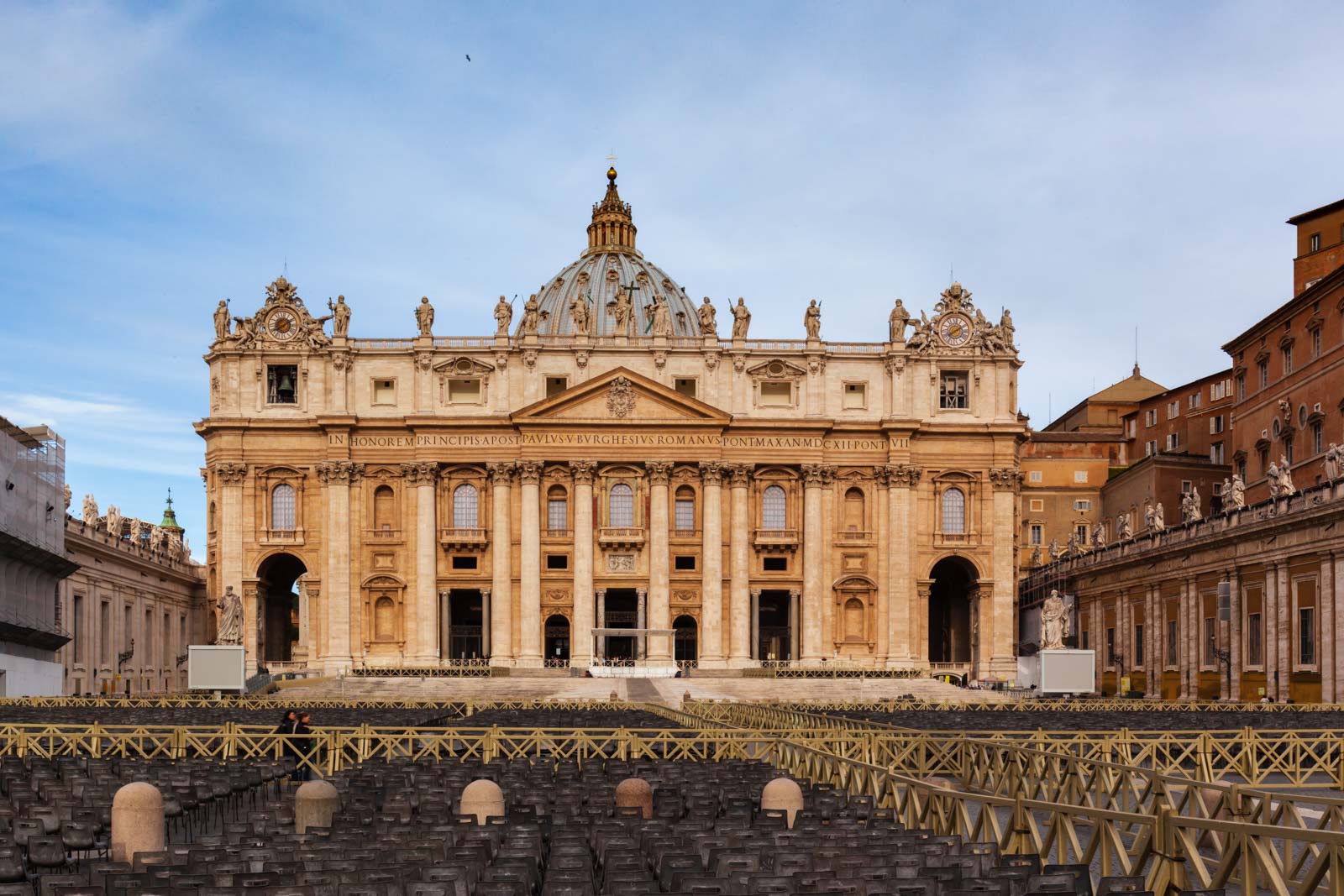
The best month to visit Rome is October, as long as you avoid the October Half Term holiday, which is popular amongst families. October still has warm temperatures and light evenings. Still, it is a shoulder season and attracts fewer crowds than in July and August. It is also nice to have slightly cooler temperatures for sightseeing, as Rome gets notoriously hot in summer, situated inland with a little breeze.
Can’t visit Rome in October? Well, there are some more choices. October to April is generally considered the best period to visit Rome, but we can break that down further. While December and January are festive, they are rather hectic. February and March are good options for fewer crowds, and temperatures aren’t totally freezing, reaching up to 62 degrees Fahrenheit.
How to get around Rome
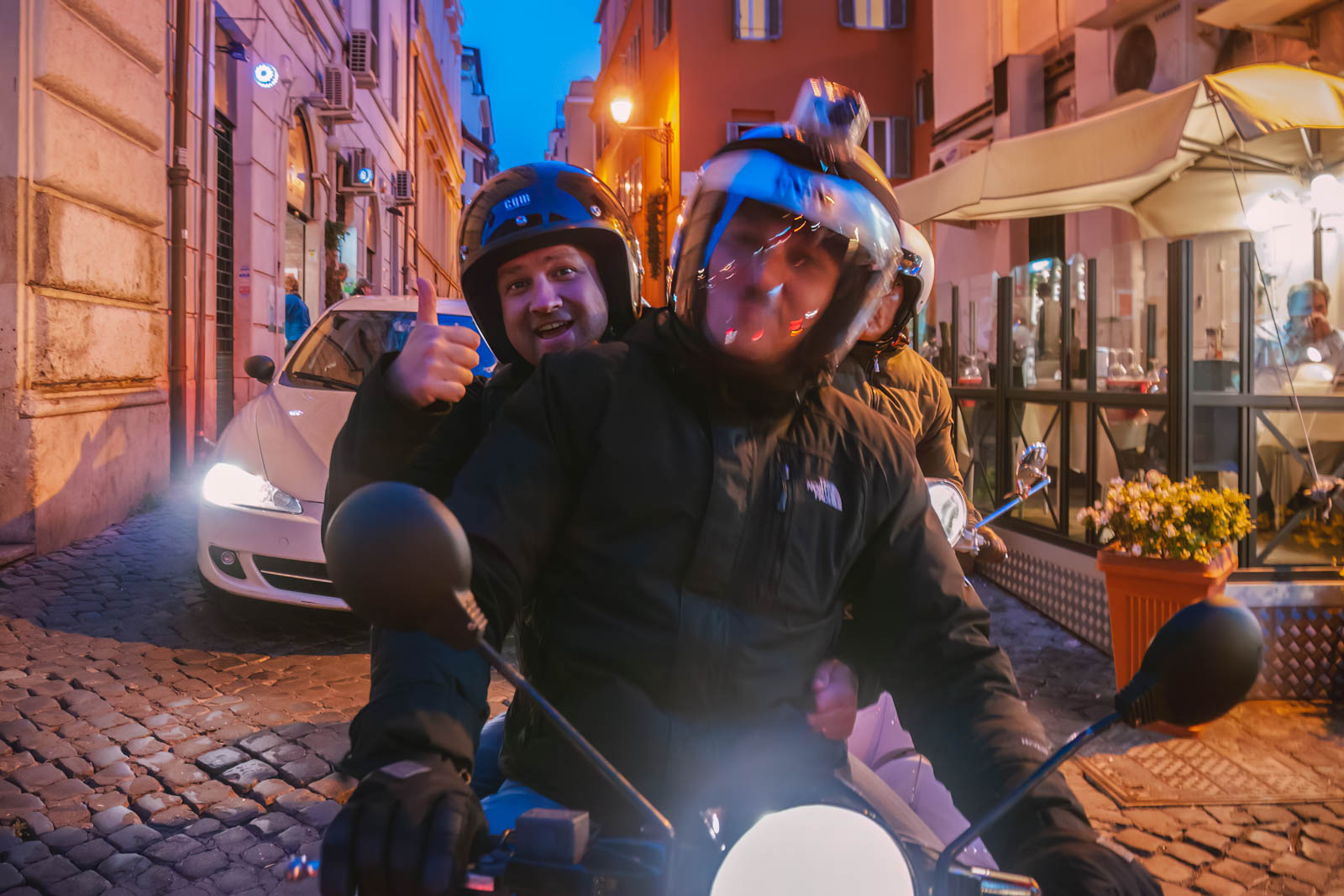
You can quickly get around Rome on foot with a bit of planning. This is a great way to soak up the city’s atmosphere, too – walking is how you find ‘pinch yourself’ corner street cafes with the best coffees and little squares you’d have never thought to visit.
For the sake of our 3 days in Rome itinerary, we’ve planned an itinerary that connects attractions within walking distance. The majority of Rome’s major attractions are accessible on foot. Of course, you need to know what order to see attractions in before you set off; otherwise, you end up walking large, unnecessary distances.
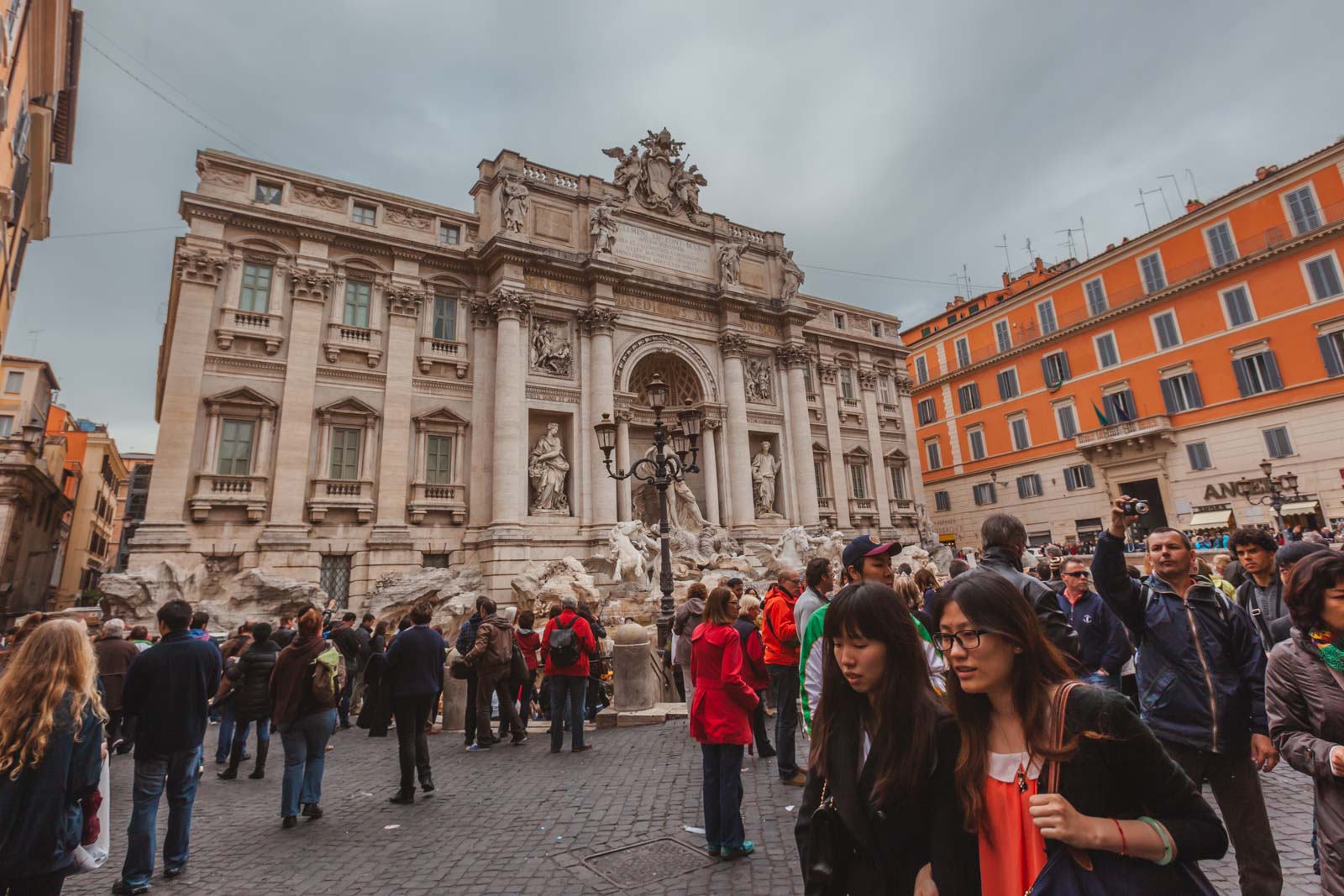
!f you need to hurry things up a bit, no problem. The Rome metro connects the city well, with metro stations dotted all over the city center and outer suburbs. Three metro lines run diagonally across the city: A, B, and C. While it is one of the smallest metro systems in a European city, the Rome metro does pass many tourist sights you couldn’t reach easily on foot. It is most convenient for tourists and commuters from outer Rome.
Does the metro not pass your planned destination? The bus is your next choice. Rome has over 350 different bus lines, including several night buses. There are four types of Rome buses to remember: Urban lines (U), night buses (N), express buses (X), and exact buses (E). Rome’s tram system is another good option, and Rome has six tram lines that run from 5:30 am until midnight every night. Of course, you will also find taxis if you get really stuck.
Luggage Storage
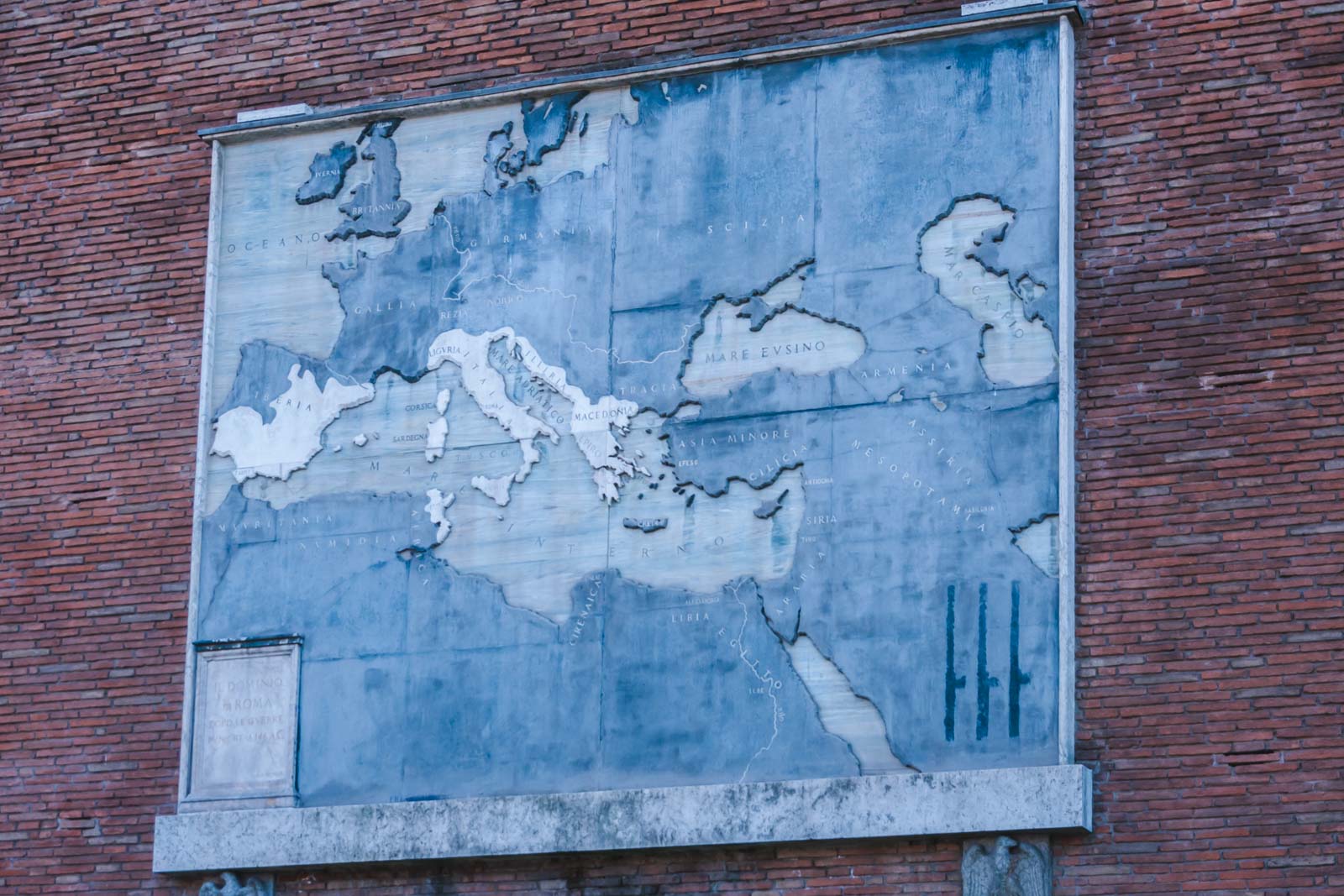
Most hotels will provide you with luggage storage after and before check-in. It is always worth checking with your hotel before seeking other luggage storage options. And since you’ll be walking around a lot in Rome, you don’t want to carry any unnecessary weight.
If your hotel isn’t an option, there are several luggage storage facilities around Rome. The most popular ones include Stow Your Bags, scattered throughout the city. You’ll find Stow Your Bags near the Vatican, Piazza di Spagna, and Roma Termini. This is useful, considering some attractions will only let you bring large bags inside. Just download offline maps in the Google Maps app to get directions without using data or wifi.
Prices range from $6 depending on how long you store luggage, and some storage spots let you keep bags there for multiple days.
How to get to Rome from the Airport
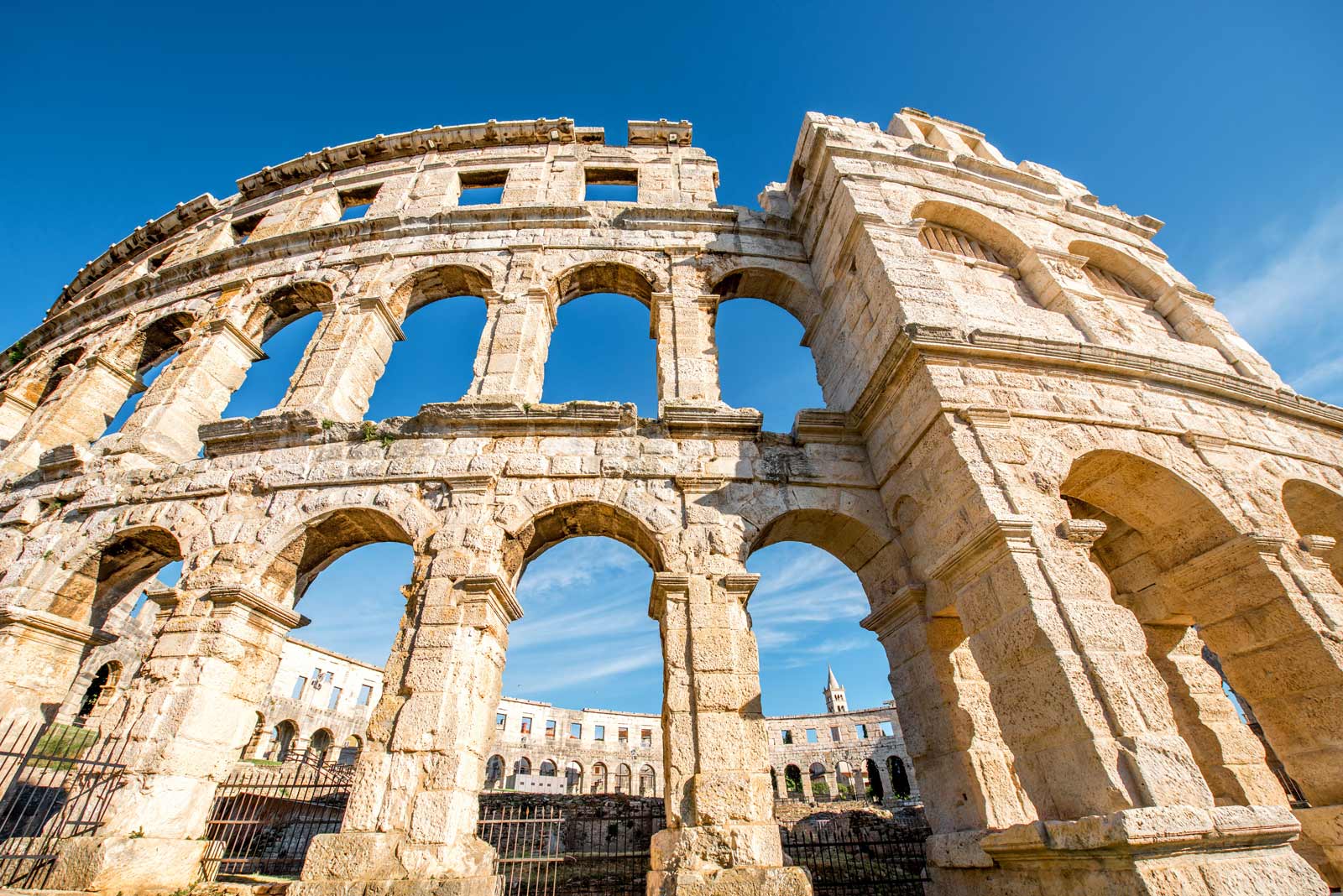
Getting from the airport to Rome’s city center might not be the most exciting part of your Rome itinerary, but it is an important part. Rome has two airports – Fiumicino Airport and Ciampino Airport.
Fiumicino Airport
Fiumicino Airport is nicknamed ‘Leonardo da Vinci Airport’ and is the most popular airport for international travelers. If you are flying with a well-established airline, you will fly into Fiumicino. The best way from Fiumicino Airport to Rome city center is on the Leonardo Express, a 32-minute train ride for just $19. This is ideal if you want the easiest, quickest option. Otherwise, you could get a bus transfer if you want to save some money, as a return bus transfer costs $13.80 and takes just 50 minutes – slightly longer. SIT BuShuttle and Terravision are the leading bus companies from Fiumicino Airport. Alternatively, you could book a private transfer which starts at around $80 USD.
Ciampino Airport
Ciampino Airport is primarily used for budget airlines. You’ll land at Ciampino Airport if you bag a flight deal. The only option (apart from a taxi) to get to Rome city center from Ciampino Airport is to book a bus transfer. You hop on the bus outside Ciampino Airport, and it takes you to the Termini Station in the center of Rome in 40 minutes. The bus costs $13.80 for a return trip and requires online booking in advance since it is really popular.
As far as taxis are concerned for both airports, you may find it easier to schedule a pick-up service in advance. Rome is notorious for taxi scams. Try to pay in advance where possible and always agree on a fare before entering a taxi. From Fiumicino Airport, taxis cost around $50 and take 40 minutes to central Rome. From Ciampino Airport, the taxi costs 25 minutes and costs just under $40 usually.
Where to stay in Rome for 3 days
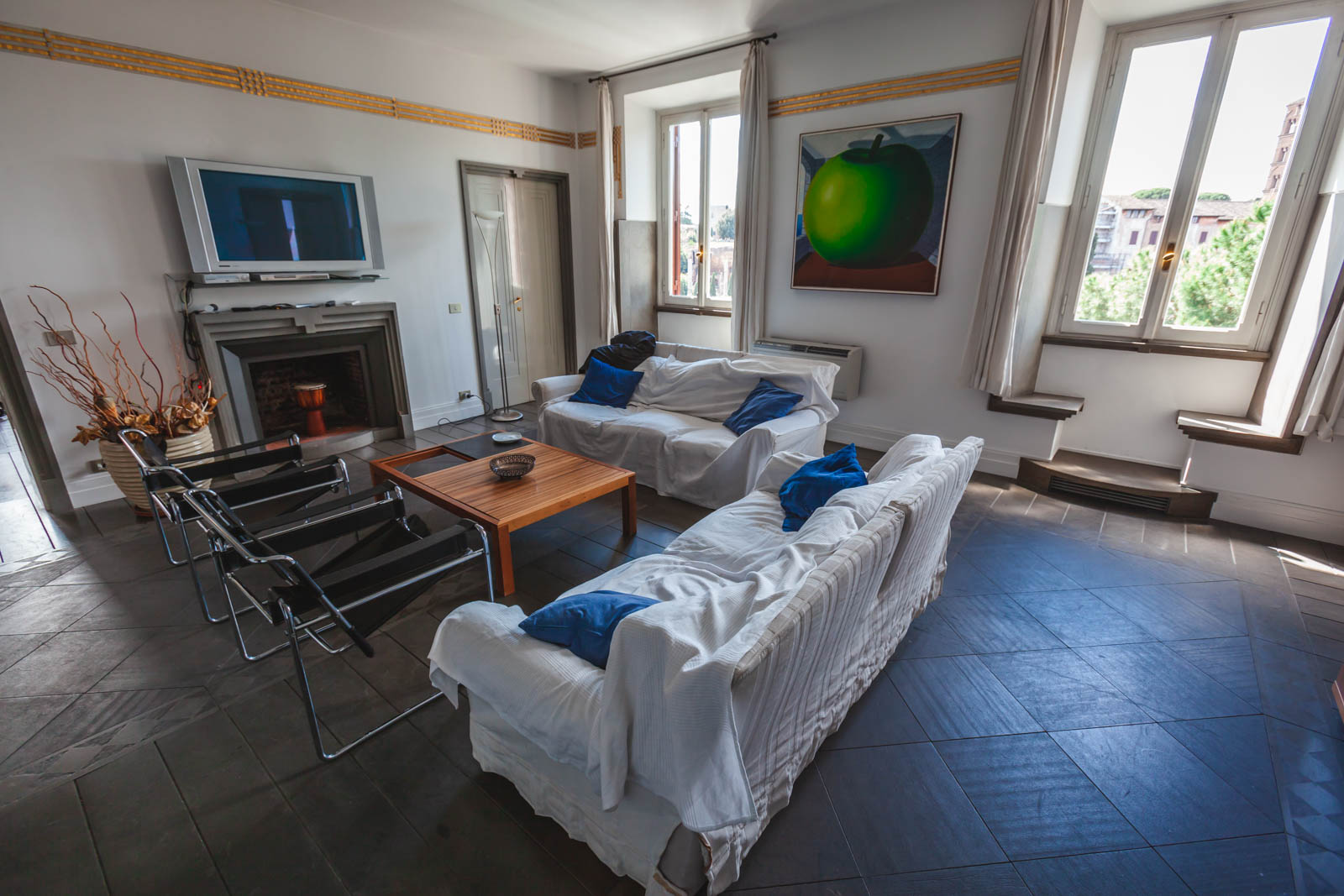
Rome has some fantastic hotels. The ‘eternal city’ has a lot of options. Do you want somewhere steps away from Piazza del Popolo or Palatine Hill and the Roman Forum, or just enjoy excellent facilities and a pool? You can check out our comprehensive guide on where to stay in Rome here. But for some quick suggestions, these are our top three.
Luxury: The St. Regis Rome
St. Regis Rome looks more like a palace than a hotel. To splash out on luxury accommodation in Rome, St. Regis Rome is your best option. This hotel has its own in-house spa and health club and was formally recognized as one of the world’s best hotels by Travel & Leisure. The luxe property even offers an afternoon tea experience and Murano glass chandeliers in several grand hallways.
The hotel is favored amongst honeymooners and celebrities, and its guest reviews are glowing reports of outstanding customer service and superb facilities. Right next to the Roma Termini, St. Regis Rome is as central as central can get, and you are within easy walking distance of most major attractions. Get rates and availability here.
Mid-Range: Nerva Boutique Hotel
Nerva Boutique Hotel is a gorgeous three-star hotel with tasteful, chic decor and a spacious collection of rooms and suites. For comfortable luxuries and a high-quality base for your stay in Rome, it is a haven priced for a mid-range budget. Each room features air conditioning, satellite TV, and elegant wooden furniture pieces. The rooms are decorated in bold, rich colors like navy with hip ornaments and furnishings. Guests get a continental breakfast and complimentary wifi. And, as a cherry on top, you are just minutes from the Colosseum and Roman Forum on Palatine Hill. Get rates and availability here.
Budget: Free Hostels Roma
Free Hostels Roma has dormitories and private rooms, offering the perfect accommodation for travelers on a budget. The hostel has female-only dormitories for female travelers wanting extra security as well. It has a complimentary breakfast and excellent communal facilities like a terrace and bar. Its location is dreamy too. The property is just 3 km from the Trevi Fountain, Roman Forum, and Colosseum. Check rates and availability here.
Where to eat in Rome
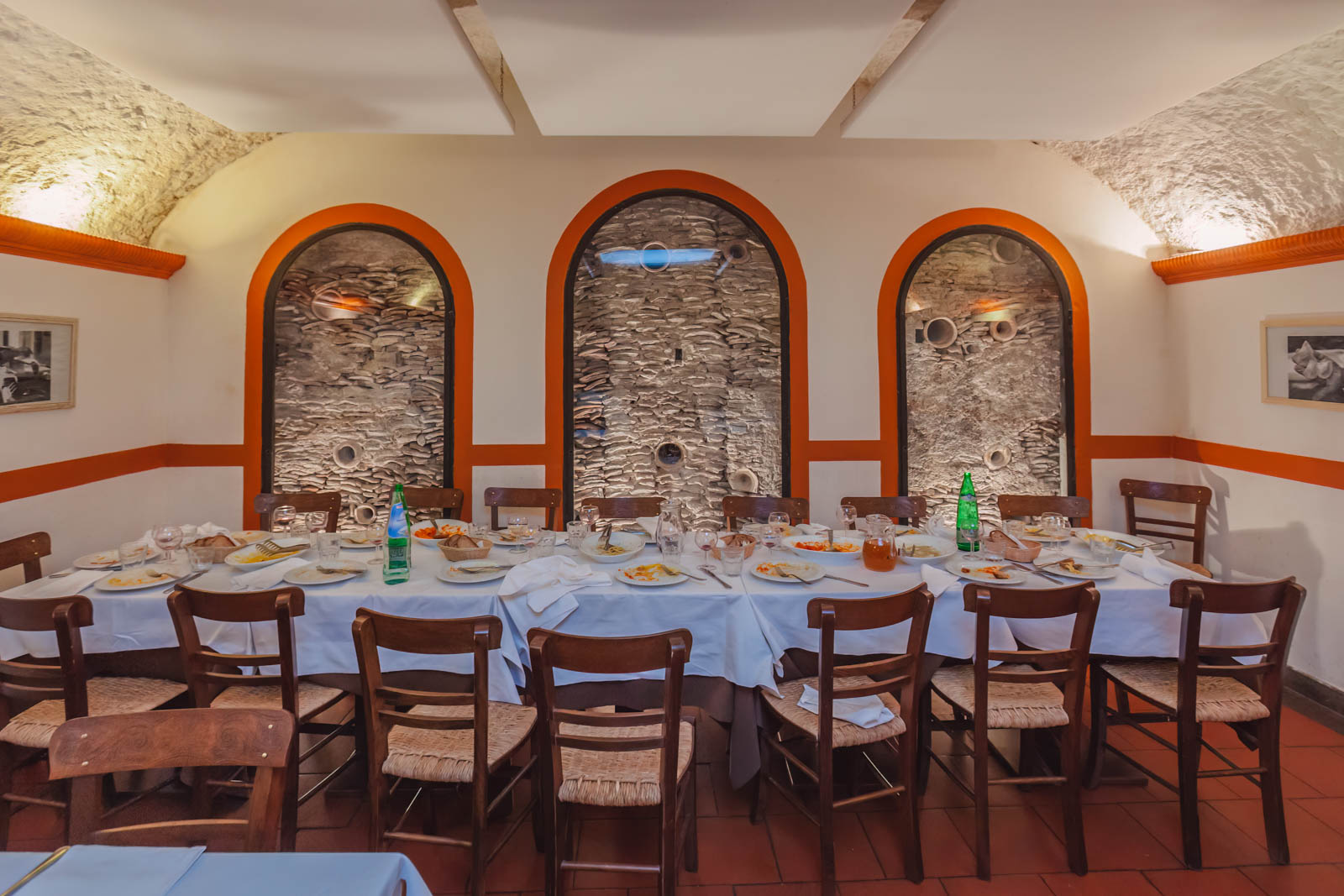
Where to eat in Rome is a serious question. Italian cuisine has a reputation that spans the entire globe. When visiting Italy, experiencing the culinary scene is an absolute must. We’ve already carved out special time for tasting Italian food in our 3 days in Rome itinerary. However, for evening meals and fancy lunches, there is still plenty of space to try different restaurants across the city.
From tiny corner street venues famed for traditional pasta to the ultimate dessert spot, these five places are the best places to eat in Rome.
Felice e Testaccio is a retro, traditional restaurant famed for its ‘cacio e pepe’ dish, spaghetti noodles smothered in cheese and black pepper. The noodles are brought to your table and tossed in front of you, performatively served onto your plate. Felice e Testaccio brings both food quality and a restaurant atmosphere with plenty of character.
Fassi Gelateria has been serving sweet treats since 1880 – even serving royalty on occasion. It has some of the most delicious gelatos in all of Rome. For a traditional experience, opt for the gelato sandwich.
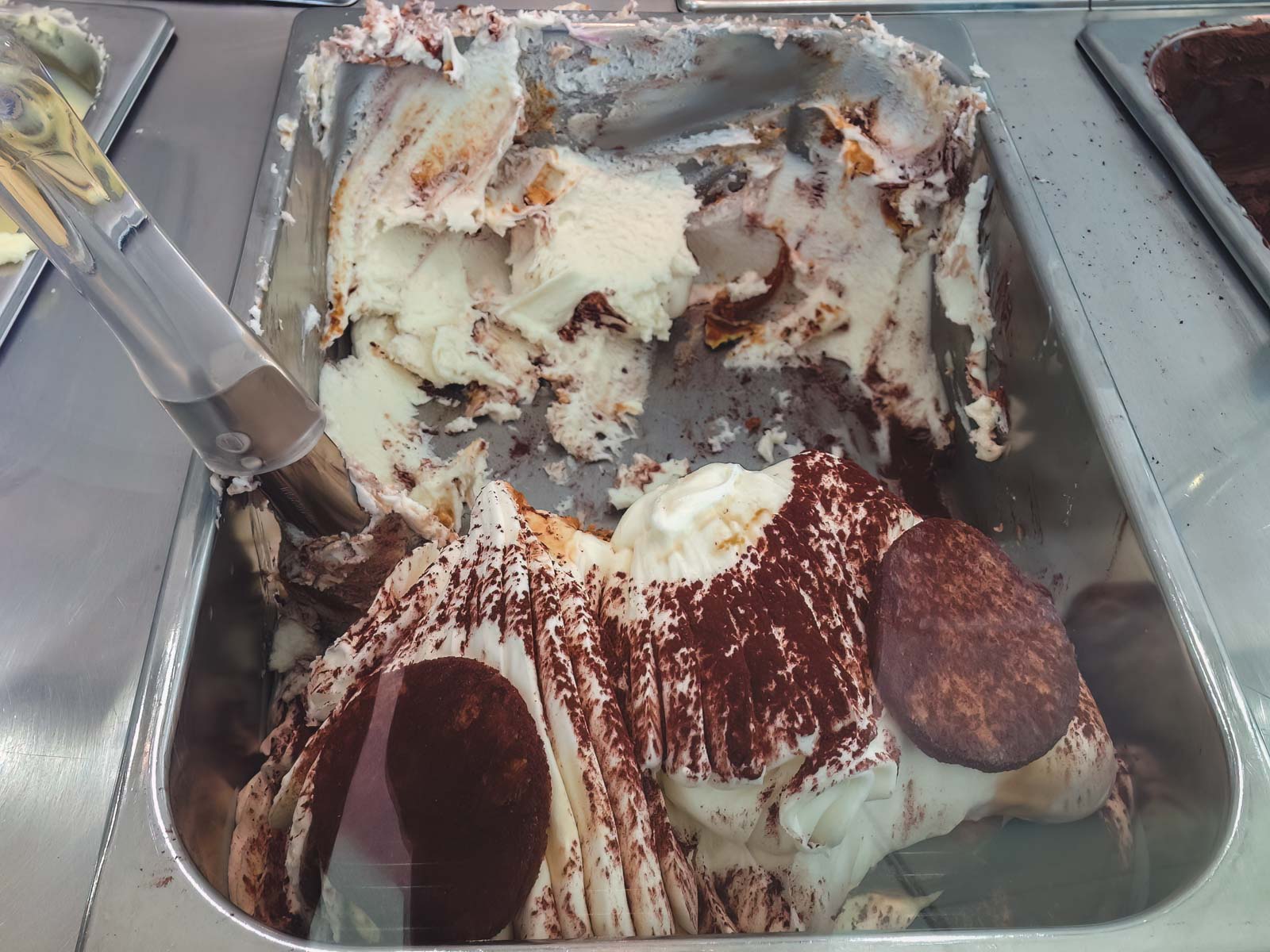
Moma is a Michelin-starred gem located directly in front of the US Embassy. To treat yourself to a Michelin-starred meal in the capital of Italy is certainly an experience, and you’ll find luxurious twists of all the beloved Italian classics.
Aroma is a Michelin-starred restaurant, as well, although this restaurant offers a bit of a twist. It is situated on the rooftop of the five-star hotel Palazzo Manfredi Hotel. It has stunning views of the Colosseum, which is close enough to touch. Aroma is a brilliant if slightly expensive, dining spot for an unobstructed view of Rome’s most famous landmark.
Why You Should Visit Rome
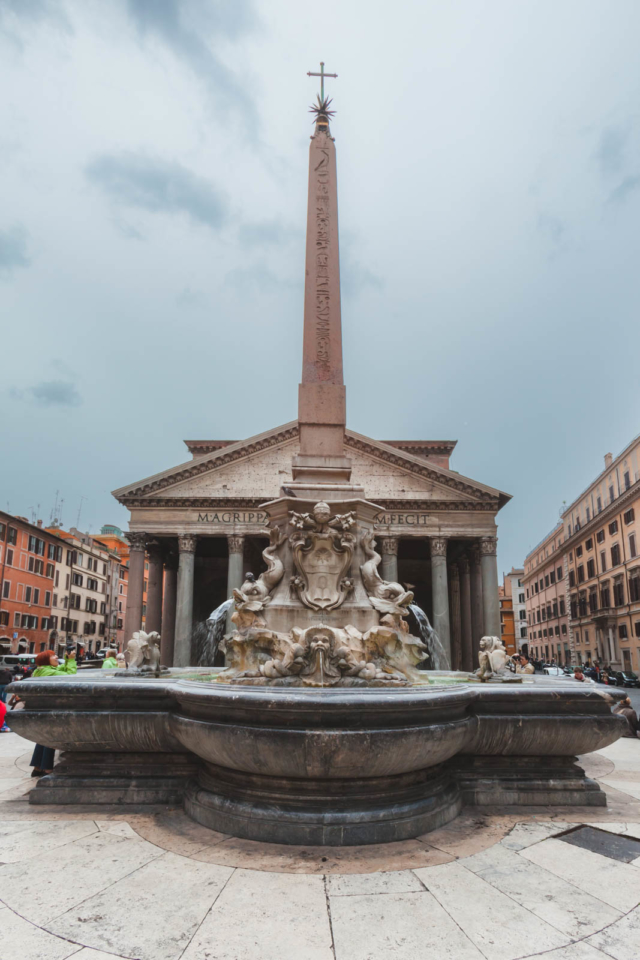
Visiting Rome is a guarantee to have a holiday of a lifetime. The city is full of interesting facts and attractions from years gone by, and this Rome itinerary will keep you well entertained. We hope that you enjoy this three days in Rome itinerary.
Of course, if you find some extra time to spend in Rome, you can easily adapt the three-day Rome itinerary. If you have 4 days in Rome, add a beach day to your itinerary. With four days, you’ll have enough time to venture out of central Rome and into the suburbs. You could head to the beach or choose another day trip – check our guide for off-the-beaten-track destinations outside Rome.

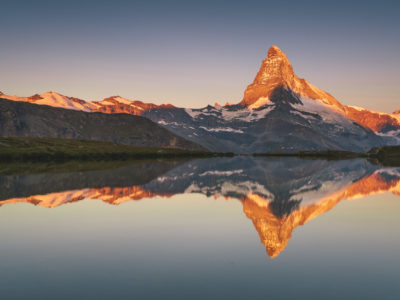

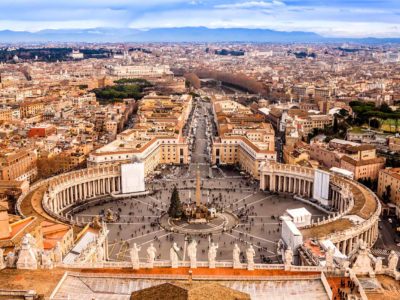
Hi everyone, I’m Karen Worrall, who wrote this 3 Day Guide to Rome. Thank you all very much for your kind comments. They are very much appreciated. I’m glad my guide was interesting and hopefully useful for you. I’ve written a Neighborhood guide and 22 Things to Do In Rome guide for The Planet D too on Rome as well as Neighborhood guides for London and Edinburgh, and my site Cruiseshipkaren.com has a lot of guides to many places around the world with cruise ports, as well as lots of video guides there and my YouTube channel too if you’d like to take a look. You can follow my adventures on my Facebook page and Instagram if you’d like to as well, all links are on this article and just under Cruise Ship Karen. I have several more articles I’m currently writing for The Planet D so keep an eye out for them coming up soon. Happy travels everyone 🙂
Wow what a perfect itinerary and the shot of the bridge is stunning. Many people always wonder whether they can go for a 3 days safari and still have the fun but this is great approval. no matter the destination, if you have a few days off your schedule to travel you can make it. Thanks Karen for sharing
If you have interest in history then you must visit Rome once in a life time. I am sure you will love that place.
First of all, thank you for this lovely article. Really Rome is a historical place and especially their architecture.
Perfect itinerary! Thank you for this very good itinerary of superb discoveries!
Nice trip and itinerary at Rome Italy !
I was just talking to someone recently about traveling and going to certain countries to get the ultimate traveler experience by expanding the mind. I never thought about traveling to Rome, Italy. Hopefully, I’ll be blessed in the future to make my rounds to a few places and possibly, just maybe, get a glimpse of this beautiful place. 🙂
This is exactly what I needed. We are planning our Summer vacation in Italy. Thank you for the details. Especially, love the money saving tips!
Wow! that the perfectly spent 3days in Rome…thanks for sharing your experience. Loved it.